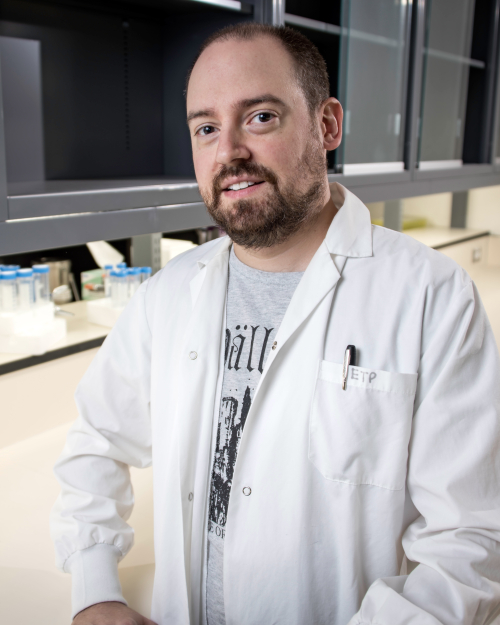
LEADERSHIP
![]()
 Dr. Thomas Durcan
Dr. Thomas Durcan
Director
"Open science goes beyond just being a concept. It means finding ways every day to work with others, to share our work, to hear about the work of others, and to ensure the research we do is of the highest standard to be reproduced anywhere else in the world. By opening ourselves up, it forces us to be better and to do better. For too long, scientists have been afraid to engage with the wider community and open science forces us to move outside of our comfort zone. Open science affords us this chance to get people to tune in and to engage with everyone working at the Neuro, so that by 2030 we will have finally turned the corner and have new therapies for so many of these brain disorders."
Connect with Dr. Durcan through his LinkedIn.
Read Dr. Durcan's biography
Originally from Dublin, Ireland, I have been at the Montreal Neurological Institute and Hospital (The Neuro) for over 15 years and this place has become like a second home to me. As an Associate Professor at The Neuro and McGill University (ResearchFest Platform Pitch), my research focus is on applying patient-derived stem cells towards the development of phenotypic discovery assays and 3D organoid models (Brains on a Dish: Revolutionizing Parkinson’s Disease research with brain organoids) for both neurodegenerative and neurodevelopmental disorders. As director of the Early Drug Discovery Unit (EDDU) at The Neuro, I oversee a team of over 30 research staff and students, committed to applying novel stem cell technology, combined with CRISPR genome editing, organoid models and new microfluidic technologies towards elucidating the underlying causes of these complex disorders. Combined with new approaches in the group towards building MultiOmics profiles on the patient-derived IPSC cells, the long-term strategy is to identify new personalized precision therapies that can be applied towards building clinical trials on a dish.
Selected publications
URL to list of published work (Durcan TM / Durcan T; 69 publications 2007-2023): https://pubmed.ncbi.nlm.nih.gov/?term=durcan+t&filter=years.2007-2023
- Lépine S, Nauleau-Javaudin A, Deneault E, Chen CX, Abdian N, Franco-Flores AK, Haghi G, Castellanos-Montiel MJ, Maussion G, Chaineau M, Durcan TM. Homozygous ALS-linked mutations in TARDBP/TDP-43 lead to hypoactivity and synaptic abnormalities in human iPSC-derived motor neurons. iScience. 2024 Feb 9;27(3):109166. doi: 10.1016/j.isci.2024.109166.
- Dorion MF, Yaqubi M, Senkevich K, Kieran NW, MacDonald A, Chen CXQ, Luo W, Wallis A, Shlaifer I, Hall JA, Dudley RWR, Glass IA; Birth Defects Research Laboratory; Stratton JA, Fon EA, Bartels T, Antel JP, Gan-Or Z, Durcan TM, Healy LM. MerTK is a mediator of alpha-synuclein fibril uptake by human microglia. Brain. 2024 Feb 1;147(2):427-443. doi: 10.1093/brain/awad298.
- Thiry L, Sirois J, Durcan TM, Stifani S. Generation of human iPSC-derived phrenic-like motor neurons to model respiratory motor neuron degeneration in ALS. Commun Biol. 2024 Feb 28;7(1):238. doi: 10.1038/s42003-024-05925-z.
- Piscopo VEC, Chapleau A, Blaszczyk GJ, Sirois J, You Z, Soubannier V, Chen CX, Bernard G, Antel JP, Durcan TM. The use of a SOX10 reporter toward ameliorating oligodendrocyte lineage differentiation from human induced pluripotent stem cells. Glia. 2024 Mar 18. doi: 10.1002/glia.24524.
- Dorion MF, Casas D, Shlaifer I, Yaqubi M, Fleming P, Karpilovsky N, Chen CX, Nicouleau M, Piscopo VEC, MacDougall EJ, Alluli A, Goldsmith TM, Schneider A, Dorion S, Aprahamian N, MacDonald A, Thomas RA, Dudley RWR, Hall JA, Fon EA, Antel JP, Stratton JA, Durcan TM, La Piana R, Healy LM. An adapted protocol to derive microglia from stem cells and its application in the study of CSF1R-related disorders. Mol Neurodegener. 2024 Apr 5;19(1):31. doi: 10.1186/s13024-024-00723-x.
Recent pre-prints
- Rhalena A. Thomas, Julien M. Sirois, Shuming Li, Alex Gestin, Valerio E. Piscopo, Paula Lépine, Meghna Mathur, Carol X.Q. Chen, Vincent Soubannier, Taylor M. Goldsmith, Lama Fawaz, Thomas M. Durcan, Edward A. Fon. CelltypeR: A framework to identify and characterize cell types in human midbrain organoids using flow cytometry. bioRxiv 2022.11.11.516066; doi: https://doi.org/10.1101/2022.11.11.516066.
- Armin Bayati, Riham Ayoubi, Cornelia E. Zorca, Adriana Aguila, Chanshuai Han, Emily Banks, Emmanuelle Nguyen-Renou, Wen Luo, Irina Shlaifer, Esther Del Cid-Pellitero, Moein Yaqubi, Edward A. Fon, Jo Anne Stratton, Thomas M. Durcan, Patrick Nahirney, Peter S. McPherson. A dual hit of α-synuclein internalization and immune challenge leads to formation and maintenance of Lewy body-like inclusions in human dopaminergic neurons. bioRxiv 2023.05.29.542776; doi: https://doi.org/10.1101/2023.05.29.542776
- C. Sahara Khademullah, Julien Bourbonnais, Mathilde M. Chaineau, María José Castellanos-Montiel, Iason Keramidis, Alexandra Legault, Marie-Ève Paquet, Agessandro Abrahao, Lorne Zinman, Janice Robertson, Thomas M. Durcan, Melanie A. Woodin, Antoine G. Godin, Yves De Koninck. KCC2 as a novel biomarker and therapeutic target for motoneuron degenerative disease. bioRxiv 2023.08.24.554410; doi: https://doi.org/10.1101/2023.08.24.554410
- B. Vanderperre, A. Muraleedharan, M.-F. Dorion, F. Larroquette, E. Del Cid Pellitero, N. Rajakulendran, C. X.-Q. Chen, R. Larivière, C. Michaud-Tardif, R. Chidiac, D. Lipuma, G. MacLeod, R. Thomas, Z. Wang, W.E. Reintsch, W. Luo, I. Shlaifer, Z. Fuming, K. Xia, L Yan., Z. Steinhart, R.J. Linhardt, J.-F. Trempe, J. Liu, T.M. Durcan, S. Angers, E.A. Fon. A genome-wide CRISPR/Cas9 screen identifies genes that regulate the cellular uptake of α-synuclein fibrils by modulating heparan sulfate proteoglycans. bioRxiv 2023.09.29.560170; doi: https://doi.org/10.1101/2023.09.29.560170
- Vincent Soubannier, Mathilde Chaineau, Lale Gursu, Sarah Lepine, David Kalaydjian, Ghazal Haghi, Guy Rouleau, Thomas Durcan, Stefano Stifani. Early nuclear phenotypes and reactive transformation in human iPSC-derived astrocytes from ALS patients with SOD1 mutations. bioRxiv 2023.10.05.561079; doi: https://doi.org/10.1101/2023.10.05.561079
- Jace Jones-Tabah, Kathy He, Konstantin Senkevich, Nathan Karpilovsky, Ghislaine Deyab, Yuting Cousineau, Daria Nikanorova, Taylor Goldsmith, Esther del Cid Pellitero, Carol X-Q. Chen, Wen Luo, Zhipeng You, Narges Abdian, Isabella Pietrantonio, Thomas Goiran, Jamil Ahmad, Jennifer A. Ruskey, Farnaz Asayesh, Dan Spiegelman, Cheryl Waters, Oury Monchi, Yves Dauvilliers, Nicolas Dupré, Irina Miliukhina, Alla Timofeeva, Anton Emelyanov, Sofya Pchelina, Lior Greenbaum, Sharon Hassin-Baer, Roy N. Alcalay, Austen Milnerwood, Thomas M. Durcan, Ziv Gan-Or, Edward A. Fon. The Parkinson’s disease risk gene cathepsin B promotes fibrillar alpha-synuclein clearance, lysosomal function and glucocerebrosidase activity in dopaminergic neurons. bioRxiv 2023.11.11.566693; doi: https://doi.org/10.1101/2023.11.11.566693
- Rhalena A Thomas, Eddie Cai, Wolfgang Reintsch, Chanshuai Han, Sneha Shinde, Roxanne Lariviere, Andrea Krahn, Carol X.Q. Chen, Emmanuelle Nguyen-Renou, Eric Deneault, Zhipeng You, Thomas M Durcan, Edward A. Fon. A deep learning convolutional neural network distinguishes neuronal models of Parkinson's disease from matched controls. bioRxiv 2023.11.23.568499; doi: https://doi.org/10.1101/2023.11.23.568499
- Sarah Lépine, Gilles Maussion, Alexandria Schneider, Angela Nauleau-Javaudin, María José Castellanos-Montiel, Georgina Jiménez Ambriz, Dan Spiegelman, Narges Abdian, Anna Krystina Franco-Flores, Ghazal Haghi, Lale Gursu, Mathilde Chaineau, Thomas Durcan. Transcriptome-based screening in TARDBP/TDP-43 knock-in motor neurons identifies the NEDD8-activating enzyme inhibitor MLN4924. bioRxiv 2024.01.30.578100; doi:https://doi.org/10.1101/2024.01.30.578100
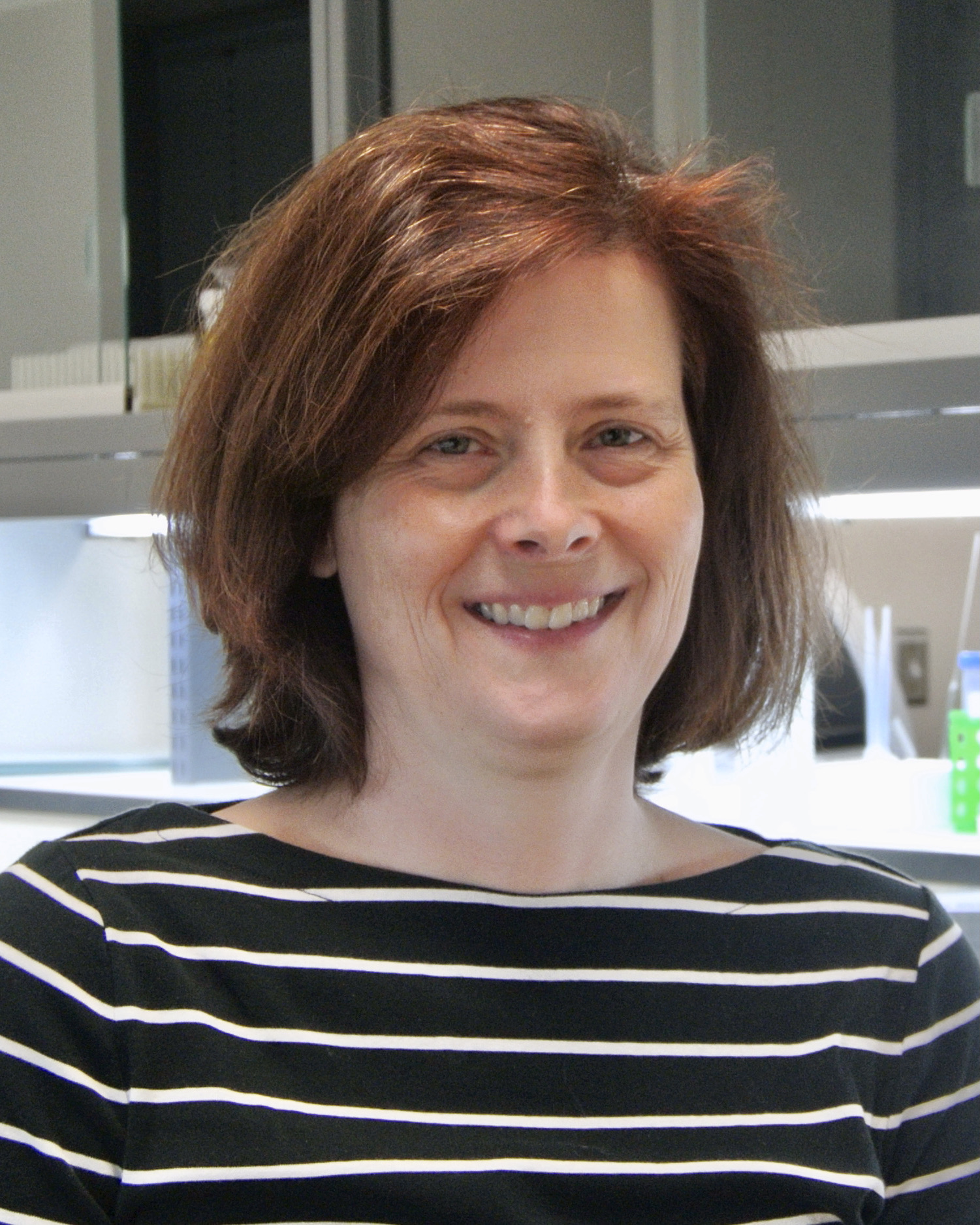 genevieve.dorval [at] mcgill.ca (Genevieve Dorval)
genevieve.dorval [at] mcgill.ca (Genevieve Dorval)
Associate director/Operations Manager
"The Neuro offers a challenging and exciting environment where smart, positive and open-minded people all work together for the advancement of science."
"Le Neuro est un institut connu des Montréalais pour son prestige. En tant qu’employée, j’y trouve également un endroit où les gens partagent des valeurs d’entraide et d’intégrité. L’avancement de la science s’y fait dans un environnent positif et ouvert d’esprit."
Read Genevieve's biography
I started working at the Neuro in April 2000 after finishing my Masters degree in Montreal. I worked as a research assistant in a cell signalling lab directed by Dr. Phil Barker. My duties included molecular biology work like cloning and virus purification but also lab management. In early 2016, I joined Dr. Durcan’s team where I had the opportunity to become familiar with iPSC culture and CRISPR genome editing. I am now operations manager making sure all scientists in our group can run their experiments efficiently.
Selected publications
- Unsain N, Dorval G, Sheen JH, Barker PA. Generation and characterization of mice bearing null alleles of nradd/Nrh2. Genesis. 2016 Dec;54(12):605-612. doi: 10.1002/dvg.22989. Epub 2016 Nov 12.
- McLelland GL, Goiran T, Yi W, Dorval G, Chen CX, Lauinger ND, Krahn AI, Valimehr S, Rakovic A, Rouiller I, Durcan TM, Trempe JF, Fon EA. Mfn2 ubiquitination by PINK1/parkin gates the p97-dependent release of ER from mitochondria to drive mitophagy. Elife. 2018 Apr 20;7. pii: e32866. doi: 10.7554/eLife.32866.
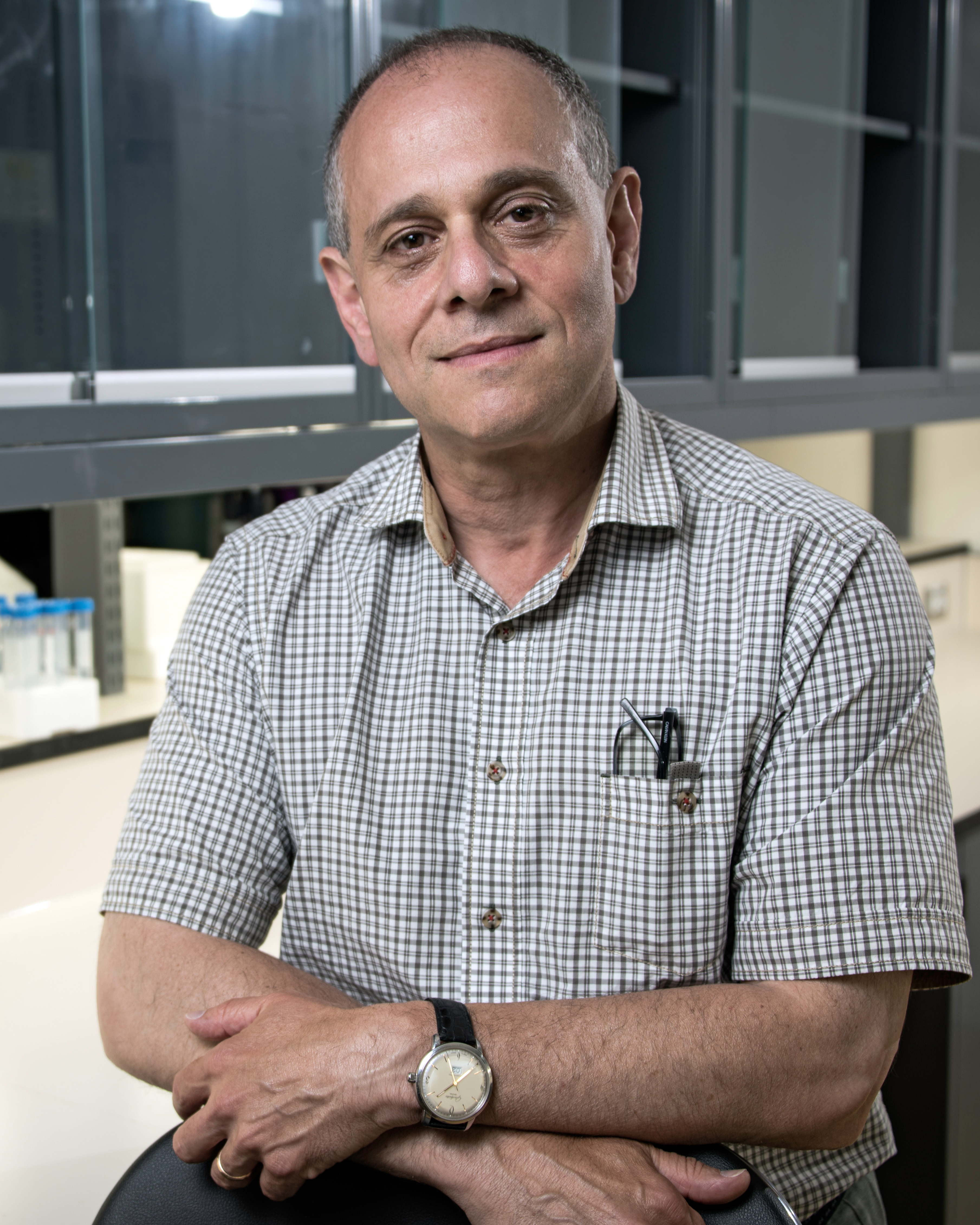 Dr. Edward Fon
Dr. Edward Fon
Scientific Advisor
"I have the good fortune of being able to work both as a clinician and a scientist. I am reminded on a daily basis of the affliction of patients with Parkinson's disease. In my lab, we are striving to find out how the disease develops on a cellular and molecular level."
Learn more about The Fon Lab.
Dr. Fon's research focuses on the molecular events leading to the degeneration of dopamine neurons in Parkinson's disease. He is particularly interested in α-synuclein, parkin, and PINK1, all genes known to cause familial forms of the disease.
Read Dr. Fon's biography
Dr. Edward Fon, MD, FRCP(C) is a neurologist and scientist at the Montreal Neurological Institute and Hospital (The Neuro). He is a Professor at McGill University, a Canada Research Chair (Tier 1) in Parkinson’s Disease, and Director of the McGill Parkinson Program, a national Parkinson Foundation Centre of Excellence. His research focuses on the molecular events leading to the neuronal degeneration in Parkinson's disease (PD). In the past decade, a number of genes have been identified that cause familial forms of the disease. He is particularly interested in how these genes come together and interact to cause PD. Dr. Fon’s work in this area could provide important clues about the mechanisms of neuronal death in Parkinson’s disease and potentially lead to innovative new therapeutic strategies. Dr. Fon is currently the Director of the FRQS - Quebec Parkinson’s Network (QPN) and Co-Director of the Parkinson Canada/Brain Canada – Canadian Open Parkinson Network (C-OPN). He has received several awards during the course of his career such as CIHR Clinician-Scientist, FRQS National Scholar and FRSQ Chercheur-Boursier (Senior) awards and the Prix de Jeune Chercheur Blaise Pascal. Dr. Fon’s research is supported by the CIHR (Foundation grant), CQDM, Brain Canada, Parkinson Canada, CCNA and the Michael J. Fox Foundation.
Selected publications
- Chen, C. X., You, Z., Abdian, N., Sirois, J., Shlaifer, I., Tabatabaei, M., Boivin, M. N., Gaborieau, L., Karamchandani, J., Beitel, L. K., Fon, E. A., Durcan, T. M. (2022). Generation of homozygous PRKN, PINK1 and double PINK1/PRKN knockout cell lines from healthy induced pluripotent stem cells using CRISPR/Cas9 editing. Stem cell research, 62, 102806. Advance online publication. https://doi.org/10.1016/j.scr.2022.102806
- Dong, J., Duchesne, A., Bayne, A. N., Mohamed, N. V., Yi, W., Mathur, M., Chen, C., You, Z., Abdian, N., Taylor, L., Fon, E. A., Durcan, T. M., & Trempe, J. F. (2022). An approach to measuring protein turnover in human induced pluripotent stem cell organoids by mass spectrometry. Methods (San Diego, Calif.), S1046-2023(22)00078-0. Advance online publication. https://doi.org/10.1016/j.ymeth.2022.03.011
- Hettige, N. C., Peng, H., Wu, H., Zhang, X., Yerko, V., Zhang, Y., Jefri, M., Soubannier, V., Maussion, G., Alsuwaidi, S., Ni, A., Rocha, C., Krishnan, J., McCarty, V., Antonyan, L., Schuppert, A., Turecki, G., Fon, E. A., Durcan, T. M., & Ernst, C. (2022). Foxg1 dose tunes cell proliferation dynamics in human forebrain progenitor cells. Stem Cell Reports. https://doi.org/10.1016/j.stemcr.2022.01.010
- Rasool, S., Veyron, S., Soya, N., Eldeeb, M. A., Lukacs, G. L., Fon, E. A., & Trempe, J. F. (2022). Mechanism of PINK1 activation by autophosphorylation and insights into assembly on the TOM complex. Molecular cell, 82(1), 44–59.e6. https://doi.org/10.1016/j.molcel.2021.11.012
- Kwan, C., Kang, M. S., Nuara, S. G., Gourdon, J. C., Bédard, D., Tardif, C. L., Hopewell, R., Ross, K., Bdair, H., Hamadjida, A., Massarweh, G., Soucy, J. P., Luo, W., Del Cid Pellitero, E., Shlaifer, I., Durcan, T. M., Fon, E. A., Rosa-Neto, P., Frey, S., & Huot, P. (2022). Co-registration of Imaging Modalities (MRI, CT and PET) to Perform Frameless Stereotaxic Robotic Injections in the Common Marmoset. Neuroscience, 480, 143–154. https://doi.org/10.1016/j.neuroscience.2021.11.009
- Vranas, M., Lu, Y., Rasool, S., Croteau, N., Krett, J. D., Sauvé, V., Gehring, K., Fon, E. A., Durcan, T. M., & Trempe, J. F. (2022). Selective localization of Mfn2 near PINK1 enables its preferential ubiquitination by Parkin on mitochondria. Open biology, 12(1), 210255. https://doi.org/10.1098/rsob.210255
- Tavassoly, O., Del Cid Pellitero, E., Larroquette, F., Cai, E., Thomas, R. A., Soubannier, V., Luo, W., Durcan, T. M., & Fon, E. A. (2021). Pharmacological Inhibition of Brain EGFR Activation By a BBB-penetrating Inhibitor, AZD3759, Attenuates α-synuclein Pathology in a Mouse Model of α-Synuclein Propagation. Neurotherapeutics : the journal of the American Society for Experimental NeuroTherapeutics, 10.1007/s13311-021-01017-6. Advance online publication. https://doi.org/10.1007/s13311-021-01017-6
- Eldeeb, M. A., Bayne, A. N., Trempe, J. F., & Fon, E. A. (2020). Fine-Tuning TOM-Mitochondrial Import via Ubiquitin. Trends in cell biology, 30(6), 425–427. https://doi.org/10.1016/j.tcb.2020.04.007
- Roberts, R. F., Bayne, A. N., Goiran, T., Lévesque, D., Boisvert, F. M., Trempe, J. F., & Fon, E. A. (2021). Proteomic Profiling of Mitochondrial-Derived Vesicles in Brain Reveals Enrichment of Respiratory Complex Sub-assemblies and Small TIM Chaperones. Journal of proteome research, 20(1), 506–517. https://doi.org/10.1021/acs.jproteome.0c00506
- Gan-Or, Z., Rao, T., Leveille, E., Degroot, C., Chouinard, S., Cicchetti, F., Dagher, A., Das, S., Desautels, A., Drouin-Ouellet, J., Durcan, T., Gagnon, J. F., Genge, A., Karamchandani, J., Lafontaine, A. L., Sun, S., Langlois, M., Levesque, M., Melmed, C., Panisset, M., … Fon, E. A. (2020). The Quebec Parkinson Network: A Researcher-Patient Matching Platform and Multimodal Biorepository. Journal of Parkinson's disease, 10(1), 301–313. https://doi.org/10.3233/JPD-191775
 Carl Ernst
Carl Ernst
Scientific Advisor - IPSCs and Neurodevelopmental disorders
Carl Ernst is an expert in stem cell biology and genetic engineering and heads the Rare Neurodevelopmental Disorders Laboratory (RNDL) at The Neuro.
Read Carl Ernst's biography
Professor Ernst started his professional career working as a one-on-one personal care worker with children with disabilities in schools. Working with kids and connecting with families continue to inspire his current work with the Rare Neurodevelopmental Disorders Lab at McGill. The RNDL is committed to engaging with families, modeling disease, identifying cellular phenotypes, selecting molecules for potential therapeutic uses, and advancing molecules to phase 1 clinical trials. His group has significant expertise in making brain cells and genetically engineering cells to better understand rare disease. Carl Ernst is committed to providing an excellent training environment for trainees, including undergraduate and graduate students. He is a past winner of the Graduate Teaching Award of Excellence in the Department of Human Genetics. He has completed a 10-year award as a Canada Research Chair and is a current Senior Scholar awardee of the Fonds de Recherche de Quebec. Professor Ernst speaks French and English.
Selected publications
- Kabuki syndrome stem cell models reveal locus specificity of histone methyltransferase 2D (KMT2D/MLL4). Jefri M, Zhang X, Stumpf PS, Zhang L, Peng H, Hettige N, Theroux JF, Aouabed Z, Wilson K, Deshmukh S, Antonyan L, Ni A, Alsuwaidi S, Zhang Y, Jabado N, Garcia BA, Schuppert A, Bjornsson HT, Ernst C. Hum Mol Genet. 2022 May 28
- FOXG1 dose tunes cell proliferation dynamics in human forebrain progenitor cells. Hettige NC, Peng H, Wu H, Zhang X, Yerko V, Zhang Y, Jefri M, Soubannier V, Maussion G, Alsuwaidi S, Ni A, Rocha C, Krishnan J, McCarty V, Antonyan L, Schuppert A, Turecki G, Fon EA, Durcan TM, Ernst C. Stem Cell Reports. 2022, March 8
- Epigenetic priming in neurodevelopmental disorders. Ernst C, Jefri M. Trends Mol Med. 2021 Oct 21:S1471-4914(21)00253-7. doi: 10.1016/j.molmed.2021.09.005.
- Lesch-Nyhan disease causes impaired energy metabolism and reduced developmental potential in midbrain dopaminergic cells. Bell S, McCarty V, Peng H, Jefri M, Hettige N, Antonyan L, Crapper L, O'Leary LA, Zhang X, Zhang Y, Wu H, Sutcliffe D, Kolobova I, Rosenberger TA, Moquin L, Gratton A, Popic J, Gantois I, Stumpf PS, Schuppert AA, Mechawar N, Sonenberg N, Tremblay ML, Jinnah HA, Ernst C. Stem Cell Reports. 2021 Jul 13;16(7):1749-1762.
- Mutations in ACTL6B cause neurodevelopmental deficits and epilepsy and and lead to loss of dendrites in human neurons. Bell S, Rousseau J, Peng H, Aouabed Z, Priam P, Theroux JF, Jefri M, Tanti A, Wu H, Kolobova I, Silviera H, Manzano-Vargas K, Ehresmann S, Hamdan FF, Hettige N, Zhang X, Antonyan L, Nassif C, Ghaloul-Gonzalez L, Sebastian J, Vockley J, Begtrup AG, Wentzensen IM, Crunk A, Nicholls RD, Herman KC, Deignan JL, Al-Hertani W, Efthymiou S, Salpietro V, Miyake N, Makita Y, Matsumoto N, Østern R, Houge G, Hafström M, Fassi E, Houlden H, Klein Wassink-Ruiter JS, Nelson D, Goldstein A, Dabir T, van Gils J, Bourgeron T, Delorme R, Cooper GM, Martinez JE, Finnila CR, Carmant L, Lortie A, Oegema R, van Gassen K, Mehta SG, Huhle D, Abou Jamra R, Martin S, Brunner HG, Lindhout D, Au M, Graham JM Jr, Coubes C, Turecki G, Gravel S, Mechawar N, Rossignol E, Michaud JL, Lessard J, Ernst C*, Campeau PM*. Am J Hum Genet. May 2019
- Disruption of GRIN2B Impairs Differentiation in Human Neurons. Scott Bell, Gilles Maussion, Malvin Jefri, Huashan Peng, Jean-Francois Theroux, Heika Silveira, Vincent Soubannier, Hanrong Wu, Peng Hu, Ekaterina Galat, S. Gabriela Torres-Platas, Camille Boudreau-Pinsonneault, Liam A. O'Leary, Vasiliy Galat, Gustavo Turecki, Thomas M. Durcan, Edward A. Fon, Naguib Mechawar, Carl Ernst. Stem Cell Reports,2018 Jul 10;11(1):183-196 (Cover)
- Proliferation and differentiation deficits in neural stem cells are a major convergence point for neurodevelopmental disorders. Ernst C. Trends in Neurosciences. 2016 May;39(5):290-9
- Molecular Convergence of Neurodevelopmental Disorders. Chen ES, Gigek CO, Rosenfeld JA, Diallo AB, Maussion G, Chen GG, Vaillancourt K, Lopez JP, Crapper L, Poujol R, Shaffer LG, Bourque G, Ernst C. American Journal of Human Genetics, 2014 Nov 6;95(5):490-508
- Ernst C, Marshall CR, Shen Y, Metcalfe K, Rosenfeld J, Hodge JC, Torres A, Blumenthal I, Chiang C, Pillalamarri V, Crapper L, Diallo AB, Ruderfer D, Pereira S, Sklar P, Purcell S, Wildin RS, Spencer AC, Quade BF, Harris DJ, Lemyre E, Wu BL, Stavropoulos DJ, Geraghty MT, Shaffer LG, Morton CC, Scherer SW, Gusella JF, Talkowski ME. Highly Penetrant Alterations of a Critical Region Including BDNF in Human Psychopathology and Obesity. JAMA Psychiatry. 2012 Oct 8:1-9.
 Ziv Gan-Or
Ziv Gan-Or
Scientific Advisor - Parkinson's disease and Neurogenetics
Dr. Ziv Gan-Or is an Associate Professor at The Neuro, where he serves as the Co-Director of the Clinical Research Unit and the Leader of the Neurodegenerative Disorders Research Group.
Read Dr. Ziv Gan-Or's biography
Dr. Gan-Or completed his MD and PhD at Tel-Aviv University, with a major interest in lysosomal related genes and their role in the pathogenesis and progression of Parkinson’s Disease and other neurodegenerative disorders. In his lab at the Neuro, the Neurogenomics and Precision Medicine lab, Dr. Gan-Or and his team use advanced multi-omic approaches to study the effects of genetics on risk, progression and response to medications in neurodegenerative disorders. Dr. Gan-Or’s lab has a special interest in the genetics of REM sleep behavior disorder (RBD), and is leading the International RBD Genomics Consortium, with the world’s largest cohort of RBD patients. Individuals who suffer from RBD will most likely develop a neurodegenerative disease in the future: either Parkinson’s Disease, dementia with Lewy bodies or multiple system atrophy. By identifying the genetic background of RBD and by understanding how this genetic background affects the conversion from RBD to one of these neurodegenerative disorders, Dr. Gan-Or’s research aims to identify novel pathways and mechanisms that may help developing treatments.
Selected publications
- Farazi Fard MA, Rebelo AP, Buglo B, Nemati H, Dastsooz H, Gehweiler I, Reich S, Reichbauer J, Quintáns B, Ordóñez-Ugalde A, Cortese A, Courel S, Abreu L, Powell E, Danzi M, Martuscelli NB, Bis-Brewer DM, Tao F, Zarei F, Habibzadeh P, Yavarian M, Modarresi F, Silawi M, Tabatabaei Z, Yousefi M, Farpour HR, Kessler C, Mangold E, Kobeleva X, Mueller AJ, Haack TB, Tarnopolsky M, Gan-Or Z, Rouleau GA, Synofzik M, Sobrido MJ, Jordanova A, Schüle R, Zuchner S and Faghihi MA. Truncating Mutations in UBAP1 Cause Hereditary Spastic Paraplegia. American Journal of Human Genetics. 2019. 4;104(4):767-773. PubMed
- Schormair B, Zhao C, Bell S, Tilch E, Salminen AV, Pütz B, Dauvilliers Y, Stefani A, Högl B, Poewe W, Kemlink D, Sonka K, Bachmann CG, Paulus W, Trenkwalder C, Oertel WH, Hornyak M, Teder-Laving M, Metspalu A, Hadjigeorgiou GM, Polo O, Fietze I, Ross OA Wszolek Z, Butterworth AS, Soranzo N, Ouwehand WH, Roberts DJ, Danesh J, Allen RP, Earley CJ, Ondo WG, Xiong L, Montplaisir J, Gan-Or Z, Perola M, Vodicka P, Dina C, Franke A, Tittmann L, Stewart AF, Shah SH, Gieger C, Peters A, Rouleau GA, Berger K, Oexle K, Di Angelantonio E, Hinds DA, Müller-Myhsok B and Winkelmann J. Identification of novel risk loci for restless legs syndrome in genome-wide association studies in individuals of European ancestry: a meta-analysis. Lancet Neurology. 2017;16 898-907. PubMed
- Gan-Or Z, Bouslam N, Birouk N, Lissouba A, Chambers DB, Vérièpe J, Androschuck A, Laurent SB, Rochefort D, Spiegelman D, Dionne-Laporte A, Szuto A, Liao M, Figlewicz DA, Bouhouche A, Benomar A, Yahyaoui M, Ouazzani R, Yoon G, Dupré N, Suchowersky O, Bolduc F, Parker JA, Dion PA, Drapeau P, Rouleau GA, Ouled Amar Bencheikh B. Mutations in CAPN1 cause autosomal recessive Hereditary Spastic Paraplegia. American Journal of Human Genetics. 2016;98(5):1038-1046. PubMed
- Gan-Or Z, Ozelius LJ, Bar-Shira A, Saunders-Pullman R, Mirelman A, Kornreich R, Gana-Weisz M, Raymond D, Rozenkrantz L, Deik A, Gurevich T, Gross SJ, Schreiber-Agus N, Giladi N, Bressman SB, and Orr-Urtreger A. The p.L302P mutation in the lysosomal enzyme gene SMPD1 is a risk factor for Parkinson disease. Neurology 2013;80(17):1606-1610. PubMed
- Gan-Or Z, Bar-Shira A, Dahary D, Mirelman A, Kedmi M, Gurevich T, Giladi N, Orr-Urtreger A. Sequence alterations in the putative promoter of RAB7L1 are associated with a reduced Parkinson disease risk. JAMA Neurology, 2012;69(1):105-10. PubMed
- Sidransky E, Aharon-Peretz J, Annesi G, Barbosa ER, Bar-Shira A, Berg D, Bras J, Brice A, Chen C-M, Clark LN, Condroyer C, De Marco VE, Dürr A, Eblan MJ, Fahn S, Farrer M, Fung H-C, Gan-Or Z, Gasser T, Gershoni R, Giladi N, Griffith A, Gurevich T, Januario C, Kropp P, Lang AE, Lee-Chen G-J, Lesage S, Marder K, Mata IF, Mirelman A, Mitsui J, Mizuta I, Nalls MA, Nicoletti G, Oliveira C, Orr-Urtreger A, Pereira L de Veiga, Quattrone A, Rogaeva E, Rolfs A, Rosenbaum H, Rozenberg R, Samii A, Sammadar T, Schulte C, Manu Sharma M, Singleton A, Spitz M, Tan E-K, Tayebi N, Toda T, Troiano A, Tsuji S, Wolfsburg T, Wu Y-R, Zabetian CP, Ziegler SG. Multicenter analysis of glucocerebrosidase mutations in Parkinson disease. New England Journal of Medicine, 2009;361(17):1651-61. PubMed
- Gan-Or Z, Giladi N, Rozovski U, Shifrin C, Rosner S, Gurevich T, Bar-Shira A, Orr-Urtreger A. Genotype-phenotype correlations between GBA mutations and Parkinson disease risk and onset. Neurology, 2008; 70: 2277–83. PubMed
 Martin Sauvageau
Martin Sauvageau
Scientific Advisor - RNA therapeutics
Martin Sauvageau is director of RNA and Noncoding Mechanisms of Disease Laboratory at the IRCM.
Read Martin Sauvageau's biography
Martin's laboratory combines functional genomics, proteomics and CRISPR-based genome editing techniques to perturb lncRNA functions and characterize their role at a cellular and physiological level. We also aim to understand the molecular grammar that underlies lncRNA function and uncover novel noncoding RNA-based mechanisms to develop novel molecular tools and therapies. For this, we use a combination of biochemistry, high-throughput, and computational approaches to identify RNA-interacting macromolecules and RNA domains that mediate their function.
 Jo Anne Stratton
Jo Anne Stratton
Scientific Advisor - Single cell phenotyping
Dr. Stratton is an Assistant Professor of Neuroimmunology at The Neuro, McGill University.
Read Jo Stratton's biography
Dr. Stratton was recruited to the Montreal Neurological Institute in 2019 and specializes in the analysis of neuro-immune interactions. She completed her PhD in 2013 at the University of Melbourne, then went on to complete her postdoctoral fellowship at Hotchkiss Brain Institute in 2019. She has a long-time interest in neurodegenerative disease and focuses on the use of single cell technologies to understand the mechanisms of glial and immune cell actions within the nervous system. Her lab uses in vitro assays, in vivo mouse modeling as well as human cell and tissue analysis, including the use of iPSCs. .
Selected publications
 Marc Lussier
Marc Lussier
Scientific Advisor - Business Development and planning
Marc Lussier is Executive Director of Neuro-CERVO Alliance for Drug Discovery in Brain Diseases.
Read Marc Lussier's biography
Entrepreneur, senior operations executive, investment and business development professional with strong biopharma background and more than 20 years of experience in start-up companies, strategic planning, licensing and due diligence of new technologies with high commercial potential. Proven track record in grantsmanship and in identifying investment opportunities and actively working with inventors, academic institutions, companies, investors and strategic partners to maximize the value of technologies through public and private financing.
SENIOR SUPPORT STAFF
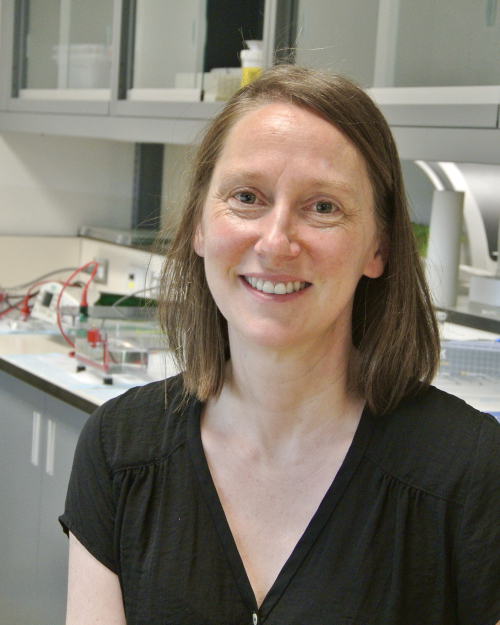 faiza.benaliouad [at] mcgill.ca (Faïza Benaliouad)
faiza.benaliouad [at] mcgill.ca (Faïza Benaliouad)
Projects Lead
"At the Neuro, everything seems possible. There is a plethora of scientists, postdoctoral fellows, and students working together to develop new assays and neurological disease models. Within the platform, challenges scare no one and there are many collaborations with internal and external partners."
"Au Neuro, tout semble possible. Il y a pléthore de scientifiques, de stagiaires postdoctoraux et d’étudiants qui travaillent en équipe afin de développer de nouveaux essais ou modèles de maladies neurologiques. Au sein de la plateforme, les défis ne font peur à personne et il y a plusieurs collaborations avec des partenaires internes, mais également externes au Neuro."
View Faïza'a PubMed
Read Faïza's biography
Faïza Benaliouad has completed her PhD in Neuroscience at the University of Montreal and then continued her research on the neural circuit of reward as a postdoctoral fellow at the National Institute on Drug Abuse in Baltimore. Following her fellowship, Faïza joined the Department of Pharmacology and Therapeutics of McGill University to develop in vivo assays with FRET biosensors to study bias signaling of G-protein coupled receptors and to implement primary neural culture. Currently, Faïza is working within the High-Content Screening (HCS) group to develop assays with iPSCs-derived neural progenitor cells (NPCs) and NPC-derived neurons. She is also doing HCS of compound librairies.
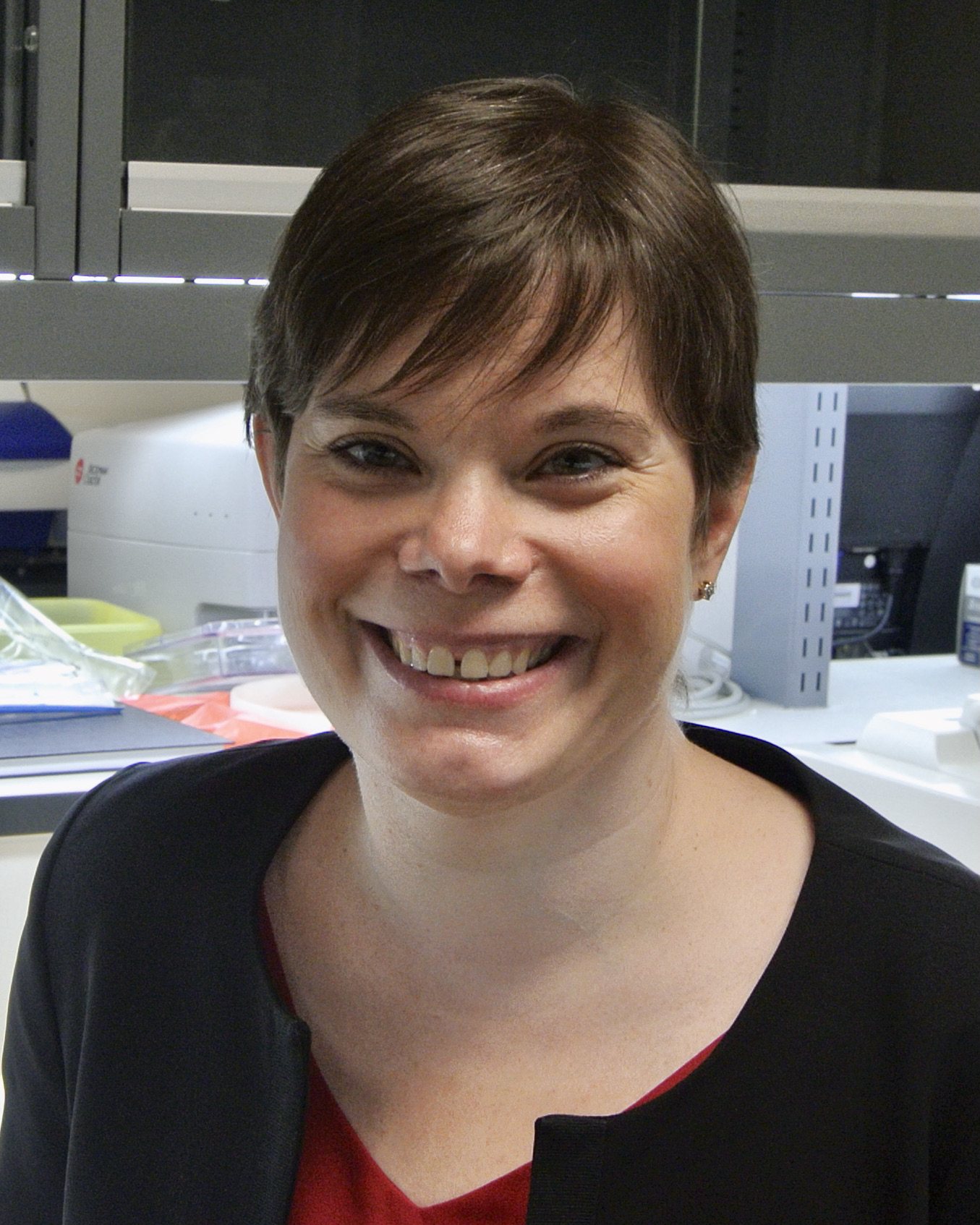 mathilde.chaineau [at] mcgill.ca (Mathilde Chaineau)
mathilde.chaineau [at] mcgill.ca (Mathilde Chaineau)
Partnerships Manager
"Working at the Neuro means the chance to work in a dynamic, collaborative, and innovative environment that benefits not only patients’ treatments and care, but also the quality of the scientific research conducted here."
"Travailler au Neuro, c’est avoir la chance de travailler dans un environnement dynamique, collaboratif et innovant, favorisant non seulement la qualité des soins et traitements offerts aux patients, mais également celle de la recherche scientifique qui y est menée."
Watch Mathilde's Spotlight Video
Read Mathilde's biography
I obtained my PhD in Cell Biology from Université Pierre et Marie Curie in Paris, where I specialized in studying vesicular trafficking and more specifically SNARE mediated exocytosis. After completing my PhD, I moved to Montréal in 2009 to join the Neuro with the desire to focus my research on neurological disorders. My decision to move across the Atlantic Ocean was not a surprise for anyone as I fell in love with Canada quite early. Indeed, at the age of 6 or 7, I tried to convince my parents to move the entire family here! During my post-doctoral training in Dr. Peter McPherson's laboratory, I studied Rab-mediated trafficking in glioblastoma and Amyotrophic Lateral Sclerosis (ALS). I then joined the Neuro-EDDU platform and the Structural Genomic Consortium (SGC) as a Research Associate in 2017. I am now the leader of the ALS team, and I am also involved in the development of the EDDU partnerships with industries, from small local biotech to bigger international pharmaceutical companies. Together with the ALS team, our research is focused on developing assays using induced pluripotent stem cells (iPSC) -derived cells (motor neurons and glial cells) from ALS patients to identify effective molecules and compounds to help the development of new treatments for the disease. Our research also consists in modelling the disease with human cells in 3D, in order to understand the crosstalk between the different cell types, and how some specific pathways could be affected in ALS.
Selected publications
- Deneault, E., Chaineau, M., Castellanos-Montiel, M. J., Flores, A. K. F., Haghi, G., Chen, C. X. Q., ... & Durcan, T. M. (2021). A streamlined CRISPR workflow to introduce mutations and generate isogenic iPSCs for modeling amyotrophic lateral sclerosis. bioRxiv.
- Castellanos-Montiel MJ, Chaineau M, Durcan TM. (2020) The Neglected Genes of ALS: Cytoskeletal Dynamics Impact Synaptic Degeneration in ALS. Front Cell Neurosci.
- Soubannier V, Maussion G, Chaineau M, Sigutova V, Rouleau G, Durcan TM, Stifani (2020) Characterization of human iPSC-derived astrocytes with potential for disease modeling and drug discovery. Neurosci Lett.
- Semmler S, Gagné M, Garg P, Pickles SR, Baudouin C, Hamon-Keromen E, Destroismaisons L, Khalfallah Y, Chaineau M, Caron E, Bayne AN, Trempe JF, Cashman NR, Star AT, Haqqani AS, Durcan TM, Meiering EM, Robertson J, Grandvaux N, Plotkin SS, McBride HM, Vande Velde C. (2020) TNF receptor-associated factor 6 interacts with ALS-linked misfolded superoxide dismutase 1 and promotes aggregation. J Biol Chem
- Han C*, Chaineau M*, Chen CX, Beitel LK, Durcan TM. (2018) Open Science Meets Stem Cells: A New Drug Discovery Approach for Neurodegenerative Disorders. Front Neurosci.
* Equal contribution from authors
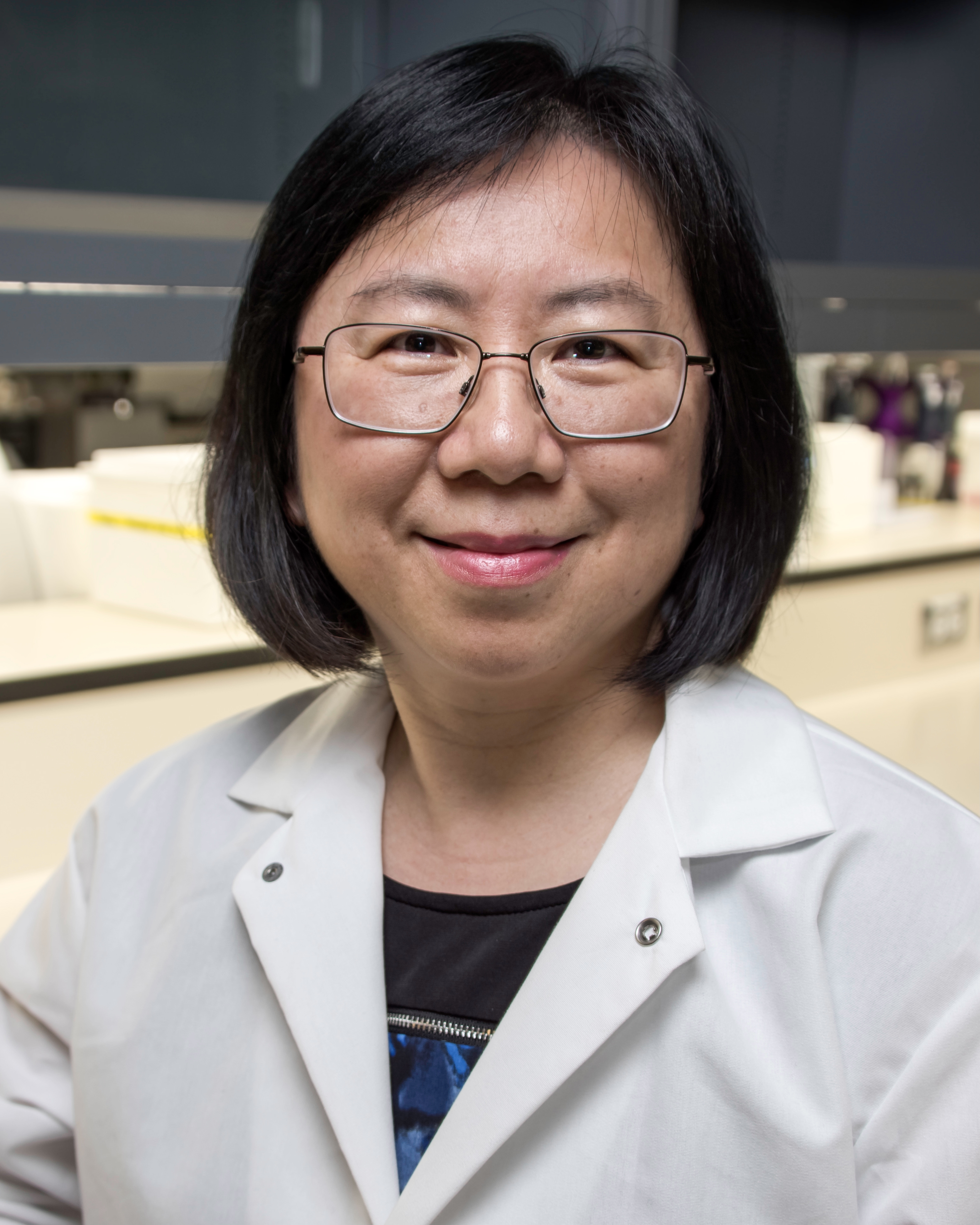 xiuqing.chen [at] mcgill.ca (Xiuqing (Carol) Chen)
xiuqing.chen [at] mcgill.ca (Xiuqing (Carol) Chen)
iPSC Colony Manager
"iPSC-derived neurons and brain organoids have given us new opportunities to model and investigate neurodegenerative diseases, as well as to develop new tools for drug discovery."
"蒙特利尔神经科学研究所是世界顶尖的神经科学中心, 我为能成为Neuro的一员感到非常自豪。"
Read Carol's biography
I am a research assistant at the Neuro EDDU. I received my Ph.D in Neurobiology in 1999. During my post-doc training at the University of Pittsburg and University of McGill, I focused on identifying molecular mechanisms underlying synaptic transmission and their implication in Parkinson’s disease (PD). In 2006, I joined Dr. Edward Fon’s lab at The Neuro, where I identified various functions of ubiquitin in the nervous system and how defects in parkin, an E3 ubiquitin ligase, could lead to PD. In 2015, I joined the EDDU platform as an iPSC cell manager, where I was responsible for laboratory establishment, protocol development, and cell line management. Subsequently, I participated more in the development of client projects, providing high-quality services to academic users with iPSC-derived neurons. In 2017, I became a training coordinator, providing iPSC and neuronal induction training and technical support on the platform. In 2019, I became group coordinator of iPSC phenotyping and CRISPR editing, responsible for iPSC reprogramming, iPSC banking, and quality control.
Selected publications
- X-Q Chen, C., Deneault, E., Abdian, N., You, Z., Sirois, J., Nicouleau, M., Shlaifer, I., Villegas, L., Boivin, M. N., Gaborieau, L., Karamchandani, J., Beitel, L. K., Fon, E. A., & Durcan, T. M. (2022). Generation of patient-derived pluripotent stem cell-lines and CRISPR modified isogenic controls with mutations in the Parkinson's associated GBA gene. Stem cell research, 64, 102919. https://doi.org/10.1016/j.scr.2022.102919
- Chen, C. X., You, Z., Abdian, N., Sirois, J., Shlaifer, I., Tabatabaei, M., Boivin, M. N., Gaborieau, L., Karamchandani, J., Beitel, L. K., Fon, E. A., & Durcan, T. M. (2022). Generation of homozygous PRKN, PINK1 and double PINK1/PRKN knockout cell lines from healthy induced pluripotent stem cells using CRISPR/Cas9 editing. Stem cell research, 62, 102806. https://doi.org/10.1016/j.scr.2022.102806
- Chen CX, Abdian N, Maussion G, Thomas RA, Demirova I, Cai E, Tabatabaei M, Beitel LK, Karamchandani J, Fon EA, Durcan TM. A Multistep Workflow to Evaluate Newly Generated iPSCs and Their Ability to Generate Different Cell Types. (2021) Methods Protocols.
- Thomas, R. A., Gibon, J., Chen, C., Chierzi, S., Soubannier, V. G., Baulac, S., Séguéla, P., Murai, K., & Barker, P. A. (2018). The Nogo Receptor Ligand LGI1 Regulates Synapse Number and Synaptic Activity in Hippocampal and Cortical Neurons. eNeuro, doi: https://doi.org/10.1523/ENEURO.0185-18.2018
- McLelland, G. L., Goiran, T., Yi, W., Dorval, G., Chen, C. X., Lauinger, N. D., Krahn, A. I., Valimehr, S., Rakovic, A., Rouiller, I., Durcan, T. M., Trempe, J. F., & Fon, E. A. (2018). Mfn2 ubiquitination by PINK1/parkin gates the p97-dependent release of ER from mitochondria to drive mitophagy. eLife, doi: https://doi.org/10.7554/eLife.32866
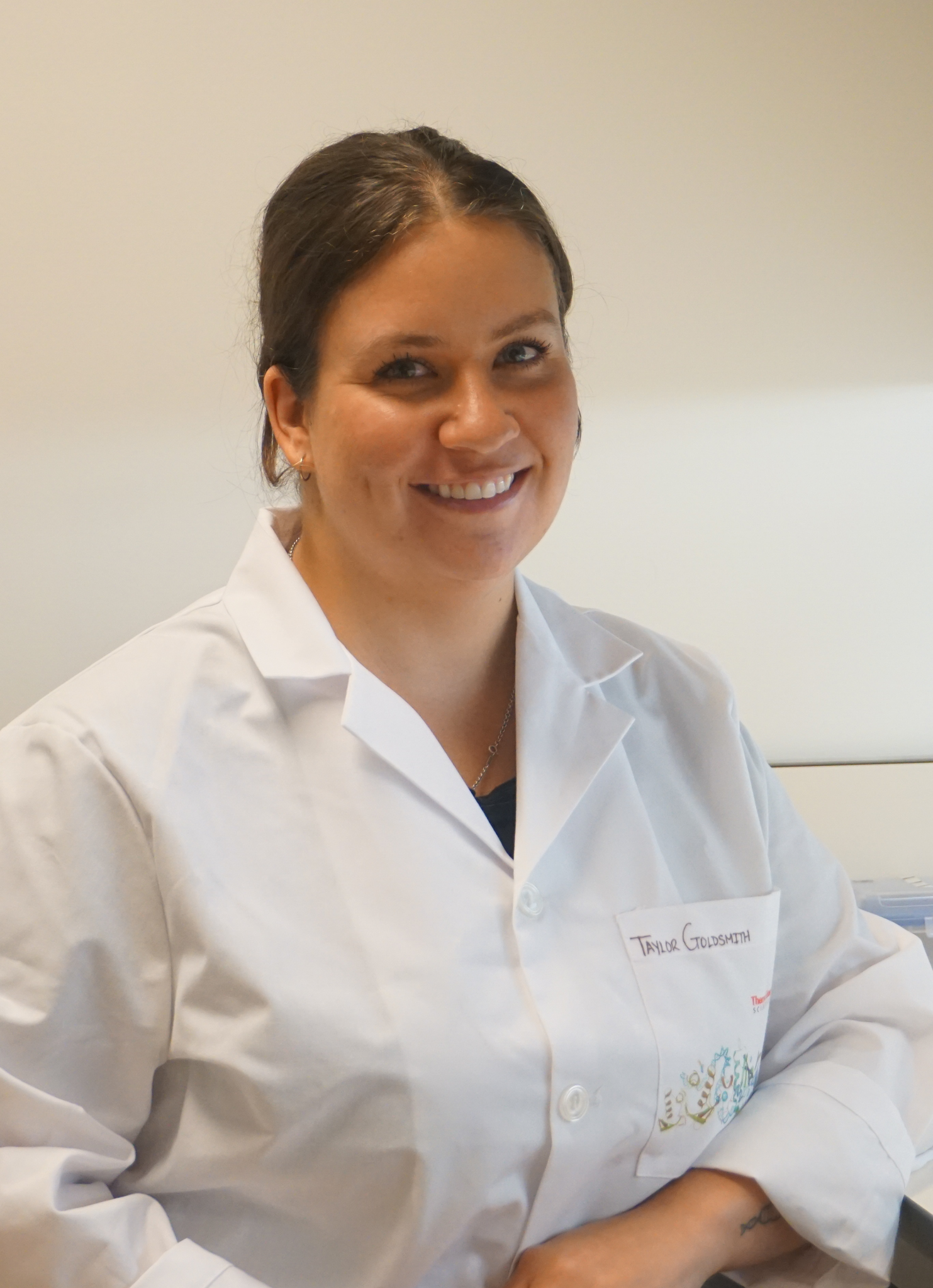 goldsmith.taylor [at] gmail.com (Taylor Goldsmith)
goldsmith.taylor [at] gmail.com (Taylor Goldsmith)
iPSC Request and Community Manager
"Equal to the important and groundbreaking work that The Neuro achieves in regards to Parkinson’s, ALS, and other neurological diseases is it’s drive for Open Science. I am thrilled to work at a place that shares knowledge, collaborates, and takes the time to teach and inform others. Science should be made accessible to everyone and The Neuro really champions this principle.
View Taylor's Linkedin
Read Taylor's biography
I received my Bachelor of Science from the University of Calgary in cellular and molecular biology. After an exciting internship in Spain working with 3D bioprinting, I knew that I wanted to stay in science. I went on to do my Master of Science at the University of Calgary studying cells of the male reproductive tract and learning the principles of genetic editing using CRISPR-Cas9. CRISPR has so much potential in therapeutics and personalized medicine and I wanted to apply my skills in this field. I moved to Minnesota to work at a biotech start-up that focused on gene editing. While there I developed genetically engineered human and porcine iPSCs to generate transplantable human organs in pigs, with the goal of helping to address the shortage faced by those requiring an organ transplant. I am looking forward to now bringing my knowledge and skills of gene editing and stem cells to The Neuro!
Selected publications
- Ruiz-Estevez M, Crane AT, Rodriguez-Villamil P, Ongaratto FL, You Y, Steevens AR, Hill C, Goldsmith T, Webster DA, Sherry L, Lim S, Denman N, Low WC, Carlson DF, Dutton JR, Steer CJ, Gafni O. Liver development is restored by blastocyst complementation of HHEX knockout in mice and pigs. Stem Cell Res Ther. 2021 May 19;12(1):292
- Goldsmith T, Bondareva A, Webster D, Voigt LA, Su L, Carlson DF, Dobrinski I. Targeted gene editing in porcine germ cells. In: Verna PJ, Liu J & Sumer H (eds). Springer Nature, Methods in Molecular Biology, Applications of Genome Modulation and Editing. Humana Press, NY. 2022.
- Shin W, Alpaugh W, Hallihan LJ, Sinha S, Crowther E, Martin GR, Scheidl-Yee T, Yang X, Yoon G, Goldsmith T, Berger ND, de Almeida LG, Dufour A, Dobrinski I, Weinfeld M, Jirik FR, Biernaskie J. PNKP is required for maintaining the integrity of progenitor cell populations in adult mice. Life Sci Alliance. 2021 Jul 5;4(9):e202000790
- Goldsmith TM, Sakib S, Webster D, Carlson DF, Van der Hoorn F, Dobrinski I. A reduction of primary cilia but not hedgehog signaling disrupts morphogenesis in testicular organoids. Cell Tissue Res. 2020 Apr;380(1):191-200
- Webster D, Bondareva A, Solin S, Goldsmith T, Su L, Lara NLEM, Carlson DF, Dobrinski I. Targeted Gene Editing in Porcine Spermatogonia. Front Genet. 2021 Jan 28;11:627673
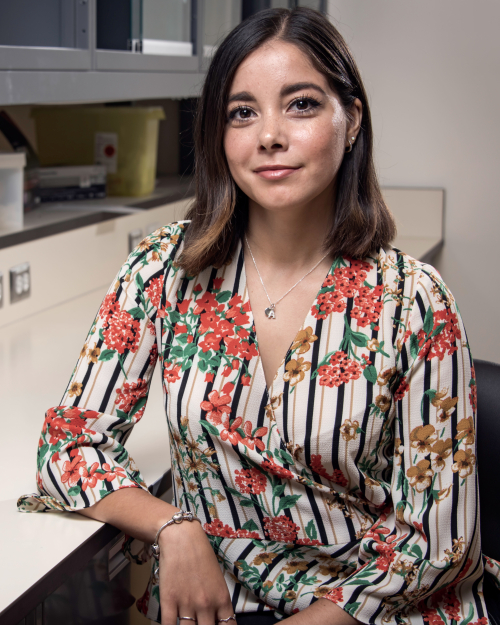 anna.francoflores [at] mcgill.ca (Anna Kristyna Franco Flores)
anna.francoflores [at] mcgill.ca (Anna Kristyna Franco Flores)
Outreach Manager
"Working at The Neuro is an opportunity to learn and work with the best neuroscientists in the world in a multicultural environment."
"Una de mis mayores motivaciones para trabajar en The Neuro fue el hecho de poder trabajar a lado de los mejores neurocientíficos en el mundo y así poder entender y desarrollar tratamientos efectivos para disminuir los padecimientos de personas con enfermedades neurodegenerativas. La segunda razón es que The Neuro es una institución multicultural que te brinda una experiencia enriquecedora en todos los aspectos."
View Anna's Linkedin
Read Anna's biography
Anna Franco is a Research Assistant at the Neuro's EDDU. She obtained her BSc. in Bioengineering in Baja California, Mexico. During her undergraduate studies, she was awarded a research internship scholarship (MITACS) at the Centre de recherche du Centre hospitalier de l’Université de Montréal (CRCHUM) in the neuro-metabolic group. This experience enhanced her research skills and passion for understanding the inner workings of the brain. Following her dream, Anna moved to Montréal to later obtain her MSc degree in Neuroscience from the University of Montréal in 2018, while working as a trainee at CRCHUM. Her outstanding work in cellular and molecular neuroscience brought her to The Neuro in 2019, joining the team of high-content screening and automation. She currently works on ALS-specific projects along with the generation, characterization and maintenance of iPSC cells derived from ALS-patients or healthy individuals.
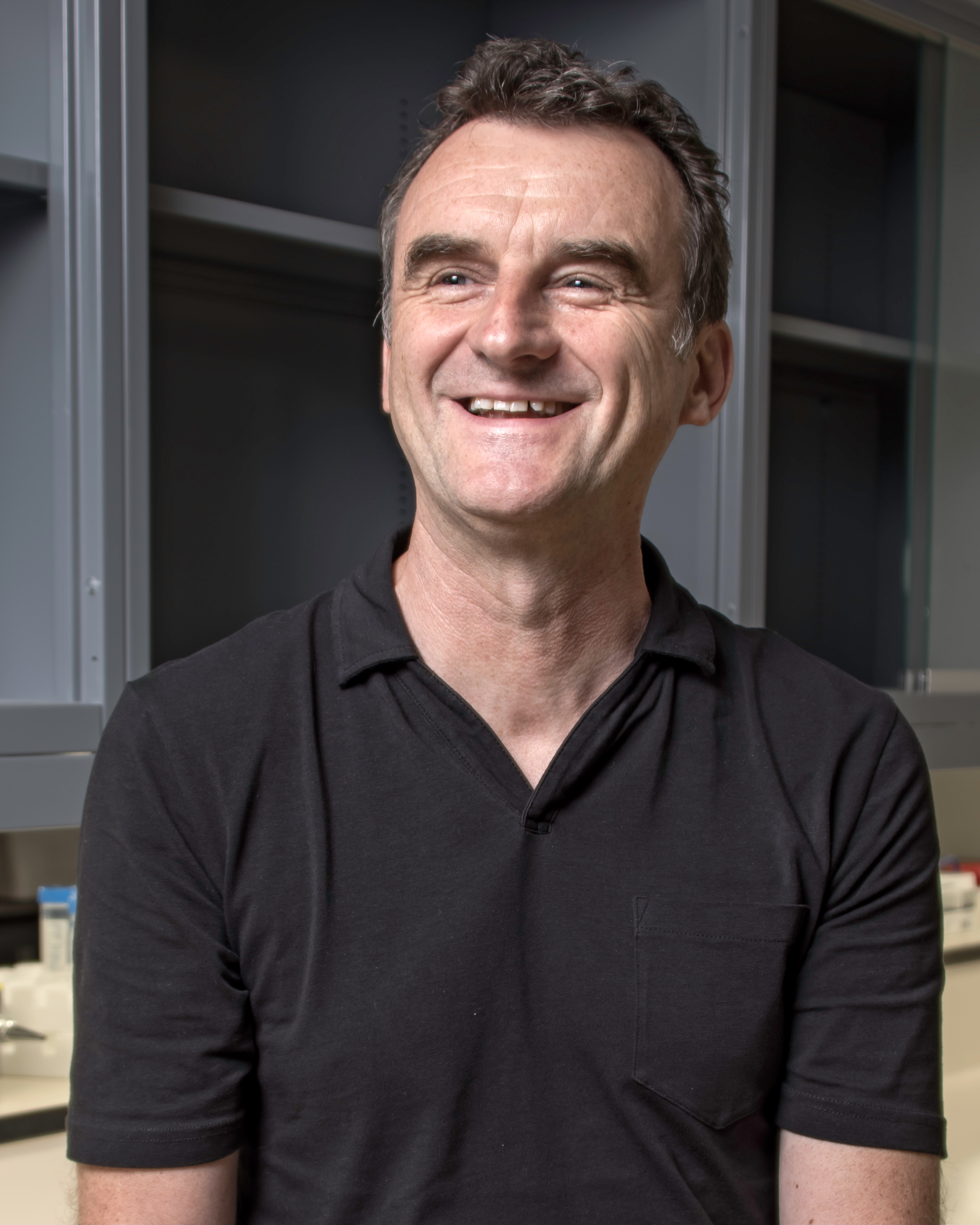 wolfgang.reintsch [at] mcgill.ca (Wolfgang Reintsch)
wolfgang.reintsch [at] mcgill.ca (Wolfgang Reintsch)
Automation Manager
"I am inspired to work at the Neuro because it is an opportunity to work together with a large and diverse team of bright people to discover new means to battle neurodegenerative diseases."
"Die Gelegenheit zusammen mit einem multidisziplinaeren Team von Wissenschaftlern neue Wege zu finden um neurodegenerative Krankheiten zu bekaempfen."
Watch Wolfgang's Spotlight Video
Read Wolfgang's biography
I have been part of the EDDU since 2017, where I manage the assay automation and High Content Screening platform, and oversee the discovery assays and screening group. Before joining the platform, over the course of 10 years I worked in several industrial laboratories in Montreal with a focus on automation, high content microscopy, and image analysis. I managed a light microscopy and molecular biology platform in the department of pharmacology at McGill University. I was born in Germany and received my PhD at the Max Planck Institute for Developmental Biology in Tübingen, Germany. My work there and later as a Post-Doc at McGill University circled around the cellular mechanisms that shape the developing embryo. During that time, I already started to develop microscopy tools and automated approaches for my research, and I have maintained a strong interest in this area ever since.
julien.sirois [at] mcgill.ca (Julien Sirois)
Flow Cytometry Core Manager
"Initially, I was inspired to work at The Neuro to help the advancement of knowledge of neurological diseases. A couple of years ago, my aunt was diagnosed with MS here at The Neuro. This gave me a boost to find a cure for this disease."
"Initialement, j'ai été inspiré pour travailler au Neuro pour aider à l'avancement des connaissances sur les maladies neurologiques. Il y a quelques années, ma tante a reçu un diagnostic de SP ici au Neuro. Cela m'a donné un surplus de motivation pour trouver un traitement pour cette maladie."
Read Julien's biography
From a very young age, I always knew I wanted to be a scientist, mainly because of fictional characters such as Egon Spengler, Donatello, Gandalf, Obi-Wan and Dr. Beakmann. In 2006, I got a chance when I became an immunology and microbiology undergraduate. After, I continued my studies in the field of immunology in the laboratory of Dr. Nathalie Labrecque at Université de Montréal. I learned many techniques during this time, but mainly focused on flow cytometry. My passion was born. While I was writing my thesis, I worked for a Contract Research Organization but missed the academic side of science. After months of searching, an opportunity opened up at Experimental Therapeutics Program at the Montreal Neuro, led by Dr. Amit Bar-Or. I brought a lot of my flow cytometry expertise to my newfound new team. Unknown to me at the time, my growing curiosity of the neurology world help me create new ways to approach flow cytometry in general. In the beginning of 2019, I was promoted as the first Neuro Flow Cytometry Facility manager, which will help to make flow cytometry more accessible. Flow Cytometry is not common equipment to be used in a Neurological Institute. My ultimate goal would be to teach the fundamentals of Flow Cytometry to other researchers to use this underutilized equipment. Just by implementing flow cytometry would open the floodgates on the amount of new information we can get. Ultimately, this will definitely help patients because we are able to use their specific cells. We are very lucky to have access to patient samples, not just myself but The Neuro as a whole.
Selected publications
- Mohamed, N. V., Lépine, P., Lacalle-Aurioles, M., Sirois, J., Mathur, M., Reintsch, W., Beitel, L. K., Fon, E. A., & Durcan, T. M. (2021). Microfabricated disk technology: rapid scale up in midbrain organoid generation. Methods (San Diego, Calif.) Preprint available : https://doi.org/10.1016/j.ymeth.2021.07.008
- Mohamed NV, Sirois J, Ramamurthy J, Mathur M, Lepine P, Deneault E, Maussion G, Nicouleau M, Chen CX, Abdian N, Soubannier V, Cai, E, Nami, H., Thomas, RA, Beitel, LK, Dolt, K.S., Karamchandani, J, Kunath, K., Fon, EA, Durcan, TM. (2021) Midbrain organoids with an SNCA gene triplication model key features of synucleinopathy. BrainComm. Preprint available: https://www.biorxiv.org/content/10.1101/2021.04.12.439480v1
- Rostami, J., Fotaki, G., Sirois, J., Mzezewa, R., Bergström, J., Essand, M., Healy, L., & Erlandsson, A. (2020). Astrocytes have the capacity to act as antigen-presenting cells in the Parkinson's disease brain. Journal of neuroinflammation, doi: https://doi.org/10.1186/s12974-020-01776-7
- Sirois J, Daudelin J-F, Boulet S, Marquis M, Meloche S, Labrecque N. 2015. The atypical MAPK ERK3 controls positive selection of thymocytes. Immunology doi: https://doi.org/10.1111/imm.12433.
- Marquis M, Daudelin JF, Boulet S, Sirois J, Crain K, Mathien S, Turgeon B, Rousseau J, Meloche S, Labrecque N. 2014. The catalytic activity of the mitogen-activated protein kinase extracellular signal-regulated kinase 3 is required to sustain CD4+CD8+ thymocyte survival. Mol Cell Bioldoi: https://doi.org/10.1128/MCB.01701-13.
STAFF
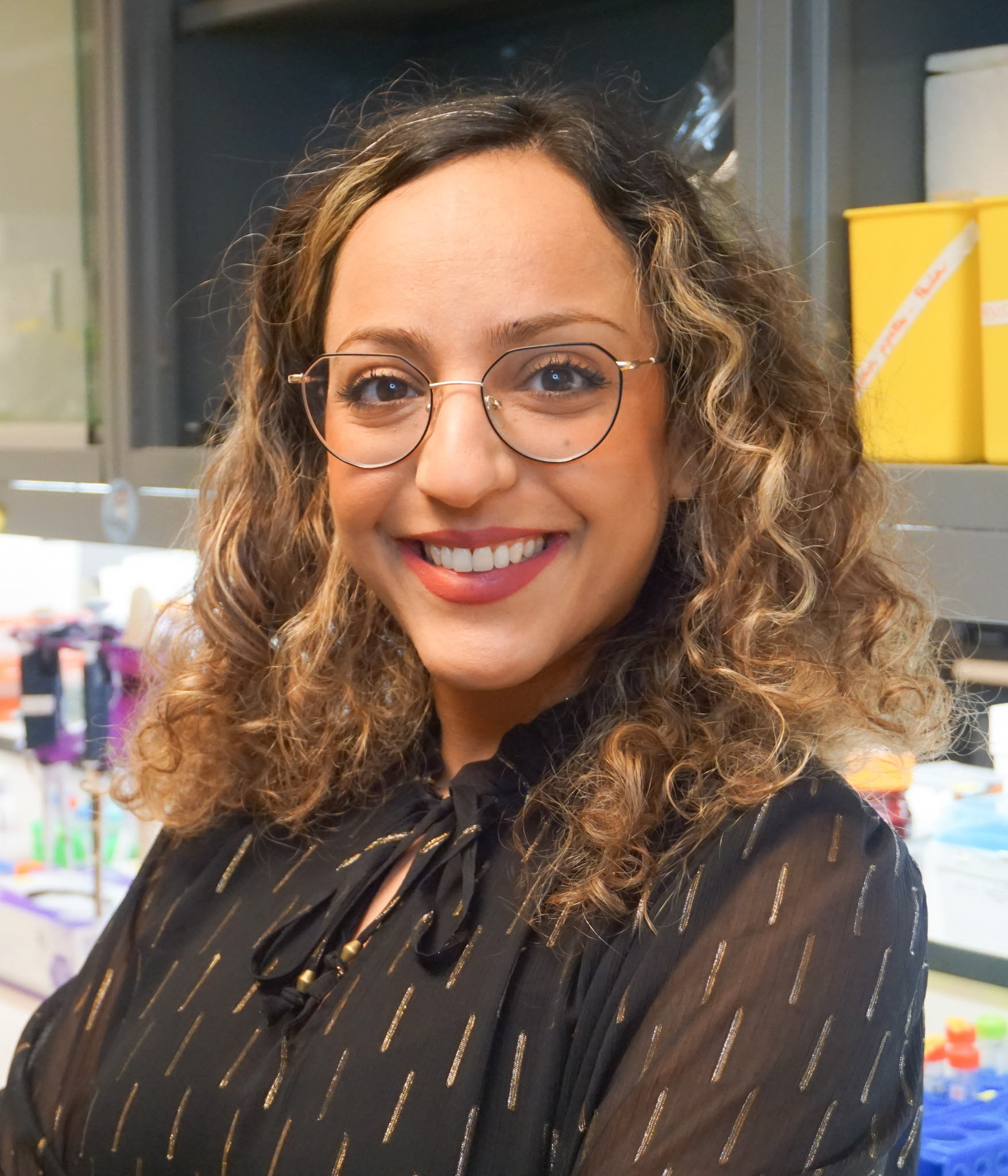 narges.abdian [at] mcgill.ca (Narges Abdian)
narges.abdian [at] mcgill.ca (Narges Abdian)
Research Assistant
"Parkinson's disease is the reason that I lost my father. I will make all my efforts so that nobody will lose their father to this disease."
"پارکینسون پدرم را از من گرفت من تلاش می کنم تا روزی که هیچ دختری پدرش رو به خاطر هیچ بیماری از دست نده"
View Narges's Linkedin
Read Narges's biography
I am research assistant at EDDU since 2018. I received my PhD in molecular medicine in 2015. Currently, I am working in iPS generation group and I am responsible for iPSC generation and differentiation into different neuronal types. I am also involved in characterization, quality control, and managing data sheets of iPSC lines. In addition, I coordinate iPSC and neural induction training. It is the greatest joy and motivation for me to wake up every day with the hope to know something new in science and find a way to help people suffering from any neurodegenerative disease. I am really happy to have the opportunity to do research in neuroscience; one of the most complicated and unique systems that I have ever seen.
Selected publications
- Carol X-Q. Chen, Narges Abdian, Gilles Maussion, Rhalena A. Thomas, Iveta Demirova, Eddie Cai, Edward A. Fon, Thomas M. Durcan. Standardized QC workflow foranalyzing the quality and differentiation potential of human iPSCs. ISSCR Annual Meeting 26-29 June 2019, Los Angeles, USA.
- Abdian, N., Ghasemi-Dehkordi, P., Hashemzadeh-Chaleshtori, M., Ganji-Arjenaki, M., Doosti, A., & Amiri, B. (2015). Comparison of human dermal fibroblasts (HDFs) growth rate in culture media supplemented with or without basic fibroblast growth factor (bFGF). Cell and tissue banking, 16(4), 487–495. https://doi.org/10.1007/s10561-015-9494-9
- Narges Abdian, Mehdi Allahbakhshian-Farsani, Somayeh Khosravi-Farsani, Payam Ghasemi-Dehkordi, Sedigheh Kazemi-Sheykhshabani , Mahboubeh Ganji-Arjenaki, Morteza Hashemzadeh-Chaleshtori. Generation of HSC-like Cells from Human Embryonic Stem Cells by Inhibition of TGF-βR2 Signaling. Proc. Natl. Acad. Sci., India, 2015, Sect. B Biol. Sci. DOI 10.1007/s40011-015-0504-2.
- Ghasemi-Dehkordi P, Allahbakhshian-Farsani M, Abdian N, et al. Comparison between the cultures of human induced pluripotent stem cells (hiPSCs) on feeder-and serum-free system (Matrigel matrix), MEF and HDF feeder cell lines. J Cell Commun Signal. 2015;9(3):233-246. doi:10.1007/s12079-015-0289-3
- Abdian, N., Gholami, E., Zahedifard, F., Safaee, N., & Rafati, S. (2011). Evaluation of DNA/DNA and prime-boost vaccination using LPG3 against Leishmania major infection in susceptible BALB/c mice and its antigenic properties in human leishmaniasis. Experimental parasitology, 127(3), 627–636. https://doi.org/10.1016/j.exppara.2010.12.007
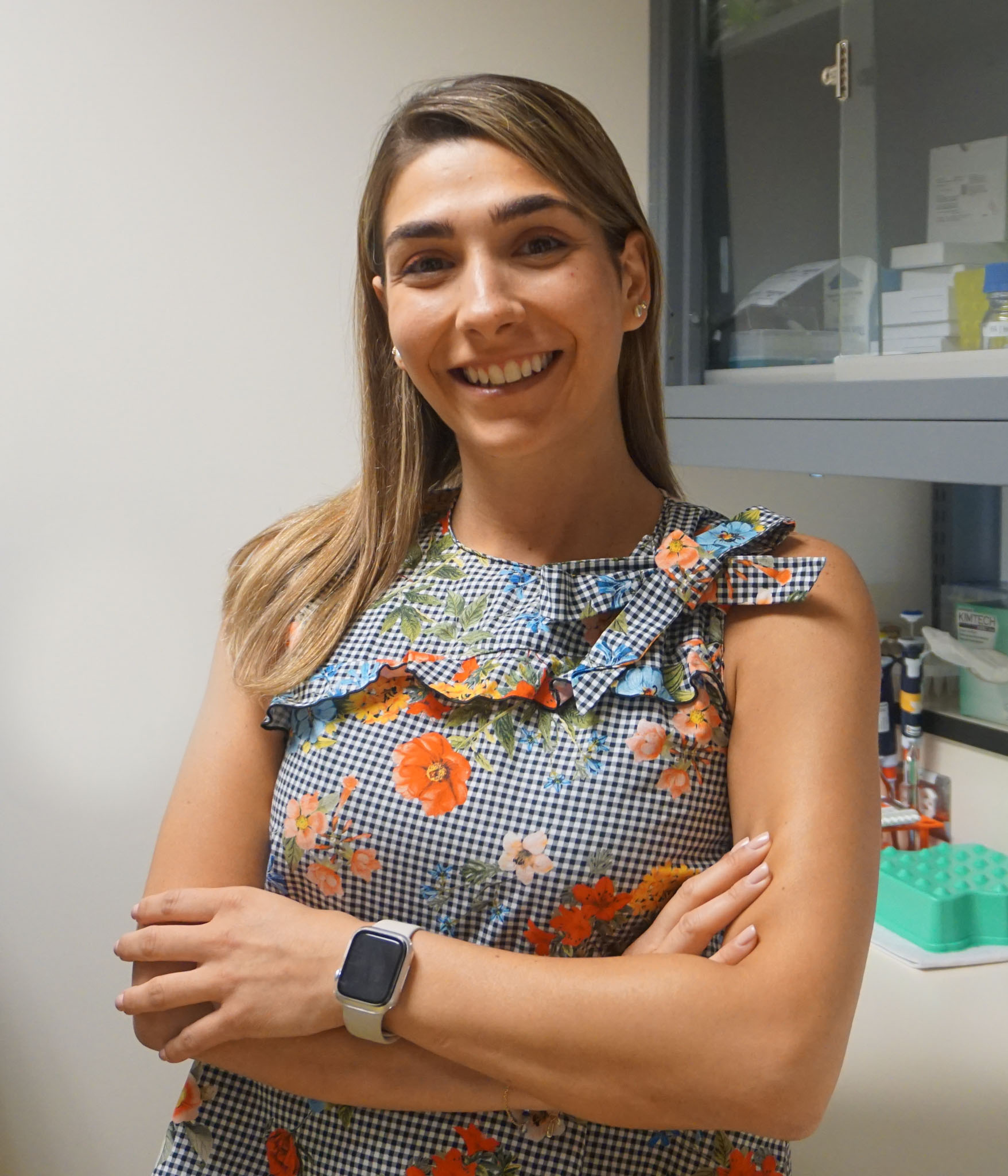 Nathalia.aprahamian [at] mcgill.ca (Nathalia Aprahamian)
Nathalia.aprahamian [at] mcgill.ca (Nathalia Aprahamian)
Research Assistant
"The Neuro grants me the opportunity to impact advancement of science and medicine and to touch the lives of patients. As a strong advocate of innovation and shared knowledge, I believe that critical breakthroughs are achieved when scientists collaborate and share knowledge. As such, the Open Science is a valuable and promising platform where bright minds intersect and work together to improve the quality of human life."
"Neuro կեդրոնը ինձ կու տայ հնարաւորութիւն մասնակից դառնալու գիտութեան եւ բժշկութեան զարգացման: Իբրեւ նորարարութեան եւ գիտութեան հանրայնացման ջատագով, ես կը հաւատամ որ գիտական կարեւոր նուաճումներ կ'արձանագրուին երբ գիտնականներ կը համագործակցին եւ իրենց տեղեկութիւնները կը փոխանակեն: Այս իմաստով, «Open Science»-ը արժէքաւոր եւ յուսալի հարթակ մըն է, ուր գիտական փայլուն մտքեր կը հանդիպին ու կը գործակցին յանուն մարդկային կեանքի բարելաւման:
، أتطلع إلى العمل مع باحثين وعالمين لتحقيق أهداف Neuro بصفتي مساعدة باحث في
في تعزيز فهمنا للاضطرابات العصبية وتحسين صحة المرضى من خلال علاجات جديدة Neuro"
View Nathalia's Linkedin
Read Nathalia's biography
Born and raised in Lebanon, from an early age I was intrigued by science, especially Biology. I was fascinated by the functioning of the human body. This curiosity eventually led me to pursue and obtain my B.Sc. in Biology from Haigazian University (Beirut) in 2015. I was then recruited by the American University of Beirut (AUB) Medical Center - Clinical Genetics Unit. As Medical Laboratory Technologist and later as a Clinical Scientist, I developed various skills in Clinical genetics. My duties included performing Karyotyping, FISH and other Cytogenetics diagnostic techniques on patients’ samples in the context of Oncology and prenatal diseases. In 2020 I joined the Université Saint Joseph Medical Genetics Unit, where I had the opportunity to expand my expertise into a wide range of diagnostic molecular genetics techniques. 2023 was a turning point, when I moved to Canada and started a new chapter in my life. In my pursuit of a new professional challenge, I was given the opportunity to join Dr. Durcan’s team at the Neuro. Acknowledging the importance of the cutting-edge work done in the field of Neuroscience at the Neuro, I look forward to further develop as a scientist and to having a positive impact on the efforts targeting neurodegenerative disorders. I believe that the strategies and philosophy of the Open Science are best suited to address the challenges of modern medicine and provide an excellent model of patient-centered approach.
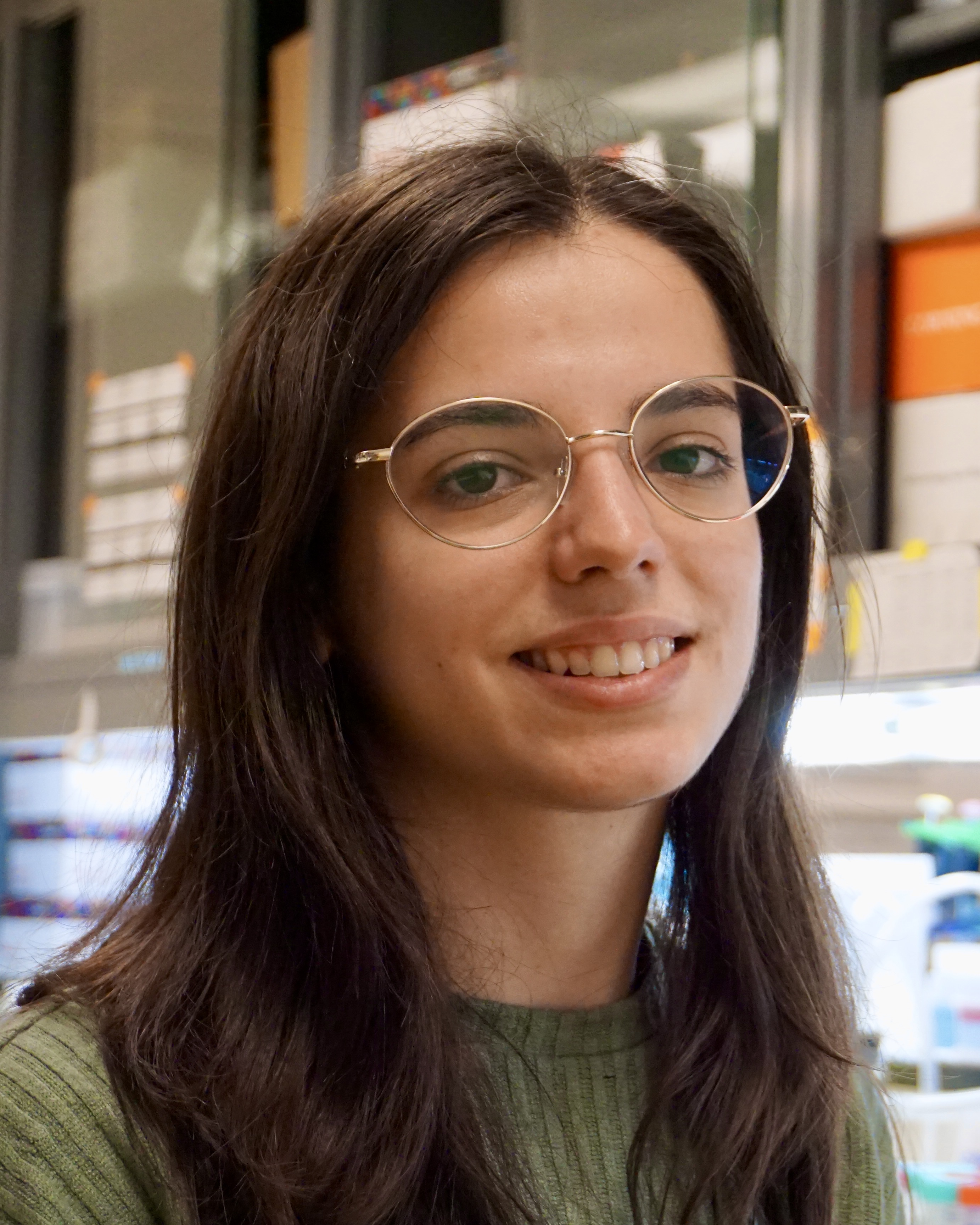 María Belén Baeza Trallero
María Belén Baeza Trallero
Research Assistant
"I’m an active, curious, science-passionate person; I’m always willing to learn from new techniques, different approaches and procedures within an international environment. Working at The Neuro gives me not only that, but also the chance of supporting a team and performing tasks that I truly believe would lead to develop significant new knowledge in neurodegenerative diseases and treatments for patients suffering from them."
"Soy una persona activa, curiosa, apasionada por la ciencia, siempre estoy dispuesta a aprender nuevas técnicas, diferentes enfoques y procedimientos dentro de un entorno internacional. Trabajar en The Neuro me brinda no solo eso, sino también la oportunidad de apoyar a un equipo y realizar tareas que realmente creo que conducirán a desarrollar nuevos conocimientos significativos sobre enfermedades neurodegenerativas así como tratamientos para los pacientes que las padecen, lo cual es extraordinario."
View María's Linkedin
Read María's biography
Born and raised in Zaragoza, Spain, I received my Biotechnology BSc from the Universidad de Zaragoza and my MSc in Genetics and Cell Biology from the Universidad Autónoma de Madrid. During the past few years, I’ve worked for different research teams, especially in molecular and cellular biology techniques such as extraction of RNA and DNA, quantitative PCR, or western blot. I’ve also worked as research assistant at Lozano Blesa University Clinical Hospital and for a company to set up lateral flow immunocromatography devices for the diagnosis of human diseases. That’s when I really realized the impact that our work could have for real patients (but not only) and how important research is. I got a scholarship and I first came to Montréal in 2018 to accomplish my BSc’s last year in an interuniversity exchange context. During this year, I had the opportunity of working in an internship at the UQAM. I joined an amazing team where I explored Hematopoietic stem cells (HSCs) differentiation within flux cytometry. I fell in love with this city so I decided to come back in 2022, looking for new challenging opportunities which let me keep developing my skills and ended up adding Dr. Durcan’s team and the Neuro's EDDU in 2023.
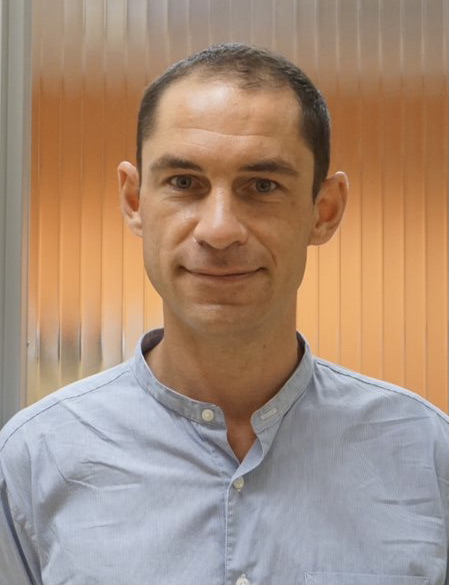 martin.berryer [at] mcgill.ca (Martin Berryer)
martin.berryer [at] mcgill.ca (Martin Berryer)
Research Associate
"The communication of scientific knowledge through diverse trainings, sharing discoveries via Open Science, the collaboration with researchers and physicians, with other academic institutions and industries through translational research, the use of cutting-edge technologies such as iPSCs derived cells or automation and high-content screening… Those are few points which inspired me to work at the EDDU who combine it all to accelerate the development of new therapies to improve the life of patients affected by neurodegenerative disorders."
"La propagation de nos connaissances scientifiques par l’enseignement, la communication des avancées scientifiques par l’Open Science, la collaboration entre chercheurs, médecins, avec d’autres instituts académiques et des industries notamment par la recherche translationelle, l’utilisation de technologies de pointe comme les iPSCs, l’automatisation, le dépistage de molécules candidates…sont quelques arguments m’inspirant à travailler à l’EDDU dont la mission est la découverte et le développement de nouvelles thérapies vers l’amélioration de la vie des patients affectés de maladie neurodégénérative."
View Martin's LinkedIn
Read Martin's biography
I completed my master at the Université de Rouen (FRANCE) where I explored the behavior and the cerebellum architecture of the Weaver mice. I then moved to CANADA, University of Montreal (Québec, CANADA) for my PhD where under the supervision of Drs J.Michaud et G.DiCristo I did study the impact of Syngap1 mutations in the synapse development of mouse GABAergic neurons and its behavioral consequences. The experience as a PhD emphasized a strong desire to understand the cellular & molecular mechanisms involved in neural circuit assembly. My postdoctoral fellowship at The Broad Institute of Harvard & MIT (Cambridge, USA) under the supervision of Drs L.Barrett & L.Rubin focused on an automated high-content drug discovery synaptic assay using human induced neurons. I am currently working at The Early Drug Discovery Unit, McGill University (Montreal, Québec, CANADA) as a research associate using iPSC to understand mechanisms and potentially find new treatments or improved therapies for neurodevelopmental disorders.
Selected publications
-
Martin H. Berryer, Matthew Tegtmeyer, Loic Binan, Vera Valakh, Anna Nathanson, Darina Trendafilova, Ethan Crouse, Jenny Klein, Daniel Meyer, Olli Pietilainen, Francesca Rapino, Samouil L. Farhi, Lee L. Rubin, Steven A. McCarroll, Ralda Nehme and Lindy Barrett. Robust induction of functional astrocytes using NGN2 expression in human pluripotent stem cells. (2023). iScience. https://doi.org/10.1016/j.isci.2023.106995
-
Martin H. Berryer, Gizem Rizki, Sara G. Susco, Daisy Lam, Angelica Messana, Darina Trendafilova, Anna Nathanson, Kyle W. Karhohs, Beth A. Cimini, Kathleen Pfaff, Anne E. Carpenter, Lee L. Rubin, and Lindy E. Barrett. A fully automated high-content synaptic screen in human neurons and astrocytes reveals a role for BET proteins in synapse assembly. (2023). eLife. PMID: 37083703.
-
Khlaifia A, Jadhav V, Danik M, Badra T, Berryer MH, Dionne-Laporte A, Chattopadhyaya B, Di Cristo G, Lacaille JC, Michaud JL. Syngap1 disruption induced by recombination between inverted loxP sites is associated with hippocampal interneuron dysfunction. (2023). eNeuro. PMID: 37072176.
-
Sara G. Susco, Sulagna Ghosh, Patrizia Mazzucato, Gabriella Angelini, Amanda Beccard, Victor Barrera, Martin H Berryer, Angelica Messana, Daisy Lam, Dane Z. Hazelbaker, Lindy E. Barrett. Molecular convergence between Down syndrome and Fragile X syndrome identified using human pluripotent stem cell models. (2022) Cell Reports. PMID: 36070702.
-
Clara A.Amegandjin, Mayukh Choudhury, Vidya Jadhav, Josianne Nunes Carrico, Arianne Quintal, Martin H Berryer , Marina Snapyan, Bidisha Chattopadhyaya, Armen Saghatelyan, Graziella Di Cristo. Inhibition of mTOR during a postnatal critical sensitive window rescues deficit in GABAergic Pv cell connectivity and social behavior caused by loss of Tsc1. (2021). Nature Communications. PMID: 34135323.
-
Martin H Berryer, Sara G Kosmaczewski, Lindy E Barrett. (2019). Fly Model sheds light on brain disease. Elife. PMID: 31808420. (Insight article).
-
Mathieu Nadeau-Vallée, Peck-Yin Chin, Lydia Belarbi, Marie-Ève Brien, Sheetal Pundir, Martin H Berryer, Alexandra Beaudry-Richard, Ankush Madaan, David J Sharkey,
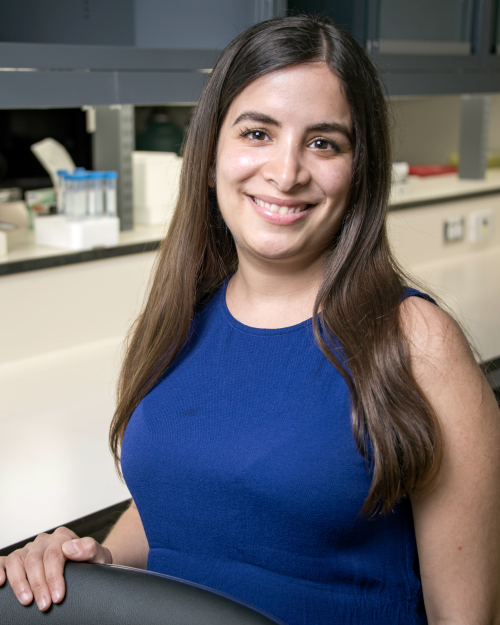 ghazal.haghi [at] mcgill.ca (Ghazal Haghi)
ghazal.haghi [at] mcgill.ca (Ghazal Haghi)
Research Assistant
"I believe that stem cell research is one of the best ways to find treatments for neuro-degenerative diseases. By working in this field at The Neuro I hope to take a step, even though small, towards finding a treatment for patients."
"من باور دارم که کار در زمینه سلول های بنیادی یکی از بهترین راه های پیدا کردن درمان برای بیماریهای عصبی است. با کار کردن در این زمینه و در این مرکز، امیدوارم که قدم حتی کوچکی برای کمک به بیماران برداشته شو"
Read Ghazal's biography
I started my journey as a scientist with a bachelor degree in Genetics in Iran. To continue my studies I moved to the UK. After completing a master's degree in reproductive biology and focusing mainly on human stem cells, I joined the Centre for Neurodegeneration diseases in Edinburgh as a research assistant for a few years. Moving to Canada and finding my path again was a new challenge. After working in a few companies and expanding my expertise into reproductive genetics, I have returned to academia and am excited to be working with human iPSCs again.
Selected publications
- Qiu J, McQueen J, Bilican B, Dando O, Magnani D, Punovuori K, Selvaraj BT, Livesey M, Haghi G, Heron S, Burr K, Patani R, Rajan R, Sheppard O, Kind PC, Simpson TI, Tybulewicz VL, Wyllie DJ, Fisher EM, Lowell S, Chandran S, Hardingham GE. (2016) Evidence for evolutionary divergence of activity-dependent gene expression in developing neurons. Elife doi: 10.7554/eLife.20337.
- Bilican B, Livesey MR, Haghi G, Qiu J, Burr K, Siller R, Hardingham GE, Wyllie DJ, Chandran S. PLoS One. (2014) Physiological normoxia and absence of EGF is required for the long-term propagation of anterior neural precursors from human pluripotent cells. PLOS ONE doi: 10.1371/journal.pone.0085932.
- James OT, Livesey MR, Qiu J, Dando O, Bilican B, Haghi G, Rajan R, Burr K, Hardingham GE, Chandran S, Kind PC, Wyllie DJ. (2014) Ionotropic GABA and glycine receptor subunit composition in human pluripotent stem cell-derived excitatory cortical neurones. J Physiol. doi: 10.1113/jphysiol.2014.278994.
- Livesey MR, Bilican B, Qiu J, Rzechorzek NM, Haghi G, Burr K, Hardingham GE, Chandran S, Wyllie DJ. (2014) Maturation of AMPAR composition and the GABAAR reversal potential in hPSC-derived cortical neurons. J Neurosci.. doi: 10.1523/JNEUROSCI.5410-13.2014.
- Serio A, Bilican B, Barmada SJ, Ando DM, Zhao C, Siller R, Burr K, Haghi G, Story D, Nishimura AL, Carrasco MA, Phatnani HP, Shum C, Wilmut I, Maniatis T, Shaw CE, Finkbeiner S, Chandran S. (2013) Astrocyte pathology and the absence of non-cell autonomy in an induced pluripotent stem cell model of TDP-43 proteinopathy. Proc Natl Acad Sci U S A. doi: 10.1073/pnas.1300398110.
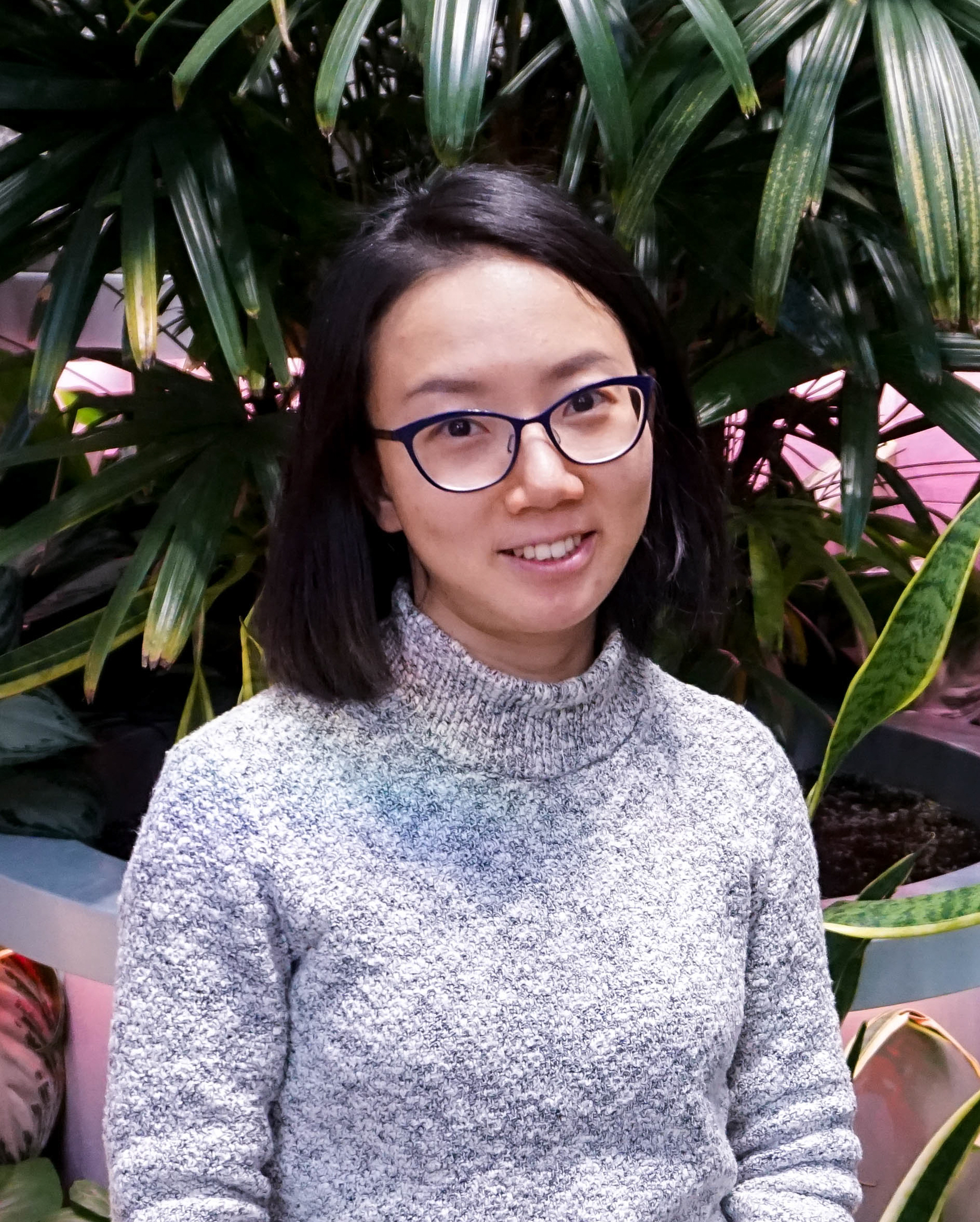 bing.han [at] mcgill.ca (Bing Han)
bing.han [at] mcgill.ca (Bing Han)
Research Assistant
"Here in the Neuro we embrace Open Science which promotes collaboration and innovation. Seeing patients in the Neuro reminds me about our mutual goal of finding treatments and is what makes my work and my life meaningful everyday."
"蒙特利尔神经科学研究医院是世界最好的神经科学研究中心之一。能和来自全球各国的科学家和研究人员一起工作,能成为这个高度协调的团队的一员,共同为人类的健康做贡献,我感到非常幸运,在这里工作我非常开心。"
View Bing's Linkedin
Read Bing's biography
I received my bachelor degree of Science in biochemistry & neuroscience from the University of Toronto. After graduation, I moved to Montreal as I have always been fascinated by this beautiful and multicultural city. It is a great pleasure to be a part of the EDDU team at the Neuro, where researchers here are highly cooperative and working towards a mutual goal – finding better treatments for patients. This is what motivates me everyday. I believe Open Science is an important value for improving human health, as by sharing more, we open the door for creating more.
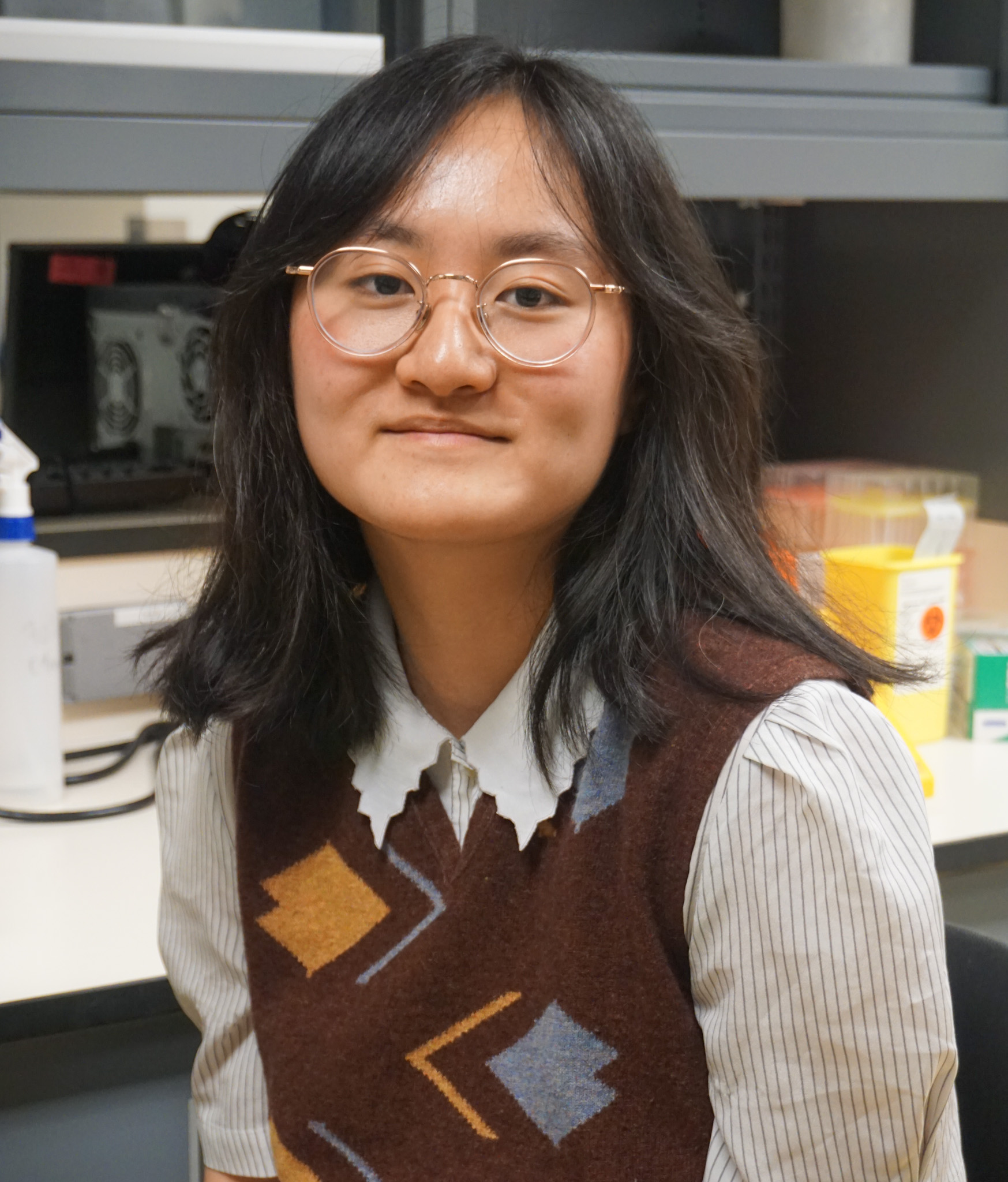 doris.hua [at] mail.mcgill.ca (Doris Hua)
doris.hua [at] mail.mcgill.ca (Doris Hua)
Project Assistant: Outreach and Training
"As I learn from the incredible scientists here at the EDDU, I am continually inspired in our pursuit of Open Science to advance the discovery of therapies to treat neurological disease. Working alongside Luisa Pimentel in our Outreach Team has enriched my undergraduate education immensely, and I am grateful for the opportunity to widely share the work done here at the EDDU with others."
View Doris' Linkedin
Read Doris's biography
Born in China, my home soon became the suburbs of the Greater Toronto Area, where my passion for both science and writing grew. Determined to pursue both, I am currently majoring in Biology and English at McGill, discovering insightful intersections between both fields every day. One of the greatest opportunities to apply both skills has been here at the EDDU, where I work on creating lab protocol and outreach videos, as well as managing our website, Data Portal, and social media. I believe that open sharing and effective communication of new research is at the forefront of science and progress, especially in an age where information is so readily available. With my amazing colleague, Luisa Pimentel, our outreach team continues to contribute to Open Science by sharing the incredible work done here at the EDDU on an international stage.
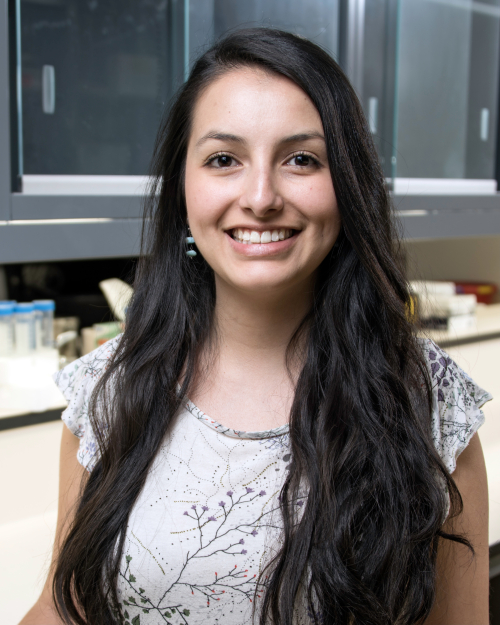 andrea.krahnroldan [at] mail.mcgill.ca (Andrea Krahn)
andrea.krahnroldan [at] mail.mcgill.ca (Andrea Krahn)
Research Assistant
"Working at the first Open Science Institute in the world, where scientists like Wilder Penfield, Donald Hebb, and Brenda Milner made their most famous discoveries is truly an honour."
"Ser parte de un instituto en el cual científicos como Wilder Penfield, Donald Hebb y Brenda Milner hicieron sus descubrimientos más famosos, es realmente un honor."
Watch Andrea's Spotlight Video
Read Andrea's biography
Andrea was born in Mexico City and later raised in the small town of Niagara on the Lake. She attended Brock University, where she received her BSc in Neuroscience. She then worked as a chemical analyst at the Canada Centre for Inland Waters before moving to Montréal to pursue a master’s in Neuroscience at McGill. She is now a research assistant at the Neuro’s EDDU, working on automation of assays in iPSC-derived neurons for high content screening.
Selected publications
- Tang, M.Y., M. Vranas, A.I. Krahn, S. Pundlik, J.F. Trempe, and E.A. Fon. 2017. Structure-guided mutagenesis reveals a hierarchical mechanism of Parkin activation. Nat Commun. 8:14697.
- McLelland, G.L., T. Goiran, W. Yi, G. Dorval, C.X. Chen, N.D. Lauinger, A.I. Krahn, S. Valimehr, A. Rakovic, I. Rouiller, T.M. Durcan, J.F. Trempe, and E.A. Fon. 2018. Mfn2 ubiquitination by PINK1/parkin gates the p97-dependent release of ER from mitochondria to drive mitophagy. eLife. 7. DOI: 10.7554/eLife.32866
- Yi, W., E.J. MacDougall, M.Y. Tang, A.I. Krahn, Z. Gan-Or, J.F. Trempe, E.A. Fon. 2019. The landscape of Parkin variants reveals pathogenic mechanisms and therapeutic targets in Parkinson’s disease. Hum Mol Genet. DOI: 10.1093/hmg/ddz080
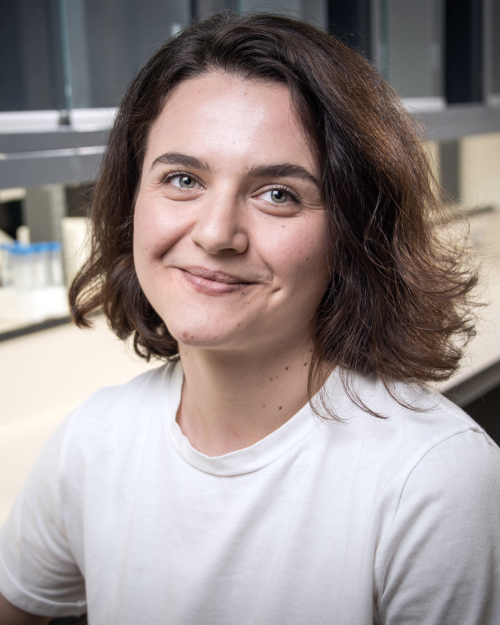 paula.lepine [at] mcgill.ca (Paula Lépine)
paula.lepine [at] mcgill.ca (Paula Lépine)
Research Assistant
"I feel lucky to be part of a great team of researchers coming from different backgrounds and who all work towards the same goal: finding new solutions to improve patients’ quality of life."
"J’apprécie beaucoup faire partie d’une communauté scientifique exceptionnellement riche formée par des chercheurs et chercheuses venant du monde entier."
Watch Paula's Spotlight Video
Read Paula's biography
I received my master’s degree from Université de Montréal in Neuroscience with the focus on Neuro-Immunology. Upon graduation, I started working at CRCHUM where I expanded my knowledge of histology, cell culture, and flow cytometry. Later on, I joined the Neuro’s EDDU where I help other researchers analyze their organoids through cryosectioning. I am also a part of the organoid generation team where alongside other team members I oversee the production of numerous brain organoids.
Selected publications
- Mohamed NV, Sirois J, Ramamurthy J, Mathur M, Lépine P, Deneault E, Maussion G, Nicouleau M, Chen CXQ, Abdian N, Soubannier V, Cai E, Nami H, Thomas RA, Tabatabaei M, Beitel LK, Singh Dolt K, Karamchandani J, Kunath T, Fon EA, Durcan TM (2021) Midbrain organoids with an SNCA gene triplication model key features of synucleinopathy. In press in Brain Communications. Preprint available: https://doi.org/10.1101/2021.04.12.439480
- Imanbekova M, Suarasan S, Rojalin T, Mizenko R, Hilt S, Mathur M, Lépine P, Nicouleau M, Mohamed NV, Durcan TM, Carney RP, Voss JC, and Wachsmann-Hogiu S. (2021) Identification of amyloid beta in small extracellular vesicles via Raman spectroscopy. Nanoscale Advances, doi: http://doi.org/10.1039/D1NA00330E.
- Mohamed NV, Lépine P, Lacalle-Aurioles M, Sirois J, Mathur M, Reintsch W, Beitel LK, Fon EA, Durcan TM.( 2021) Microfabricated disk technology: rapid scale up in midbrain organoid generation. Methods, doi: https://doi.org/10.1016/j.ymeth.2021.07.008
- Zhang I, Lépine P, Han C, Lacalle-Aurioles M, Chen CX, Haag R, Durcan TM, Maysinger D. (2020) Nanotherapeutic Modulation of Human Neural Cells and Glioblastoma in Organoids and Monocultures. Cells, doi: https://doi.org/10.3390/cells9112434
- Masaki K, Sonobe Y, Ghadge G, Pytel P, Lépine P, Pernin F, Cui QL, Antel JP, Zandee S, Prat A, Roos RP. (2020) RNA-binding protein altered expression and mislocalization in MS. Neurol Neuroimmunol Neuroinflamm. doi: https://doi.org/10.1212/NXI.0000000000000704
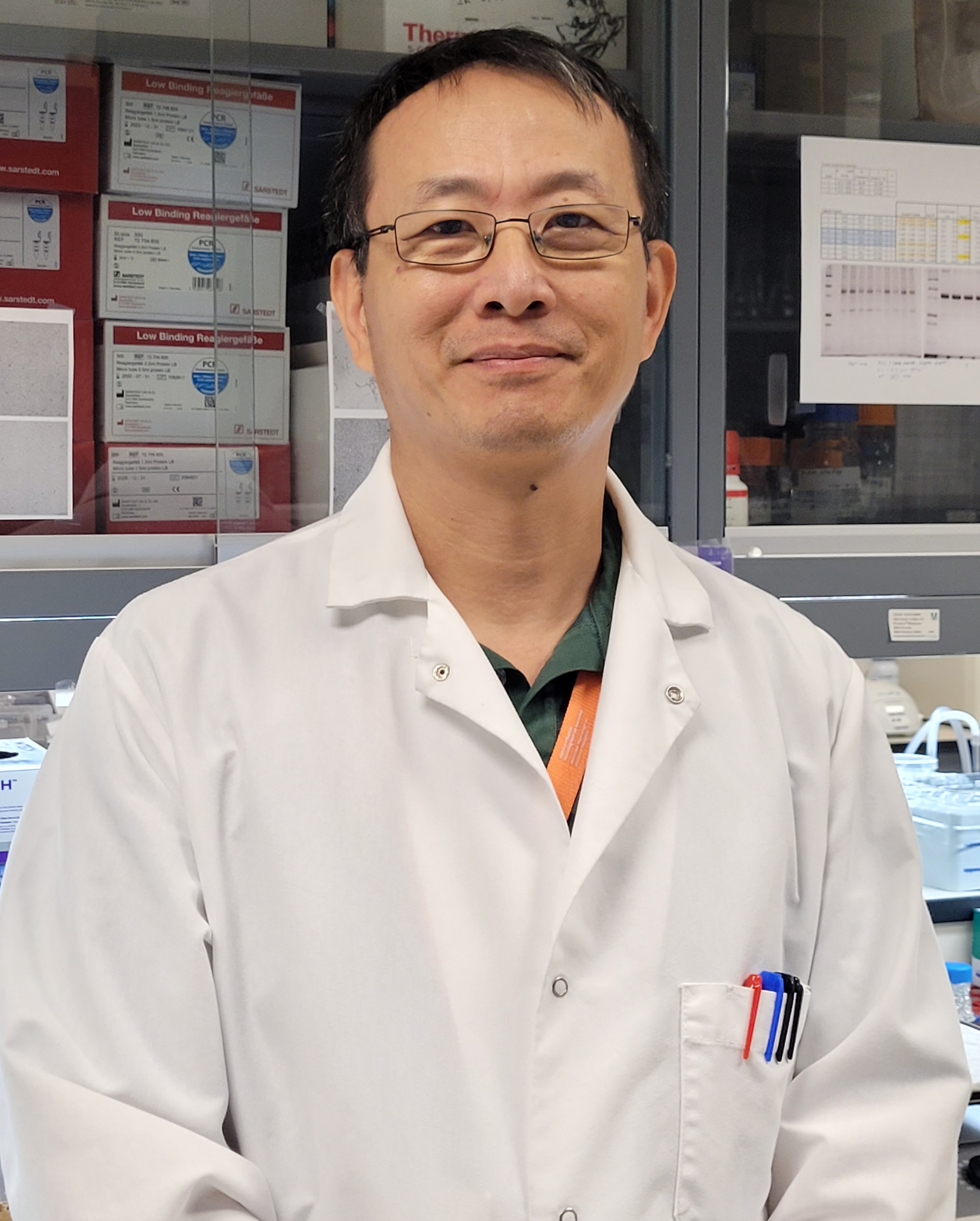 wen.luo2 [at] mcgill.ca (Wen Luo)
wen.luo2 [at] mcgill.ca (Wen Luo)
Research Assistant
"Finding new drugs for treating neural degeneration still remains a challenge even after four decades. I am proud of working at The Neuro with my expertise to support the PD research, and to facilitate drug discovery through providing high quality proteins to our research team and collaborative partners in Canada and abroad."
"过去四十年没能找到治疗神经退行性疾病的新药,是人类的一大挑战。在这个开放平台,通过我提供的纯化蛋白,促进基础研究和加快药物开发,我就倍感荣幸。"
Read Wen's biography
Before joining The Neuro in February 2017, I had more than two decades of bench work experience in purification and characterization of proteins/enzymes of various origins (for bioconversion of lignocelluloses, indoor airborne allergen monitoring, antibody generation, and cancer treatment drug discovery), as well as in development and Taguchi-based optimization of immunoassays (for quantitation of indoor fungal allergens or cancer biomarkers using sandwich ELISA, high-throughput microarrays, etc.). Over the past twenty years, though the misfolded alpha-synuclein has been implied to play a role in Parkinson disease (PD), there are still some gaps in our knowledge and challenges in finding pharmaceuticals to treat neurodegenerative diseases. Providing high quality purified proteins of interest is my essential task and effective support for our research team and collaboration partners in fighting against PD and other diseases.
Selected publications
- Benjamin Feller, Aurélie Fallon, Wen Luo, Phuong Trang Nguyen, Irina Shlaifer, Alfred Kihoon Lee, Samer Karkout, Steve Bourgault, Thomas M Durcan, Hideto Takahashi (2023). α-synuclein preformed fibrils bind to β-neurexins and impair β-neurexin-mediated presynaptic organization. bioRxiv 2023.01.28.526024; doi: https://doi.org/10.1101/2023.01.28.526024
- Omid Tavassoly, Esther del Cid Pellitero, Frederique Larroquette, Eddie Cai, Rhalena A. Thomas, Vincent Soubannier, Wen Luo, Thomas M. Durcan, Edward A. Fon (2021) Pharmacological Inhibition of Brain EGFR Activation By a BBB-penetrating Inhibitor, AZD3759, Attenuates α-synuclein Pathology in a Mouse Model of α-Synuclein Propagation. Neurotherapeutics (IF7.62), DOI: 10.1007/s13311-021-01017-6
- Wen Luo, Mateu Pla-Roca and David Juncker. (2011) Taguchi design-based optimization of sandwich immunoassay microarrays for detecting breast cancer biomarkers. Analytical Chemistry. 83:5767-5774.
- Wen Luo, Aaron M. Wilson and J. David Miller (2010) Characterization of a 52 kDa exoantigen of Penicillium chrysogenum and monoclonal antibodies suitable for its detection. Mycopathologia 169:15-26.
- Aaron M. Wilson, Wen Luo and J. David Miller (2009) Using human sera to identify a 52-kDa exoantigen of Penicillium chrysogenum and implications of polyphasic taxonomy of anamorphic Ascomycetes in the study of antigenic proteins. Mycopathologia 168:213-226.
 gilles.maussion [at] mcgill.ca (Gilles Maussion)
gilles.maussion [at] mcgill.ca (Gilles Maussion)
Research Associate
"I am convinced that combining clinical and fundamental research as we do at The Neuro will allow researchers to improve our current understanding of neurological and psychiatric diseases toward better healthcare and treatments for patients."
"Travaillant dans un lieu qui combinent des services de soins et laboratoires de recherche, j’espère faire avancer notre compréhension des maladies du neurodéveloppement afin que l’on puisse proposer aux patients et à leur proches un traitement et une meilleure qualité de vie."
View Gilles's PubMed
Read Gilles's biography
Over the past fifteen years, I have been working on understanding the cellular and molecular causes of neurological and psychiatric diseases. In 2008, at the University René Descartes, Paris, France, I completed a PhD focused on (i) the molecular deregulation observed in post-mortem brain tissue from patients diagnosed with Autistic Spectrum Disorders and (ii) the subcellular mechanisms that are potentially affected by this deregulation. In 2009, I joined the McGill Group for Suicide Studies as a postdoctoral fellow, where I analyzed epigenetic modifications, microRNA and non-coding RNA expression potentially related to suicidal behaviours using post-mortem brain samples. Since January 2012, through my research activity in the McGill Psychiatric Genetics Group, I became interested in the field of induced pluripotent stem cells (iPSCs) as a tool to elucidate the molecular causes of developmental disorders. Using embryonically derived stem cells, I studied events occurring early in life that are required for proper differentiation into neurons. Since January 2017, as a research associate at the Neuro's Early Drug Discovery Unit, I have managed projects related to intellectual disabilities, while specializing in generating and characterizing iPSC-derived neurons and astrocytes to further investigate neurodevelopmental disease.
Selected publications
-
Maussion, G*., Thomas, RA.*, Demirova, I., Gu, G., Cai, E., Chen, C. X., Abdian, N., Strauss, T., Kelaï, S., Nauleau-Javaudin, A., Beitel, L. K., Ramoz, N., Gorwood, P., Durcan, T. M. Auto-qPCR; a python-based web app for automated and reproducible analysis of qPCR data. Sci Rep 11, 21293 (2021). https://doi.org/10.1038/s41598-021-99727-6
-
Maussion G, Rocha C, Beitel L.K., Durcan T.M. (2019) Patient-derived stem cells, another in vitro model or the missing link towards novel therapies for Autism Spectrum Disorders? Mini-review Front Pediatr. Jun 6;7:225.
-
Bell S*, Maussion G*, Jefri M, Peng H, Theroux JF, Silveira H, Soubannier V, Wu H, Hu P, Galat E, Torres-Platas SG, Boudreau-Pinsonneault C, O'Leary LA, Galat V, Turecki G, Durcan TM, Fon EA, Mechawar N, Ernst C (2018) Disruption of GRIN2B Impairs Differentiation in Human Neurons. Stem Cell Reports 11:183-196.
-
Maussion G*, Diallo AB*, Gigek CO, Chen ES, Crapper L, Theroux JF, Chen GG, Vasuta C, Ernst C (2015) Investigation of genes important in neurodevelopment disorders in adult human brain. Hum Genet 134:1037-1053.
-
Maussion G, Yang J, Suderman M, Diallo A, Nagy C, Arnovitz M, Mechawar N, Turecki G (2014) Functional DNA methylation in a transcript specific 3'UTR region of TrkB associates with suicide. Epigenetics 9:1061-1070.
-
Labonte B, Suderman M, Maussion G, Navaro L, Yerko V, Mahar I, Bureau A, Mechawar N, Szyf M, Meaney MJ, Turecki G (2012) Genome-wide epigenetic regulation by early-life trauma. Arch Gen Psychiatry 69:722-731.
*These authors contributed equally.
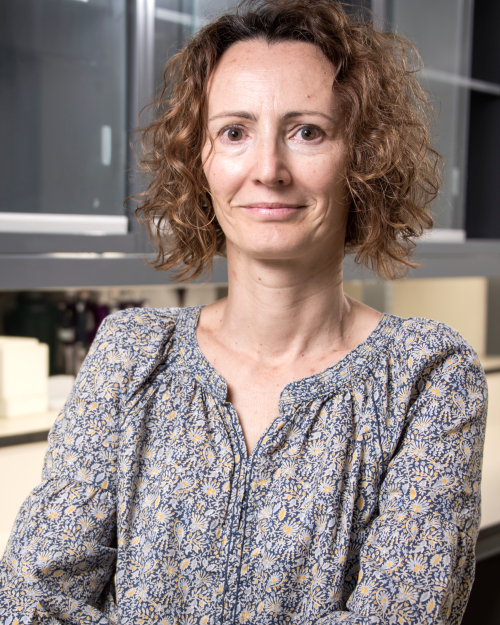 emmanuelle.nguyen-renou [at] mcgill.ca (Emmanuelle Nguyen-Renou)
emmanuelle.nguyen-renou [at] mcgill.ca (Emmanuelle Nguyen-Renou)
Research Assistant
"Working at The Neuro is a privilege because we work directly with biological material coming from healthy or sick patients."
"Travailler au Neuro est un privilege car nous travaillons directement avec du materiel biologique provenant des patients sains ou malades."
Read Emmanuelle's biography
I have a master’s degree of Cellular Biology (Immnuology) and a postgraduate degree of Biology and Pharmacology of Aging. I start to work in Paris in pharmaceutical industry (SANOFI) for 10 years in the neurodegenerative disease service where I studied ischemia and trauma in rat models, then in the Oncology service working on telomerase and cell senescence. I moved to Marseille (France) for public institute (Inserm) where I worked for 1 year on Huntington's disease and RNA interference. I left France for Singapore where I worked for 5 years in MBI (Mechanobiology institute) in the regenerative nanomedicine service first, and then in cell adhesion and mechanics service to study dynamics of epithelial cell-cell junctions. I joined The Neuro in Montreal (Canada) in March 2017 in the neurodegenerative disorders service to work on Parkinson’s disease.
Selected publications
- Yian Yang, Emmanuelle Nguyen, Gautham Hari Narayana Sankara Narayana, Melina Heuzé, René-Marc Mège, Benoit Ladoux, Michael P. Sheetz (2021) Local Contractions Regulate E-Cadherin Adhesions, Rigidity Sensing and Epithelial Cell Sorting BioRxiv. Preprint available: https://doi.org/10.1101/318642
- Plestant C, Strale PO, Seddiki R, Nguyen E, Ladoux B, Mège RM. (2014) Adhesive interactions of N-cadherin limit the recruitment of microtubules to cell-cell contacts through organization of actomyosin. J Cell Sci.
- Riou J.F., Guittat L., Mailliet P., Laoui A., Renou E., Petitgenet O., Megrin-Chanet F., Helene C. and Mergny J.L. (2002) Cell senescence and telomere shortening induced by a new series of G-quadruplex DNA ligands. PNAS.
- Wahl F., Renou E., Mary V., and Stutzmann J-M. (1997) Riluzole reduces brain lesions and improves neurological function in rats after a traumatic brain injury. Brain Res.
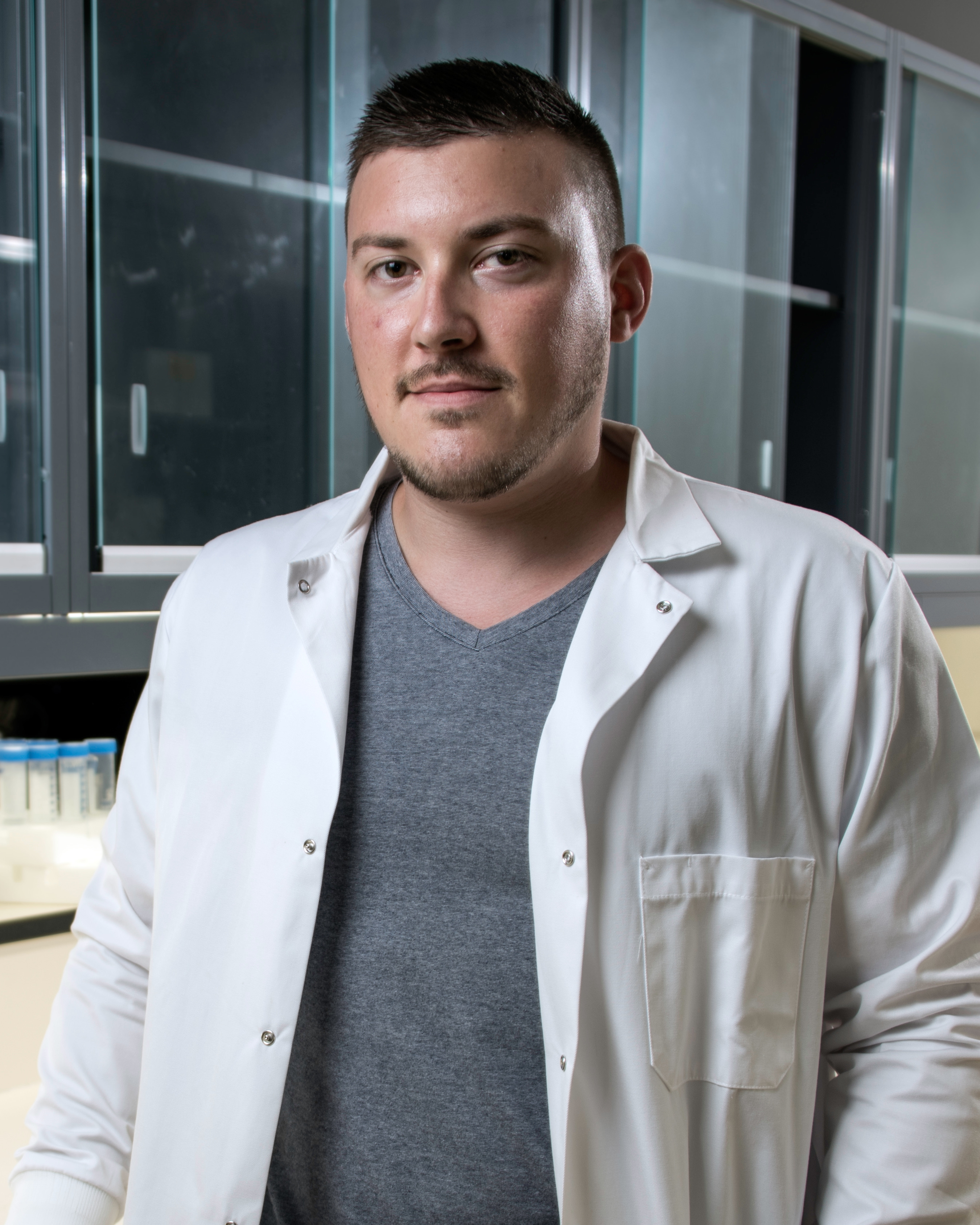 michael.nicouleau [at] mcgill.ca (Michael Nicouleau)
michael.nicouleau [at] mcgill.ca (Michael Nicouleau)
Research Technician
"The Neuro is an exceptional place allowing interaction between patients, physicians, and researchers. Such synergy between research and clinical practice help to better understand diseases and lead to the emergence of new treatments."
"The Neuro est un lieu exceptionnel qui permet une interaction entre patients, médecins et chercheurs. Cette synergie entre recherche et clinique favorise la compréhension des maladies et l’émergence de nouveau traitements."
Watch Michael's Spotlight Video
Read Michael's biography
I am a Research Assistant whose main activity is to help on the genetic side such as creating, validating ,and characterizing new cell lines; this is the first step for the generation of new models to study neurodegenerative disorders. Before starting at The Neuro, I spent 9 years in several research groups in France and in the US where I studied distinct human diseases, from nephrology to ophthalmology and cerebellar malformations. Using a recent high-throughput sequencing approach, I participated in the identification and characterization of novel genes and mutations associated with rare genetic diseases. Over the past 5 years, I have focused on brain pathologies using multiple models such as mouse, human stem cells, and iPSC-derived 3D-organoids. When not travelling, I enjoy going on hikes, riding motorcycles, and dreaming of my next adventure.
Selected publications
- Chemin J, Siquier-Pernet K, Nicouleau M, et al. De novo mutation screening in childhood-onset cerebellar atrophy identifies gain-of-function mutations in the CACNA1G calcium channel gene. Brain. 2018;141(7):1998-2013. doi:10.1093/brain/awy145
- Medina-Cano, D., Ucuncu, E., Nguyen, L. S., Nicouleau, M., Lipecka, J., Bizot, J. C., Thiel, C., Foulquier, F., Lefort, N., Faivre-Sarrailh, C., Colleaux, L., Guerrera, I. C., & Cantagrel, V. (2018). High N-glycan multiplicity is critical for neuronal adhesion and sensitizes the developing cerebellum to N-glycosylation defect. eLife, 7, e38309. https://doi.org/10.7554/eLife.38309
- Stessman, Holly A F et al. “Disruption of POGZ Is Associated with Intellectual Disability and Autism Spectrum Disorders.” American journal of human genetics vol. 98,3 (2016): 541-552. doi:10.1016/j.ajhg.2016.02.004
- Megahed H, Nicouleau M, Barcia G, et al. Utility of whole exome sequencing for the early diagnosis of pediatric-onset cerebellar atrophy associated with developmental delay in an inbred population. Orphanet J Rare Dis. 2016;11(1):57. Published 2016 May 4. doi:10.1186/s13023-016-0436-9
- Perrault, I., Hanein, S., Zanlonghi, X., Serre, V., Nicouleau, M., Defoort-Delhemmes, S., Delphin, N., Fares-Taie, L., Gerber, S., Xerri, O., Edelson, C., Goldenberg, A., Duncombe, A., Le Meur, G., Hamel, C., Silva, E., Nitschke, P., Calvas, P., Munnich, A., Roche, O., … Rozet, J. M. (2012). Mutations in NMNAT1 cause Leber congenital amaurosis with early-onset severe macular and optic atrophy. Nature genetics, 44(9), 975–977. https://doi.org/10.1038/ng.2357
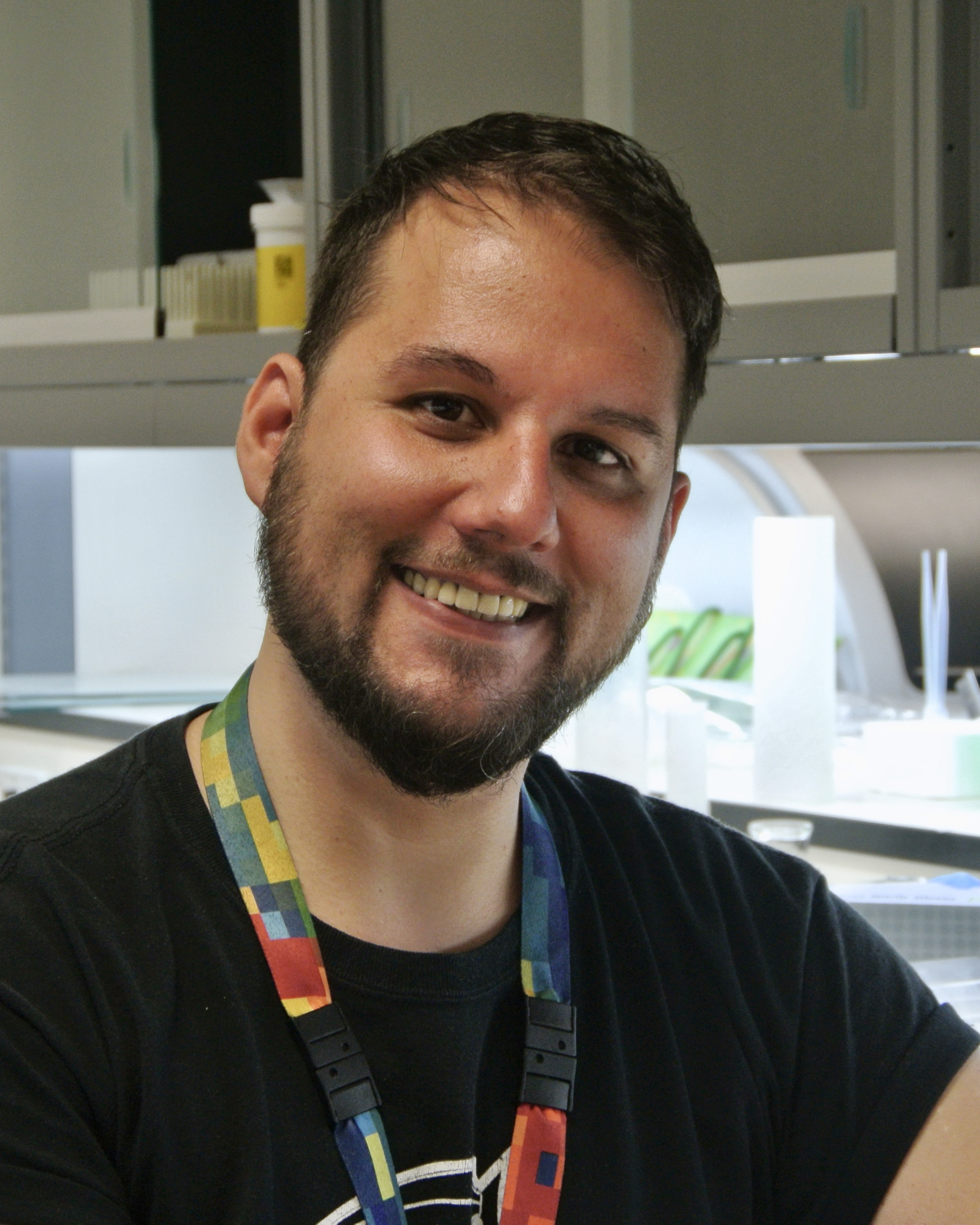 valerio.piscopo [at] mcgill.ca (Valerio Piscopo)
valerio.piscopo [at] mcgill.ca (Valerio Piscopo)
Research Associate
"I am proud of being a part of one of the world’s leading centres in Neuroscience. This institute is a stimulating environment and the people working here are a big family."
"Il cervello umano è una macchina affascinante e comprendere il suo funzionamento è di vitale importanza per l’avanzamento della Scienza. Il Neuro è senza dubbio uno dei principali centri a livello mondiale di Neuroscienze e per questo motivo sono fiero di esserne parte."
Watch Valerio's Spotlight Video
Read Valerio's biography
I graduated in Naples, Italy in Medical Biotechnology and immediately after I joined the Physiology program of the PhD course in Applied Biology, working at the National Research Council where I became interested in Developmental Neurobiology that remains my main focus. After my PhD, I moved to Montreal, and started work at the MNI where I have been working on Glioblastoma stem cell biology with Dr. Stefano Stifani. Finally, I joined the Neuro's EDDU where I am mainly focusing on the differentiation of oligodendrocytes from human iPSCs.
Selected publications
- Kulasekaran G., Chaineau M., Piscopo V., Verginelli F., Fotouhi M., Girard M., Tang Y., Dali R., Lo R., Stifani S. and McPherson P.(2021) An Arf/Rab cascade controls the growth and invasiveness of glioblastoma J Cell Biol. doi: 10.1083/jcb.202004229.
- Rosmaninho P., Mükusch S., Piscopo V., Teixeira V., Raposo A.A., Warta R., Bennewitz R., Tang Y., Herold-Mende C., Stifani S., Momma S., Castro D.S. (2018) Zeb1 potentiates genome-wide gene transcription with Lef1 to promote glioblastoma cell invasion. EMBO Journal 10.15252/embj.201797115
- Bellenchi G., Volpicelli F., Piscopo V., Perrone-Capano C. and di Porzio U. (2012) Adult neural stem cells: an endogenous tool to repair brain injury? Journal of Neurochemistry (2012) 10.1111/jnc. 1208
 cecilia.rocha [at] mcgill.ca (Cecilia Rocha)
cecilia.rocha [at] mcgill.ca (Cecilia Rocha)
Research Associate
"I am fascinated by the Nervous System, so it is great to be able to work at the Neuro where I have the opportunity to collaborate with neuroscientists from all over the globe offering expertise and learning new techniques to produce groundbreaking work."
"Estudar o Sistema Nervoso sempre me fascinou, entao é uma enorme satisfacao poder trabalhar no Neuro com pesquisadores de todas as partes do mundo onde eu posso contribuir com a minha experiencia e continuar aprendendo novas tecnicas produzindo ciencia de alta qualidade."
View Cecilia's Linkedin
Watch Cecilia's Spotlight Video
Read Cecilia's biography
I am Brazilian born in Rio de Janeiro and raised just across the bridge in the most beautiful city in the world, Niteroi. I always loved science and travelling so I naturally moved to the second most pretty city in the world, Paris, to do my PhD studying cellular cytoskeleton alterations in cancer cells. But I was always very intrigued by neuronal morphology and freezing temperatures, so I came to Montréal to work on brain development research and enjoy the real winter wonderland.
Selected publications
- Maussion et al., 2019. Patient-Derived Stem Cells, Another in vitro Model, or the Missing Link Toward Novel Therapies for Autism Spectrum Disorders? Front. Pediatri: 6;7:225.
- Bosch Grau M et al., 2017. Alterations in the balance of tubulin glycylation and glutamylation in photoreceptors leads to retinal degeneration. J Cell Sci: 30: 938-949.
- Wieczorek M et al., 2016. The synthetic diazonamide DZ-2384 has distinct effects on microtubule curvature and dynamics without neurotoxicity. Sci Transl Med: 365ra159
- Rocha C et al., 2014. Tubulin glycylases are required for primary cilia, control of cellular proliferation and tumor development in colon. EMBO: 33: 2247-2250.
- Tort et al., 2014. The cytosolic carboxypeptidase family is dedicated to posttranslational removal of acidic amino acids. Mol Cell Biol: 25(19):3017-27.
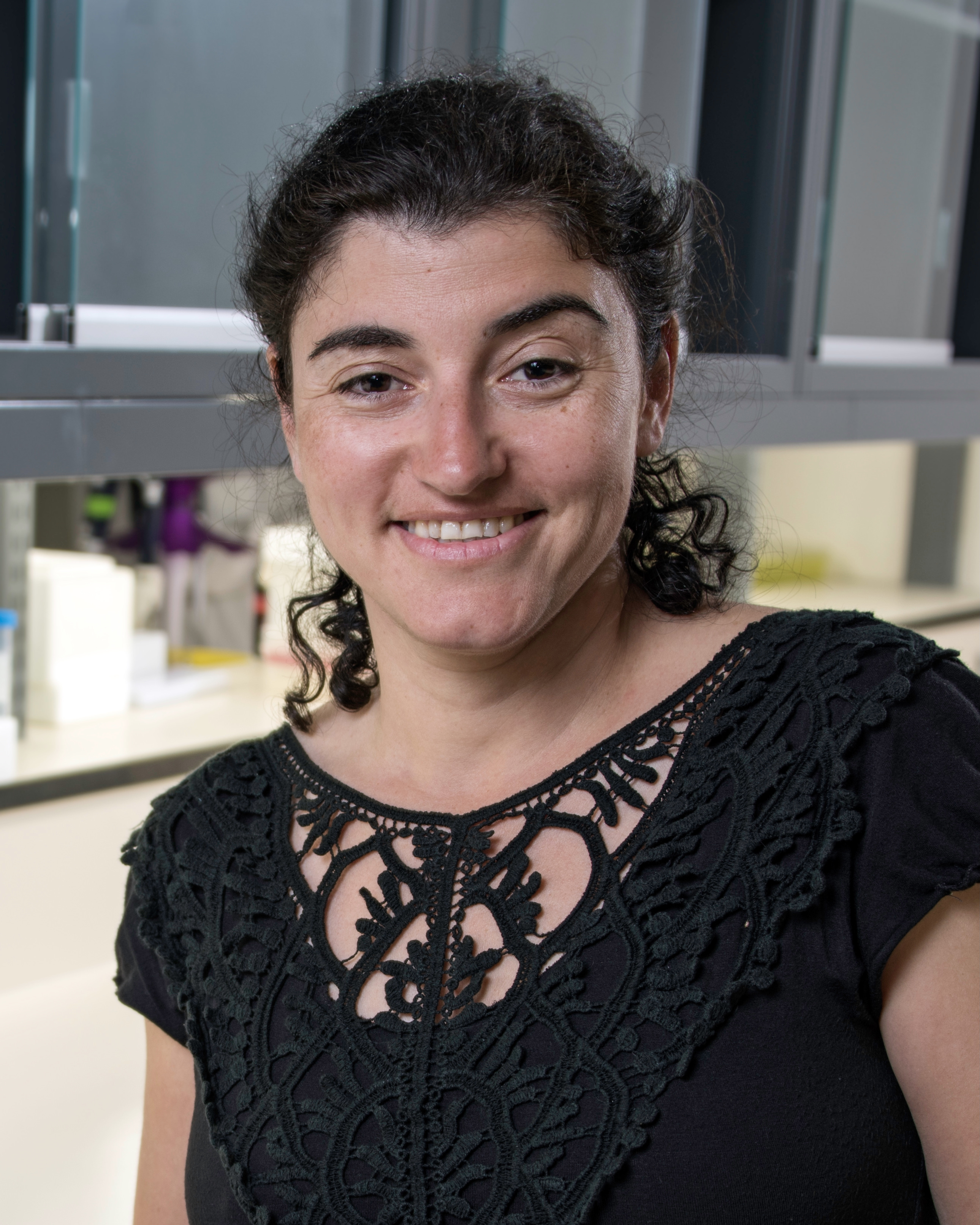 irina.shlaifer [at] mcgill.ca (Irina Shlaifer)
irina.shlaifer [at] mcgill.ca (Irina Shlaifer)
Research Technician
"I am very pleased and proud to be part of The Neuro research team that provides an excellent opportunity to explore brain’s mysterious nature and helps accelerate the discovery of therapies to treat patients suffering from devastating neurological diseases."
"אני מאוד שמחה וגאה להיות חלק מהצוות מדעי של הנוירו אשר מביא הזדמנות מצוינת לחקור את הטבע המסתורי של המוח ועוזר לקדם את גילוי התרפיות כדי לטפל בחולים אשר סובלים ממחלות נוירולוגיות קשות"
Read Irina's biography
Born in Ukraine and raised in a family of a physician and a science teacher, I always had a passion for biomedical science. Following the Chernobyl nuclear accident that occurred near my hometown, I moved to Israel where I completed my bachelor’s in medical laboratory sciences and MSc in Biotechnology at The Hebrew University of Jerusalem, focusing on delineating the structure and function of brain glutamate transporters. After working for several years in medical genetics and biotechnology research and development laboratories, I decided to realize my dream and immigrate to Canada together with my spouse and my two children. After completing my PhD in Biochemistry at Concordia University, I joined The Neuro in 2018. At the EDDU I have been working on generating and characterizing CRISPR knockout cell lines for the antibody validation platform and to model neurodegenerative diseases. Additionally, I am responsible for the generation and maintenance of IPSC-derived microglia from healthy individuals and ALS patients. I am also engaged in quality control characterization of alpha-synuclein preformed fibrils used in studies to model Parkinson’s disease. Since 2019, together with Luisa Pimentel, I co-coordinate the iPSC seminar series which gathers scientists working with IPSC technology in Montreal, Canada and beyond to share their cutting-edge research. I hope that all this exciting work will allow us to combat neurodegenerative diseases and bring a positive change to our world. Besides science, I love mother nature and love to garden colourful flowers and berries and to explore beautiful places around the globe.
Selected publications
- C. X-Q Chen, E. Deneault, N. Abdian, Z. You, J. Sirois, M. Nicouleau, I. Shlaifer, L. Villegas, M. N. Boivin, L. Gaborieau, J. Karamchandani, L.K. Beitel, E. A. Fon and T. M. Durcan. Generation of patient-derived pluripotent stem cell-lines and CRISPR modified isogenic controls with mutations in the Parkinson's associated GBA gene. Stem cell research (2022), 64, 102919. https://doi.org/10.1016/j.scr.2022.102919
- W. Alshafie, M. Fotouhi, I. Shlaifer, R. Ayoubi, A. M. Edwards, T. M. Durcan, P. S. McPherson and C. Laflamme. Identification of highly specific antibodies for Serine/threonine-protein kinase TBK1 for use in immunoblot, immunoprecipitation and immunofluorescence. (2022) F1000Research. 11, 977. https://doi.org/10.12688/f1000research.124632.2
- A. Bayati, E. Banks, C Han, W. Luo, W. E. Reintsch, C. E. Zorca, I. Shlaifer, E. Del Cid Pellitero, B. Vanderperre, H. M. McBride, E. A. Fon, T. M. Durcan and P. S. McPherson. Rapid macropinocytic transfer of α-synuclein to lysosomes. Cell reports (2022) 40, 3, 111102. https://doi.org/10.1016/j.celrep.2022.111102
- E. Deneault, M. Chaineau, M. Nicouleau, M. José Castellanos Montiel, A. Kristyna Franco Flores, G. Haghi, C. X-Q Chen, N. Abdian, I. Shlaifer, L.K. Beitel, T. M. Durcan. A streamlined CRISPR workflow to introduce mutations and generate isogenic iPSCs for modeling amyotrophic lateral sclerosis, Methods (2021), doi: https://doi.org/10.1016/j.ymeth.2021.09.002
- I. Shlaifer, P. K. Quashie, H. Y. Kim and J. L. Turnbull Biochemical Characterization of TyrA Enzymes From Ignicoccus hospitalis and Haemophilus influenzae: A comparative study of the bifunctional and monofunctional dehydrogenase forms. Biochim. Biophys. Acta (2017) 1856, 312-320.
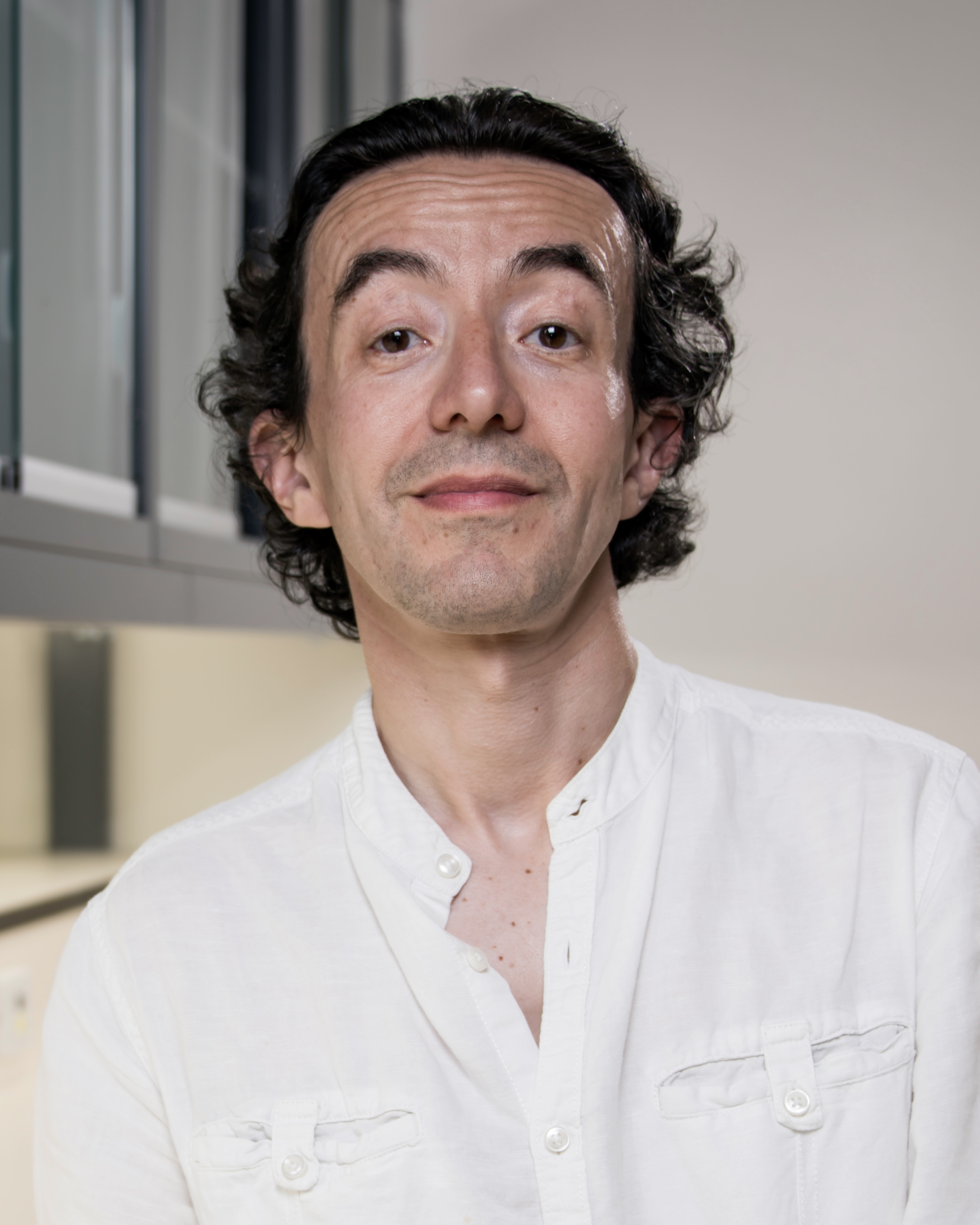 vincent.soubannier [at] mcgill.ca (Vincent Soubannier)
vincent.soubannier [at] mcgill.ca (Vincent Soubannier)
Research Associate
"Working at The Neuro gives me the chance to work in an environment of excellence and to use cutting-edge technology to study human diseases. The institute is a perfect place for providing a multitude of learning opportunities, as well as mentoring and coaching others."
"Travailler au Neuro me donne la chance de travailler dans un environnement d'excellence et d'utiliser une technologie de pointe afin d’étudier des maladies humaines. L'institut est un lieu idéal pour offrir une multitude de possibilités d'apprentissage, ainsi que pour enseigner et encadrer les autres."
View Vincent's Linkedin
Read Vincent's biography
I studied biochemistry at University of Bordeaux and obtained a Ph.D. in biological and Medical sciences in 2002, studying the structure of the mitochondrial ATP synthase. I studied how the oligomerization of the enzyme drives the tubulation of inner membranes. I then worked as a post-doc in Munich, at the Butenandt Institute, where I identified the first molecular component of cristae junctions: structures present at the opening of the tubular shape of mitochondrial inner membrane. In 2006, I emigrated to Canada, in Ottawa, working as a post-doc on the newly discovered mitochondrial derived vesicles: a new cell pathway that we showed to be possibly implicated in Parkinson’s disease. This study raised my interest in the field of neuroscience and in 2011, I moved to Montreal and started to work as a research associate at the Montreal Neurological Institute. Notably, I contributed in clarifying the mechanisms that control normal mammalian nervous system development and today, I am involved in a large effort that aim to model Amyotrophic Lateral Sclerosis (ALS) using neural cells derived from human induced pluripotent stem cells (iPSCs).
Selected publications
- Methot L, Soubannier V, Hermann R, Campos E, Li S, Stifani S. Nuclear factor-kappaB regulates multiple steps of gliogenesis in the developing murine cerebral cortex. Glia. 2018 Dec;66(12):2659-2672.
- Soubannier V, Stifani S. Biomedicines. NF-κB Signalling in Glioblastoma. 2017 Jun 9;5(2). pii: E29. doi: 10.3390/biomedicines5020029. Review.
- McLelland GL, Soubannier V, Chen CX, McBride HM, Fon EA. Parkin and PINK1 function in a vesicular trafficking pathway regulating mitochondrial quality control. EMBO J. 2014 Feb 18;33(4):282-95.
- Soubannier V, McLelland GL, Zunino R, Braschi E, Rippstein P, Fon EA, McBride HM. A vesicular transport pathway shuttles cargo from mitochondria to lysosomes. Curr Biol. 2012 Jan 24;22(2):135-41. doi: 10.1016/j.cub.2011.11.057. Epub 2012 Jan 5
- Soubannier V, Rippstein P, Kaufman BA, Shoubridge EA, McBride HM. Reconstitution of mitochondria derived vesicle formation demonstrates selective enrichment of oxidized cargo. PLoS One. 2012;7(12):e52830
 sofiya.tsyplenkova [at] mail.mcgill.ca (Sofiya Tsyplenkova)
sofiya.tsyplenkova [at] mail.mcgill.ca (Sofiya Tsyplenkova)
Research Assistant
"The Neuro offers a unique environment for young scientists to work alongside true experts towards a mutual goal – improving our understanding of neurological conditions for the betterment of emerging therapies. Working at the EDDU is a privilege as it promotes collaboration with skilled researchers and provides access to cutting-edge technologies to accelerate fundamental research and the development of new techniques."
"Неврологический институт-госпиталь Монреаля предоставляет молодым учёным уникальную возможность работать бок о бок с ведущими научными сотрудниками ради достижения общей цели. Вместе мы расширяем наше понимание в области неврологических заболеваний для совершенствования новых методов лечения. EDDU способствует сотрудничеству с квалифицированными исследователями и предоставляет доступ к передовым технологиям для ускорения фундаментальных исследований, разработки и оптимизации новых методов. Вносить вклад в нашу научную команду – большая честь для меня."
View Sofiya's Linkedin
Read Sofiya's biography
Prior to joining the EDDU, Sofiya obtained her BSc and MSc in Microbiology and Immunology from McGill University studying mechanisms of iron uptake in murine hepatocytes at the Lady Davis Institute for Medical Research. Currently, Sofiya works at the IRCM satellite lab to develop iPSC-derived tissues.
Selected publications
- Tsyplenkova S, Charlebois E, Fillebeen C, Pantopoulos K. Excess of circulating apo-transferrin enhances dietary iron absorption. Blood. 2024; 10.1182/blood.2023022916
- Bigorra Mir M, Charlebois E, Tsyplenkova S, Fillebeen C, Pantopoulos K. Cardiac Hamp mRNA Is Predominantly Expressed in the Right Atrium and Does Not Respond to Iron. International Journal of Molecular Sciences. 2023; 10.3390/ijms24065163.
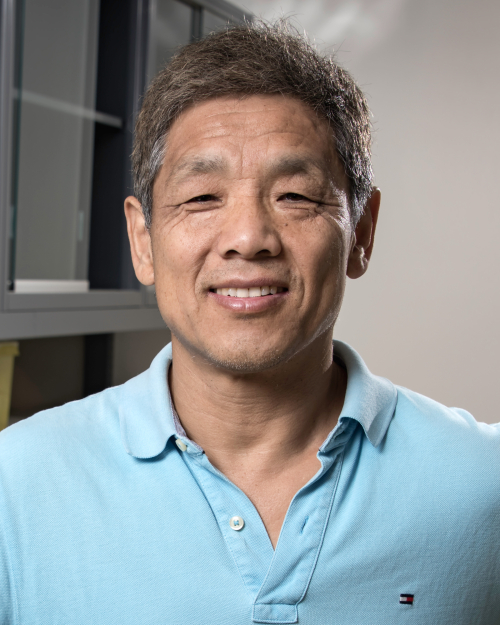 zhipeng.you [at] mcgill.ca (Zhipeng You)
zhipeng.you [at] mcgill.ca (Zhipeng You)
Research Associate
"The Neuro is one of the world’s best institutions for research. The inclusion, diversity, fairness, respect, and teamwork make me happy to work here."
"Neuro是世界上最好的研究机构之一,他的包容,多样性,公平,尊重和团队合作让我在这里工作愉快."
Watch Zhipeng's Spotlight Video
Read Zhipeng's biography
I have worked as a research associate since 2016 at the Neuro's EDDU and participated in setting up the cellular biobank here. My main responsibility is to provide various immortal cell lines (iPSC cell lines and cancer cell lines), in which disease relevant genes have been edited with the CRISPR-Cas9 gene editing tool. Meanwhile, I also generate iPSC cell lines from patients and healthy individuals for the cellular biobank using iPSC reprogramming methods.
Selected publications
- You Z, Al Kindi H, Abdul-Karim A, Barrette PO, Schwertani A. Blocking the urotensin II receptor pathway ameliorates the metabolic syndrome and improves cardiac function in obese mice. FASEB J. 2014 Mar;28(3):1210-20
- You Z, Liao M, Zhang H, Yang H, Pan X, Houghton JE, Sui SF, Tai PC. Phospholipids induce conformational changes of SecA to form membrane-specific domains: AFM structures and implication on protein-conducting channels. PLoS One. 2013 Aug 16;8
- You Z, Genest J Jr, Barrette PO, Hafiane A, Behm DJ, D'Orleans-Juste P, Schwertani AG. Genetic and pharmacological manipulation of urotensin II ameliorate the metabolic and atherosclerosis sequalae in mice. Arterioscler Thromb Vasc Biol. 2012 Aug;32(8)
- Armstrong GA, Liao M, You Z, Lissouba A, Chen BE, Drapeau P. Homology Directed Knockin of Point Mutations in the Zebrafish tardbp and fus Genes in ALS Using the CRISPR/Cas9 System. PLoS One. 2016 Mar 1;11(3)
TRAINEES
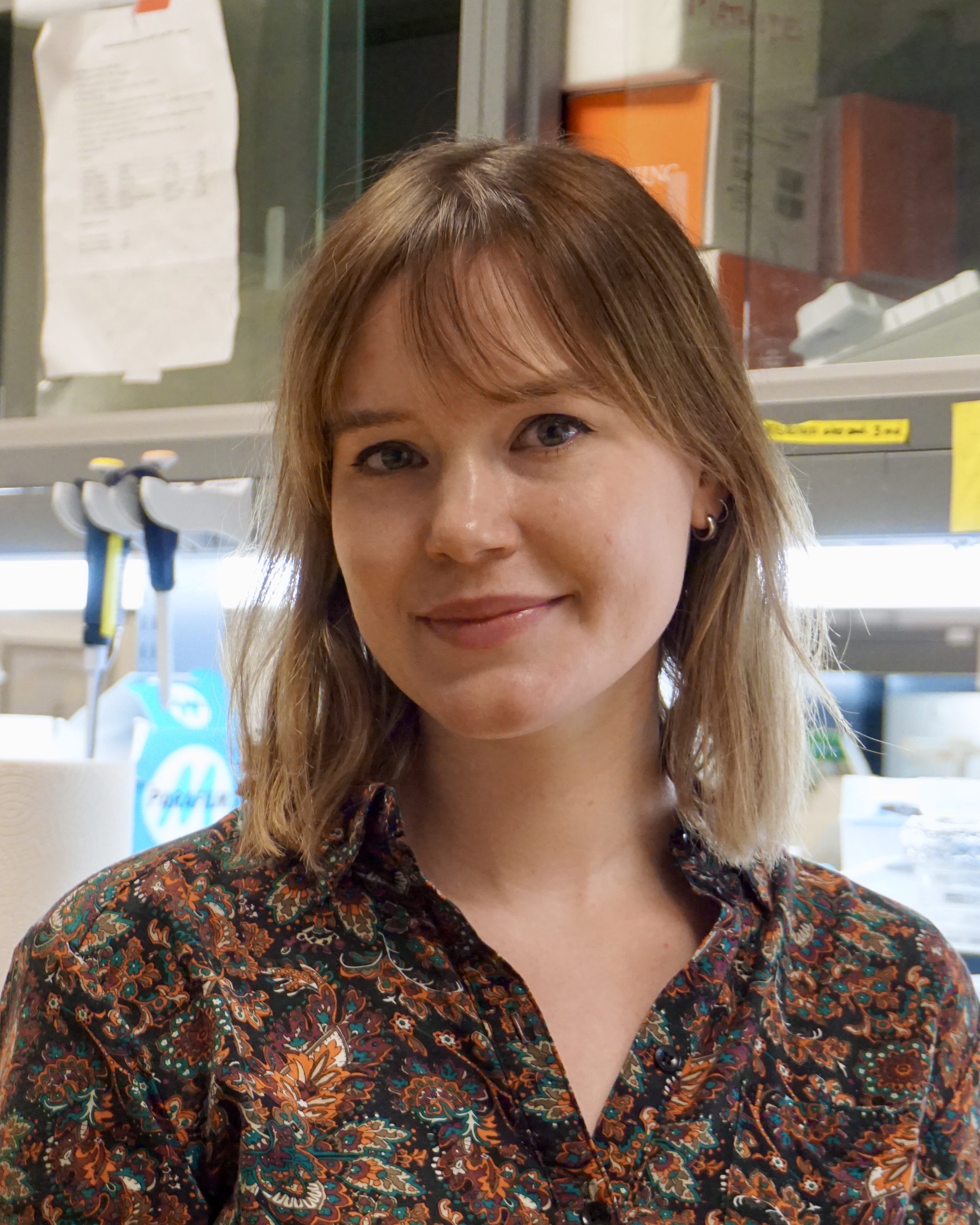 alexandra.chapleau [at] mail.mcgill.ca (Alexandra Chapleau)
alexandra.chapleau [at] mail.mcgill.ca (Alexandra Chapleau)
Graduate Student
"It is an incredible experience to witness the accelerating progression of neuroscience here at the EDDU. Working in such a collaborative environment has allowed me to improve and hone my skills as a researcher. Together, I believe we can make great strides in elucidating the mechanisms and developing treatments for neurodegenerative disorders."
"C'est une expérience incroyable d'observer la progression accélérée des neurosciences à l'EDDU. Travailler dans un environnement collaboratif a fait de moi un meilleur chercheuse. Ensemble, je crois que nous pouvons progresser dans l'élucidation des mécanismes et le développement de traitements pour les troubles neurodégénératifs."
View Alex's Linkedin
Read Alex's biography
From an early age, I have always held a profound interest in the subjects of neuroscience and genetics. Having grown up in a family affected by a rare neurodegenerative disease, it has been a lifelong ambition to research these orphan disorders and better bridge the “bench to beside” link. Prior to starting my PhD at McGill, I graduated from Queen’s University with a BSc in Biology. My PhD project involves investigating the pathophysiology of hypomyelinating leukodystrophies using patient-derived iPSC cellular models.
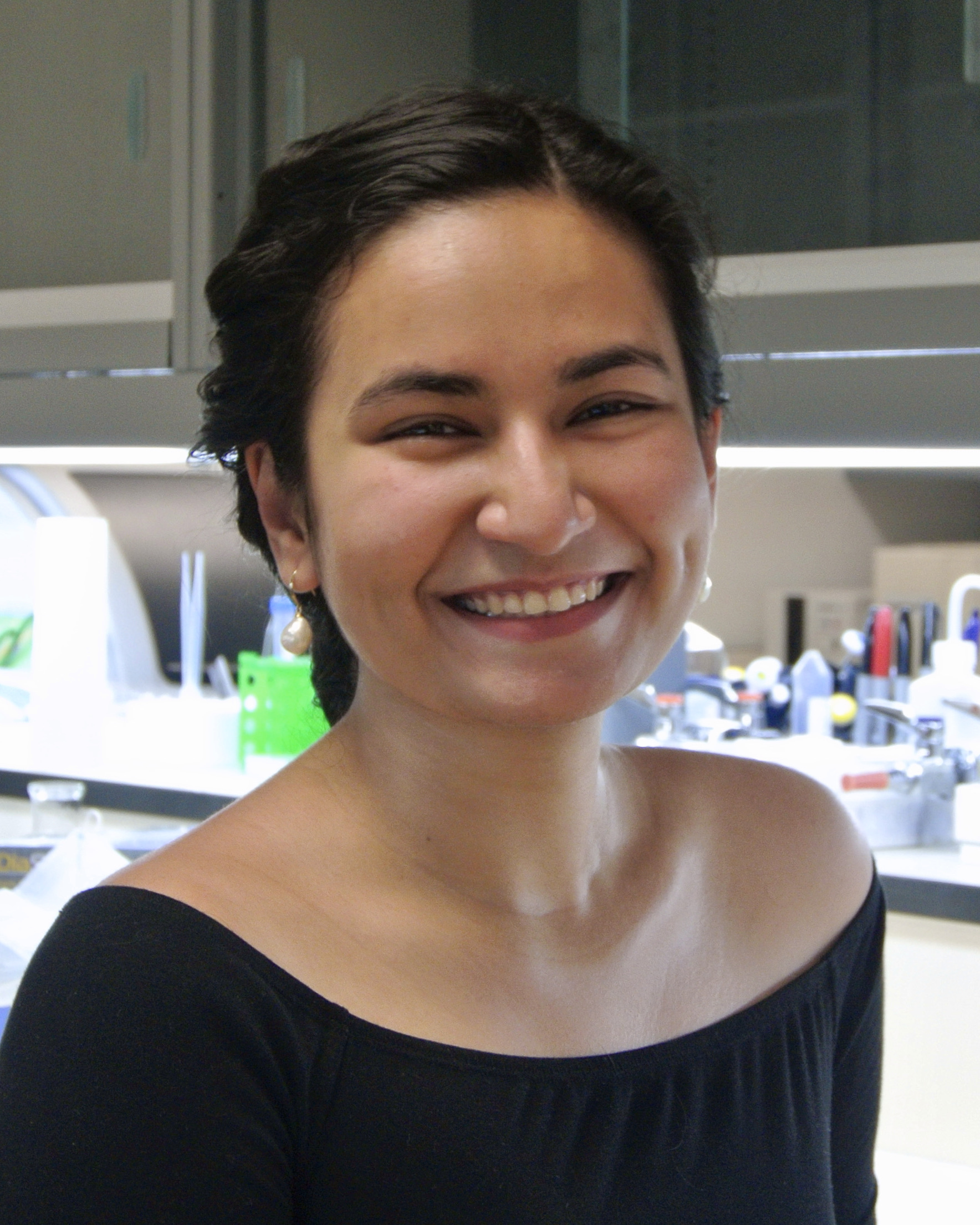 indra.roy [at] mail.mcgill.ca (Indra Roy)
indra.roy [at] mail.mcgill.ca (Indra Roy)
Graduate Student
"The Neuro is a multidisciplinary team with collaborations throughout Quebec and internationally. The EDDU has a world-class research infrastructure and consistently puts out high-quality research output, and I am proud to belong to the Neuro as an institution. I am inspired by my colleagues who come from a wide variety of backgrounds, both cultural and professional and provide many valuable perspectives according to their expertise."
"আমার Neuro-তে কাজ করতে ভাল লাগে, কারণ এখানে বিভিন্ন দক্ষতার মানুষের থেকে বিভিন্ন দৃষ্টিভঙ্গি পাওয়া যায়।."
View Indra's Linkedin and Research Gate
Read Indra's biography
I have a joint Masters in Translational Neuroscience from Charité Universitätsmedizin Berlin and Vrije Universiteit Amsterdam. Previously, I also worked as a Research Assistant at the Center for Prion and Protein Misfolding Diseases in Edmonton, Alberta. Earlier in my career, my interest was primarily in proteopathies in neurodegenerative disorders. During my Masters, my interest expanded to look at neuroimmunology as another potential piece of the neurodegenerative puzzle. During my thesis year, I learned about induced pluripotent stem cells (iPSCs) and organoids, and their potential as disease models. This brought me to The Neuro, where I hope to use iPSCs and organoids as tools to develop models of neurodegenerative disorders to study pathological mechanisms and identify potential therapeutic targets. I am invested in Open science because open communication with researchers across the globe can lead to streamlined progress in research. Hopefully, this will eventually lead to better treatment outcomes and increase the quality of life of patients, their loved ones, and caretakers.
AFFILIATE MEMBERS
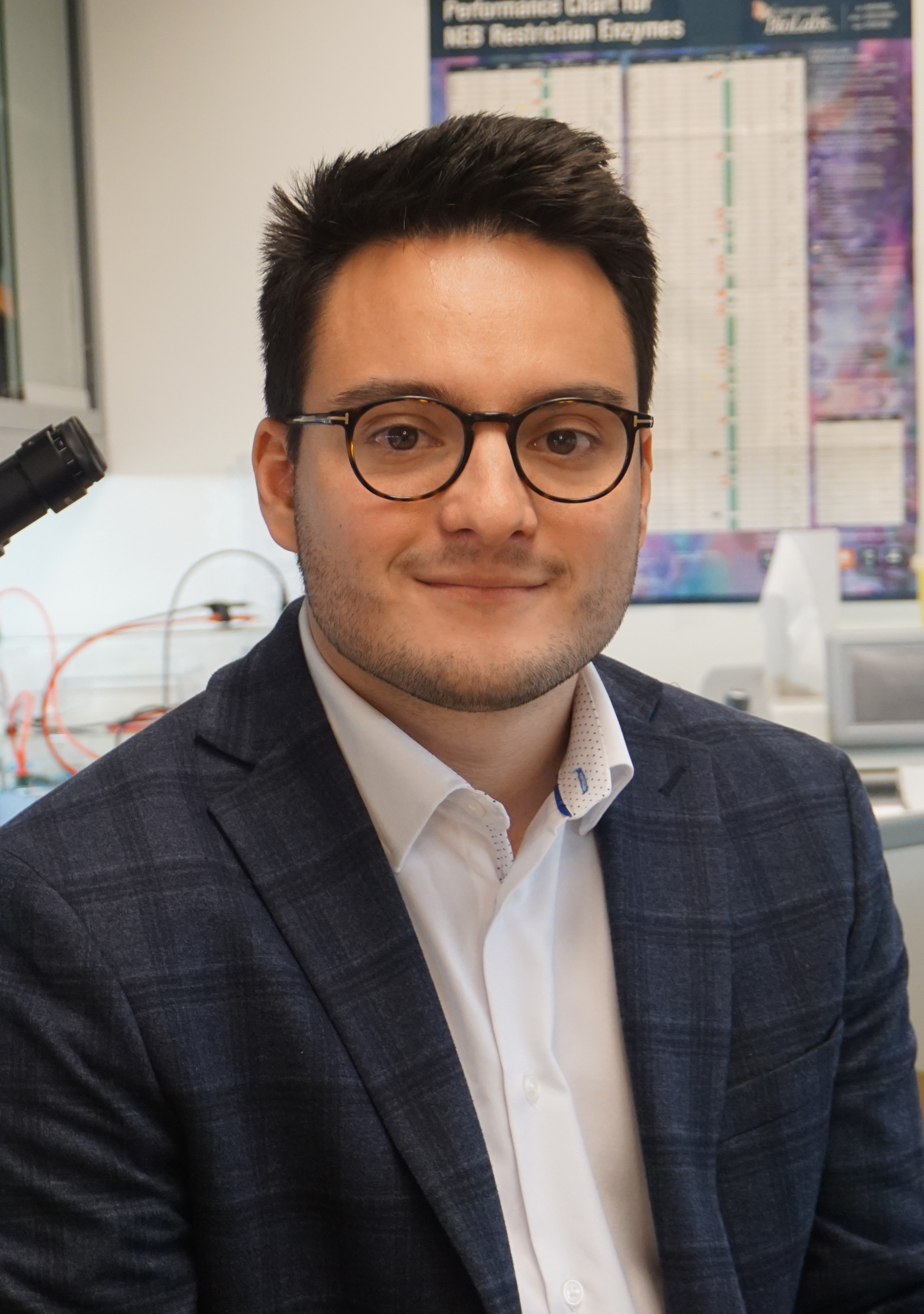 Nicolas Ferry
Nicolas Ferry
C-BIG Operations Manager
"The Neuro's worldwide influence and its involvement in major scientific discoveries over the decades have had a huge positive impact on my motivation to join in the adventure and ally myself with the researchers and clinicians who work there in harmony. I feel I'm being useful to society by trying to accelerate research, via Open Science, to develop new treatments for neurological disorders and directly benefit patients and their families."
"Le rayonnement mondial du Neuro et son implication dans des découvertes scientifiques majeures depuis des décennies ont eu un énorme impact positif sur ma motivation à participer à l’aventure et à m’allier aux chercheurs et cliniciens qui y travaillent en harmonie. J’ai l’impression d’être utile à la société en tentant d’accélérer la recherche, via la Science Ouverte, pour déveloper de nouveaux traitements des troubles neurologiques et bénéficier directement aux patients et à leur entourage."
View Nicolas' Linkedin
Read Nicolas' biography
Nicolas holds a Master of Science degree in "Biobanking and Complex Data Management" from the Université Côte d'Azur in France and has always been fascinated by research and neuroscience. The desire to apply his biobanking skills and promote Open Science led him to complete an internship at C-BIG before becoming a Research Assistant in January 2023. Nicolas is currently in charge of requests for access to samples and data in the biobank, and responsible for multiple collaborations with various players inside and outside The Neuro.
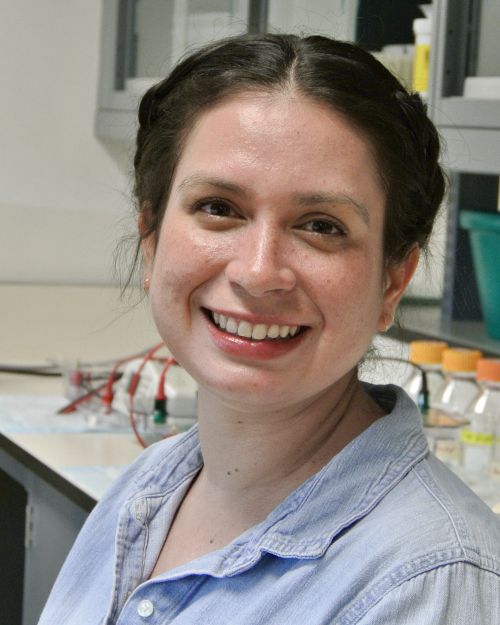 vanessa.omana [at] mcgill.ca (Vanessa Omana)
vanessa.omana [at] mcgill.ca (Vanessa Omana)
Research Assistant
"What I love about research is the process of working towards solving a problem and learning unexpected things along the way."
"Lo que me encanta de la investigacion es trabajar para resolver un problema y en el camino aprender cosas inesperadas."
View Vanessa's Linkedin and PubMed
Read Vanessa's biography
My scientific journey started with studying spinal cord injuries and antibody treatments for system inflammation. I worked as a Research Technician at the Krembil Research Institute, University Health Network, in Toronto for 8 years, focusing on the assessment of novel therapeutics and diagnostics for Parkinson’s disease in rodents and non-human primate models. I have an M.Sc. in Immunology from Queen's University, where I studied predictive markers of atopic status in umbilical cord blood. I joined the EDDU organoids team in May 2021.
Selected publications
- Koprich JB, Johnston TH, Reyes G, Omana V, Brotchie JM. (2016). Towards a Non-Human Primate Model of Alpha-Synucleinopathy for Development of Therapeutics for Parkinson's Disease: Optimization of AAV1/2 Delivery Parameters to Drive Sustained Expression of Alpha Synuclein and Dopaminergic Degeneration in Macaque. PLoS One. 2016 Nov 30;11(11).
- Bao, F, Shultz, SR, Hepburn, JD, Omana, V, Weaver, LC, Cain, DP, Brown, A. (2012). A CD11d monoclonal antibody treatment reduces tissue injury and improves neurological outcome after fluid percussion brain injury in rats. J. Neurotrauma. 2012 Sep 20;29(14):2375-92.
- Bao, F, Omana, V, Brown, A, Weaver, LC. (2012). The systemic inflammatory response after spinal cord injury in the rat is decreased by alpha4beta1 integrin blockade. J. Neurotrauma. 2012 May 20;29(8):1626-37.
- Shultz, SR, Bao, F, Omana, V, Chiu, C, Brown, A, Cain, DP. (2012). Repeated mild lateral fluid percussion brain injury in the rat causes cumulative long-term behavioral impairments, neuroinflammation, and cortical loss in an animal model of repeated concussion. J. Neurotrauma. 2012 Jan 20;29(2):281-94.
- Bao, F, Brown, A, Dekaban, GA, Omana, V, Weaver, LC. (2011). CD11d integrin blockade reduces the systemic inflammatory response syndrome after spinal cord injury. Exp. Neurol. 2011 Oct;231(2):272-83.
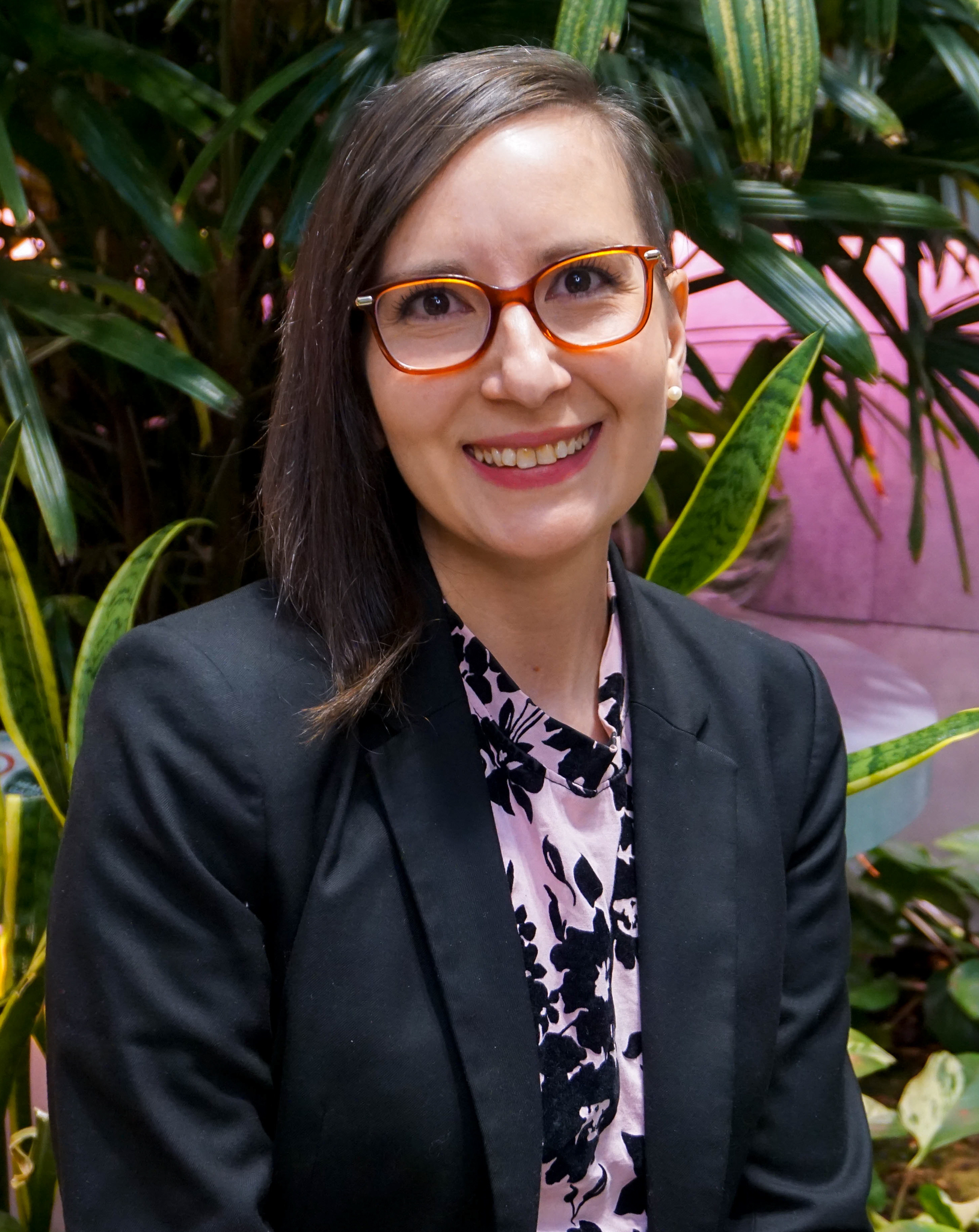 rhalena.thomas [at] mcgill.ca (Rhalena Thomas)
rhalena.thomas [at] mcgill.ca (Rhalena Thomas)
Research Associate
"To make progress in a world of ever-increasing scientific specialization, we need to increase our efforts towards open collaboration and the Neuro provides a stage for those collaborations to take place."
View Rhalena's Github
Read Rhalena's biography
I earned my BSc in Molecular Biology and Genetics from the University of Guelph, Ontario, Canada in 2004. I studied regulation of gene expression in yeast for my honours project at the University of Guelph with Dr. Joseph Yankulov. After travelling to Asia and working as an English teacher, I moved to Montreal and started to pursue an MSc. in Neuroscience at McGill University, working under the supervision of Dr. Philip Barker. I transferred to the PhD program and completed my PhD in Neuroscience in 2016. My thesis focused on two proteins, LGI1 and NgR1 and their functions in neuronal development and degeneration and their genetic links to epilepsy and schizophrenia. I joined Dr. Maurice Chacron in the McGill Department of Physiology as a postdoctoral researcher to work on systems neuroscience in 2017, gaining expertise in computational analysis. I joined Dr. Edward Fon’s group at the Neuro in 2018 to use a combination of computational analysis of biological systems, genetics and cell signalling to study Parkinson’s Disease. I am currently working on analyzing gene expression profiles of individual cells from human 3D tissue models (“mini-brains”) of Parkinson’s disease.
Selected publications
- Thomas, RA.*, Maussion, G.*, Demirova, I., Gu, G., Cai, E., Chen, C. X., Abdian, N., Strauss, T., Kelaï, S., Nauleau-Javaudin, A., Beitel, L. K., Ramoz, N., Gorwood, P., Durcan, T. M. Auto-qPCR; a python-based web app for automated and reproducible analysis of qPCR data. Sci Rep 11, 21293 (2021). https://doi.org/10.1038/s41598-021-99727-6
- Mohamed NV, Sirois J, Ramamurthy J, Mathur M, Lepine P, Deneault E, Maussion G, Nicouleau M, Chen CX, Abdian N, Soubannier V, Cai, E, Nami, H., Thomas, RA, Beitel, LK, Dolt, K.S., Karamchandani, J, Kunath, K., Fon, EA, Durcan, TM. (2021) Midbrain organoids with an SNCA gene triplication model key features of synucleinopathy. BrainComm. Preprint available: https://www.biorxiv.org/content/10.1101/2021.04.12.439480v1
- Chen CX, Abdian N, Maussion G, Thomas RA, Demirova I, Cai E, Tabatabaei M, Beitel LK, Karamchandani J, Fon EA, Durcan TM.A Multistep Workflow to Evaluate Newly Generated iPSCs and Their Ability to Generate Different Cell Types. (2021) Methods Protocols.
- Thomas RA, Metzen MG, Chacron MJ. Weakly electric fish distinguish between envelope stimuli arising from different behavioral contexts. (2018) Journal of Experimental Biology.
- Thomas RA, Gibon J, Chen CX, Chierzi S, Soubannier VG, Baulac S, Séguéla P, Murai K, Barker PA. (2018) The Nogo receptor ligand LGI1 regulates synapse number and synaptic activity in hippocampal and cortical neurons. Eneuro.
PAST MEMBERS
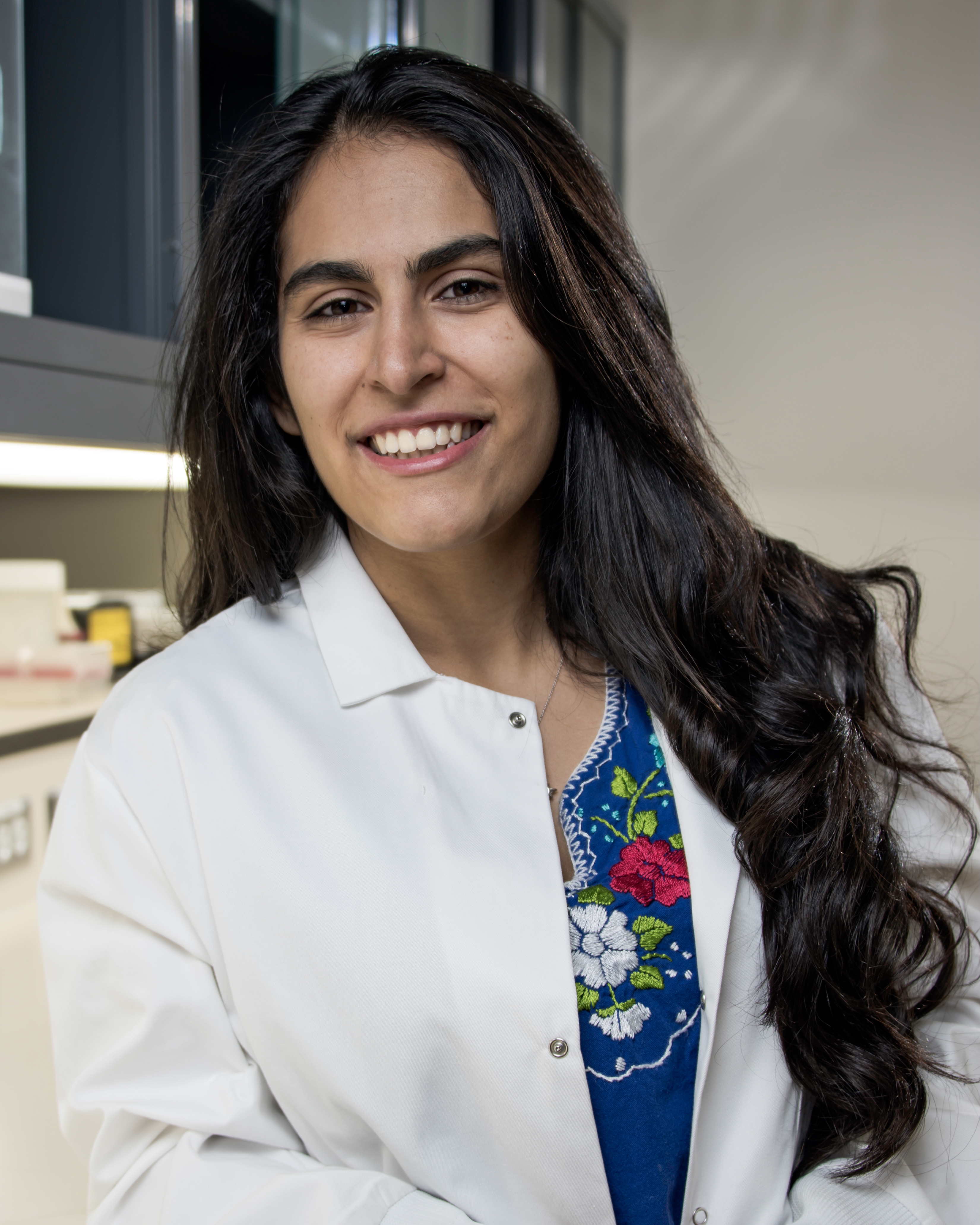 majocamo96 [at] gmail.com (María José Castellanos Montiel)
majocamo96 [at] gmail.com (María José Castellanos Montiel)
Graduate Student
"My fascination for the human brain is what inspires me to work at The Neuro. At The Neuro, great minds come together to do research."
"Mi fascinación por el cerebro es lo que me inspira a trabajar en el Neuro. En el Instituto Neurologico de Montreal, se juntan grandes mentes para hacer investigación."
Watch María's Spotlight Video
Read María's biography
I was born and raised in Mexico City where I finished a Biology Major at National Autonomous University of Mexico (UNAM). During my undergraduate studies, I got the opportunity to do an internship (exciting enough to make me stay for two years) in a lab specialized on stem cells. The project that I was working on required the use of stem cells to model the junction of muscle and motor neurons, the key players involved in the movement of our body. Since I can remember, I have always loved sports. Because of this, I was always fascinated by the processes that allow us to run, swim, or hit a ball. I came to Montréal to start my graduate studies and I currently have the great pleasure of studying motor neurons and muscle. I am happy to know that I can generate knowledge to help people whose mobility has been impaired.
Selected publications
- Castellanos-Montiel MJ, Chaineau M, Franco-Flores AK, Haghi G, Carrillo-Valenzuela D, Reintsch WE, Chen CX-Q, Durcan TM. An optimized workflow to generate and characterize iPSC-derived motor neuron (MN) spheroids. Cells. 2023;12, 545.
- Lépine S, Castellanos-Montiel MJ, Durcan TM. TDP-43 dysregulation and neuromuscular junction disruption in amyotrophic lateral sclerosis. Transl Neurodegener. 2022;11(1):56.
- Deneault E, Chaineau M, Nicouleau M, Castellanos Montiel MJ, Franco Flores AK, Haghi G, Chen CX, Abdian N, Shlaifer I, Beitel LK, Durcan TM. A streamlined CRISPR workflow to introduce mutations and generate isogenic iPSCs for modeling amyotrophic lateral sclerosis. Methods. 2022;203:297-310.
- Castellanos-Montiel MJ, Velasco I, Escobedo-Avila I. Modeling the neuromuscular junction in vitro: an approach to study neuromuscular junction disorders. Ann N Y Acad Sci. 2021;1488(1):3-15.
- Castellanos-Montiel MJ, Chaineau M, Durcan TM. The Neglected Genes of ALS: Cytoskeletal Dynamics Impact Synaptic Degeneration in ALS. Frontiers in Cellular Neuroscience. 2020;14(380).
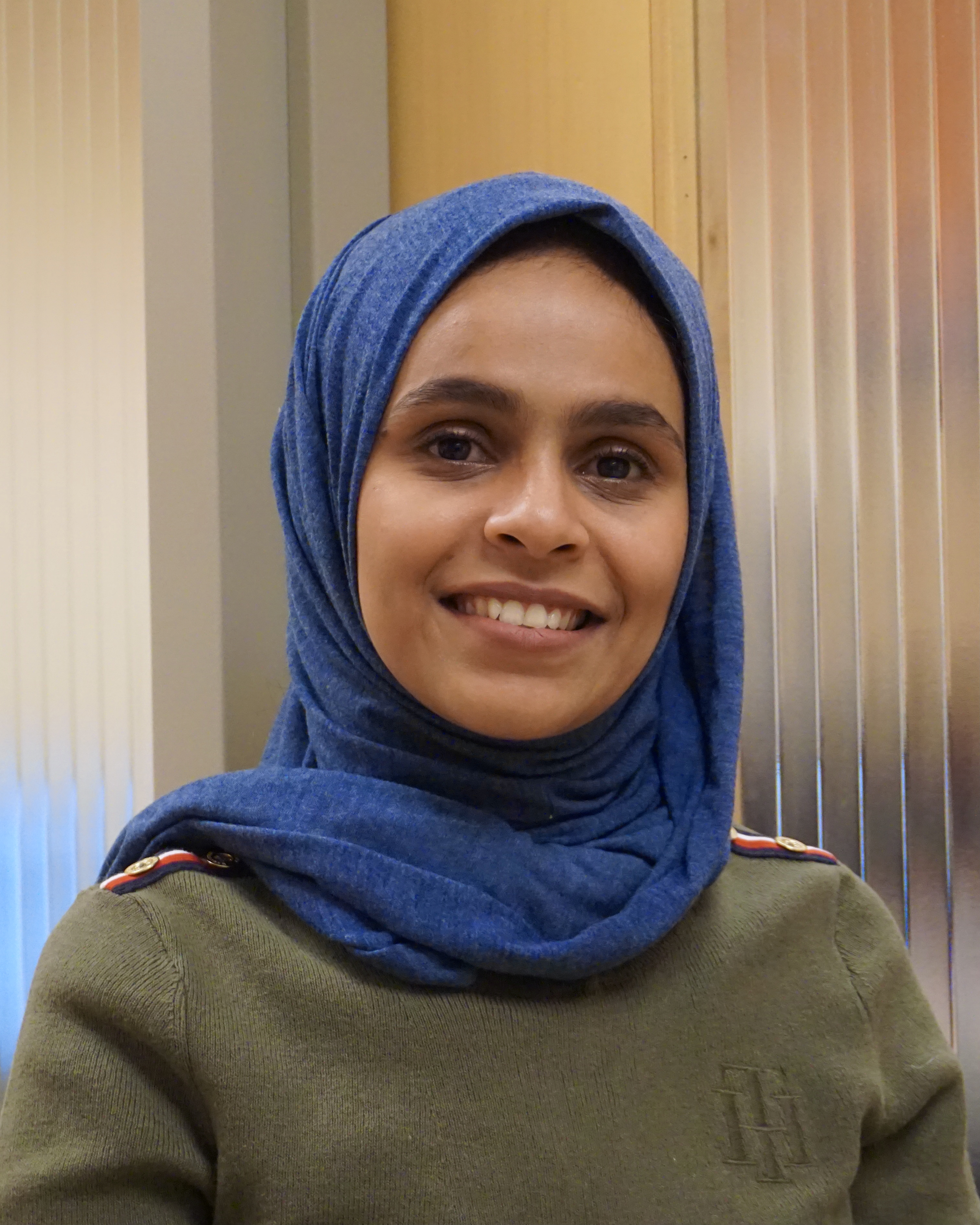 Aeshah Alluli
Aeshah Alluli
Research Assistant
"Understanding mindsets is a window into exploring novel paths of neurodegenerative disorders, which might help us discover therapeutic reliefs for patients."
"يعد فهم العقليات نافذة لاستكشاف مسارات جديدة للاضطرابات التنكسية العصبية، والتي قد تساعدنا في اكتشاف وسائل الراحة العلاجية للمرضى."
View Aeshah's Linkedin
Read Aeshah's biography
I obtained my undergraduate degree in Medical Laboratory Technology from Jazan University back home in Saudi Arabia in 2015. Following my bachelor’s degree, I got a scholarship from the Ministry of Education to study abroad and complete my graduate degree. I came to Canada in 2016 to first study English courses that would assist me in my adventure in graduate studies. I am superMom for a lovely son (Rakan). He is nine years old and has accompanied me during my adventure in Canada. I recently obtained my master’s degree from the Department of Pathology. I am so glad to be a member of McGill University, especially in the Neuro. My goal is to learn more about the most recent research areas since this will help me a lot in my future career.
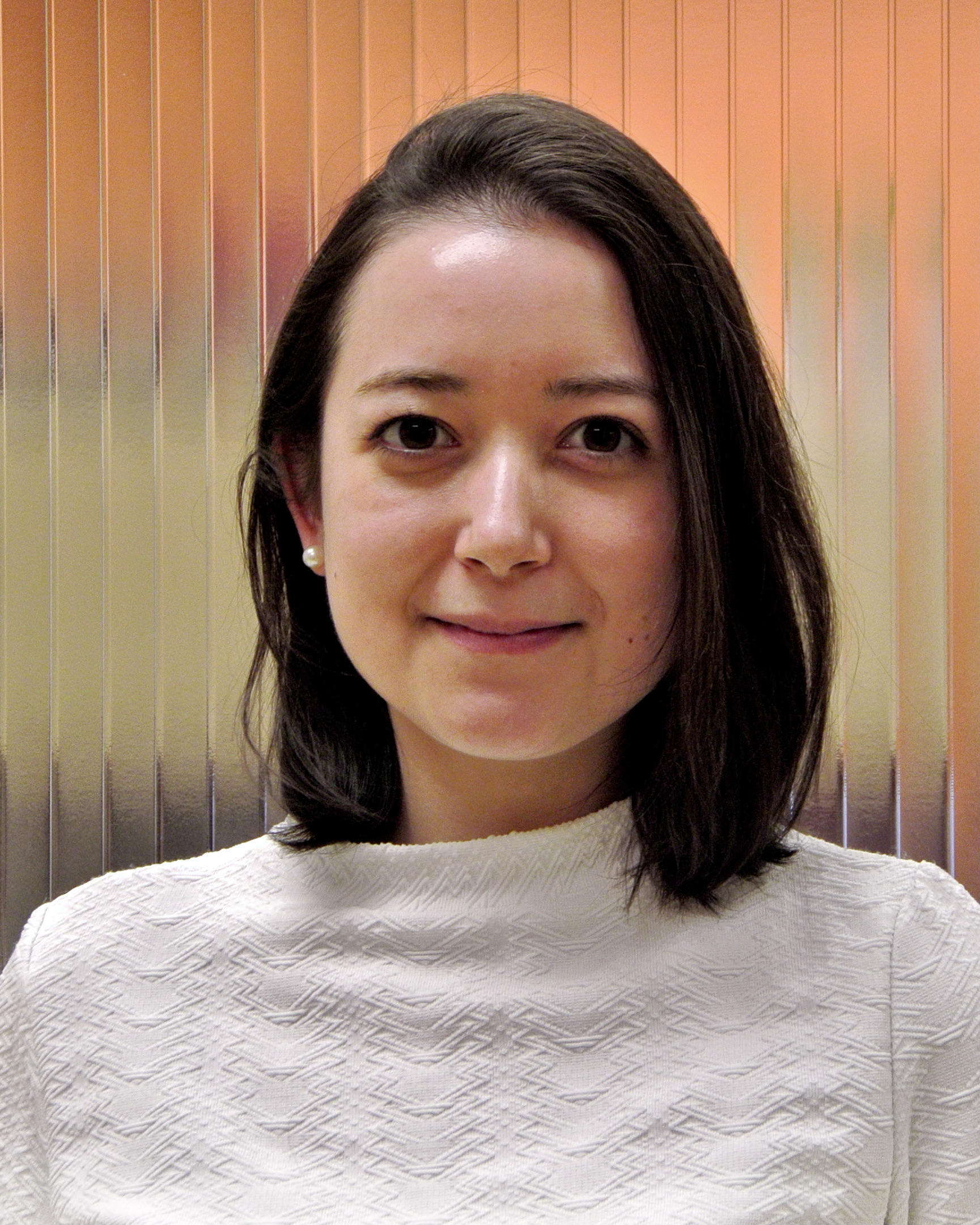 marie-france.dorion [at] mail.mcgill.ca (Marie-France Dorion)
marie-france.dorion [at] mail.mcgill.ca (Marie-France Dorion)
Graduate Student
"The Neuro promotes interlaboratory collaborations and is an excellent place for graduate students like myself to grow."
"Le Neuro est un lieu qui promeut la collaboration scientifique et qui offre un excellent soutien à l’apprentissage. Je me vois progresser à chaque jour."
Watch Marie-France's Spotlight Video
Read Marie-France's biography
After I completed my MSc studies in Pharmaceutical Sciences at Université de Montréal, I joined the Early Drug Discovery Unit and the Neuroimmunology Unit at the Neuro as a PhD student in 2019. Under the supervision of Drs. Durcan and Healy, my PhD project focuses on the role of microglia in Parkinson’s disease. Using iPSC-derived microglia, I hope that I can contribute to better understanding the role of neuroinflammation in Parkinson’s disease and to finding promising therapeutic targets.
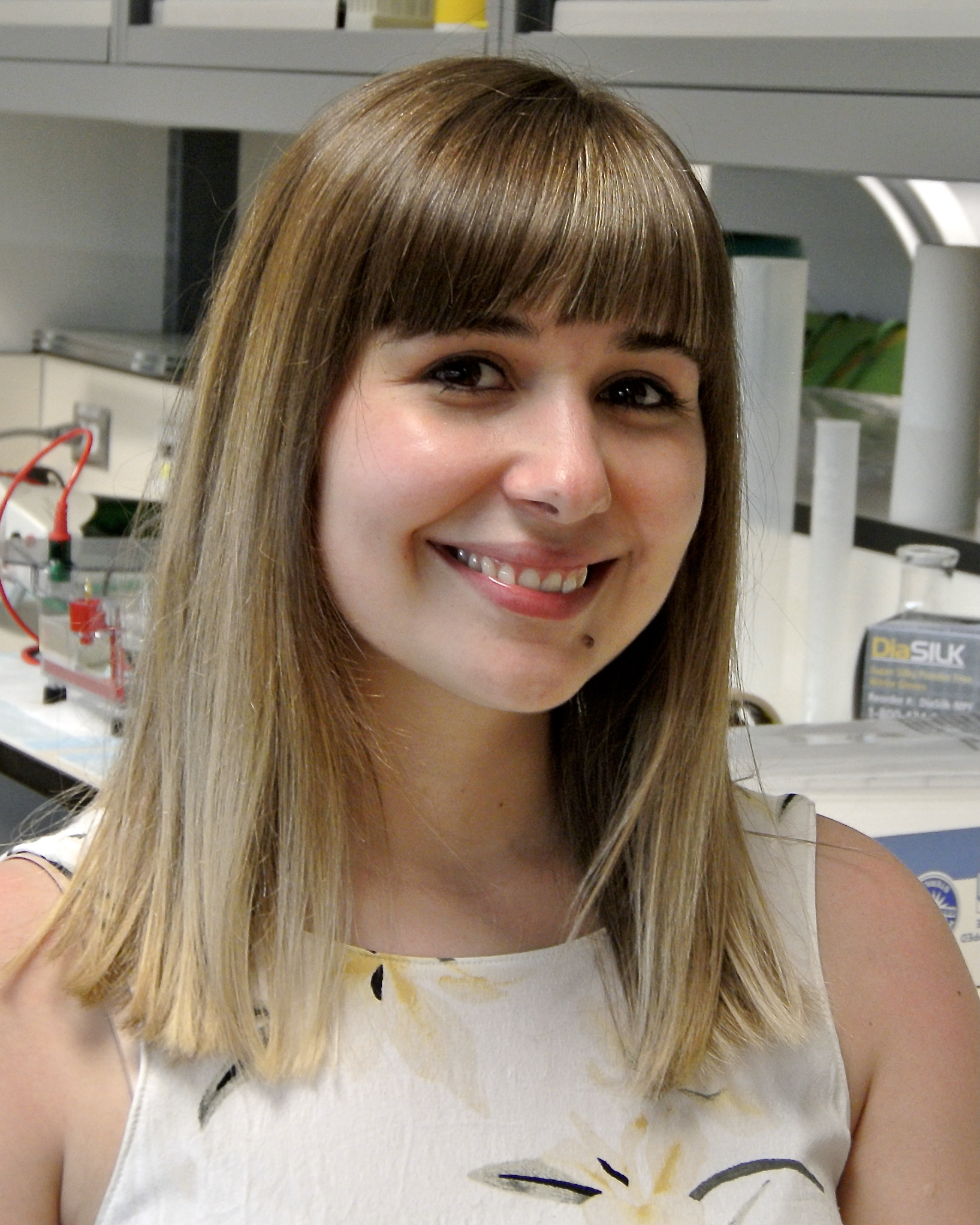 sarah.lepine2 [at] mail.mcgill.ca (Sarah Lépine)
sarah.lepine2 [at] mail.mcgill.ca (Sarah Lépine)
Graduate Student
"Important questions remain unresolved in the field of neuroscience, and filling these knowledge gaps could significantly improve medical practice and patient care. At The Neuro, I feel my work could make a real difference in the lives of patients."
"De grandes questions demeurent non résolues dans le domaine des neurosciences et combler ces lacunes pourra significativement améliorer la pratique médicale. Au Neuro, je sens que mon travail pourrait faire une réelle différence dans la vie des patients."
View Sarah's Linkedin
Watch Sarah's Spotlight Video
Read Sarah's biography
Having a career in research has been a dream for me ever since high school. I started my training in the Laboratory Technology program of the CEGEP of Saint-Hyacinthe. I then completed an undergraduate degree in cellular and molecular biology at the University of Sherbrooke and had the opportunity to complete multiple paid internships in various research fields. I am currently studying medicine and neuroscience in McGill’s MDCM & PhD joint program to become a clinician-scientist. I first joined the Neuro's EDDU as a summer student and I am now pursuing the PhD portion of my program under the supervision of Dr Thomas Durcan. My PhD project aims to gain further insights into the cellular processes that are perturbed in human motor neurons with mutations associated with amyotrophic lateral sclerosis (ALS).
Selected publications
- Michell-Robinson, M.A., Lépine, S. (2021, January 14). Reader Response: Association of Age at Onset and First Symptoms with Disease Progression in Patients with Metachromatic Leukodystrophy [Letter to the Editor]. Neurology, 96(2):e255-e266. Comment URL: https://n.neurology.org/content/96/2/e255
- Hintermayer, M.*, Lépine, S.*, Chen, O.* (2021) Chapter 5 : Standardized Testing – The CASPer. In M.J. Eisenberg & A.L. Cox (Eds.), The Essential MD-PhD Guide (1st Edition, pp.33-39). McGraw Hill.
- M'Callum, M., Raggi, C., Lépine, S., Legault, L., McGraw, S., & Paganelli, M. (2018). Improving the quality of stem cell-derived hepatocytes for cell therapy: Role of pluripotency state in determining lineage commitment of human induced pluripotent stem cells. Cytotherapy, 20(5), S112. Doi: 10.1016/j.jcyt.2018.02.333
- Shrednick, M., Usongo, V., Lépine, S., Janvier, X., Archambault, M., & Gentilini, E. (2018). Characterization of Staphylococcus aureus strains isolated from mastitis bovine milk in Argentina, J Dairy Res, 85(1):57-63. Doi:10.1017/S0022029917000851
- Raggi, C., Mangahas, C., M’Callum, M., Raad, S., Lépine, S., Pham, T.Q., & Paganelli, M. (2017). Induced pluripotent stem cells (iPSC) from small volume peripheral blood samples for in vitro modeling and cell therapy of pediatric liver diseases. Dig Liver Dis, 49(4):e251-e252. doi:10.1016/j.dld.2017.09.026
 lenore.beitel [at] mcgill.ca (Lenore K. Beitel)
lenore.beitel [at] mcgill.ca (Lenore K. Beitel)
Project Manager
"It’s great working with bright, motivated people who use state-of-the-art scientific techniques and equipment to understand human neurological diseases, with the goal of discovering treatments for these diseases."
Lenore's work with the EDDU benefits patients because by "starting with patients’ blood cells, we can make different types of human brain cells, such as those damaged by Parkinson’s disease (PD) or ALS (Lou Gehrig’s disease). We use these cell models to identify compounds (drugs) that could lead to new treatments for these neurological diseases."
View Lenore's PubMed.
Read Lenore's biography
Originally from Calgary, Alberta, I came to McGill to study science . . . and made Montréal my home. With both a B.Sc. (Honours) and Ph.D. in Biochemistry from McGill, I learned molecular biology and cell culture techniques along the way. As a Post-doctoral Fellow and Research Scientist at the Lady Davis Institute (Jewish General Hospital), I carried out research on the structure, function and genetics of the androgen receptor. Interestingly, mutations in the androgen receptor protein can lead to a neurodegenerative disease called spinal bulbar muscular atrophy (SBMA or Kennedy’s disease), cause androgen insensitivity syndrome (AIS), and are associated with prostate cancer. I believe science has a life cycle: we do the research, then write the papers, to get the funding, to do the research . . . Since joining the NeuroEDDU in 2017, my main job is to help my colleagues write and edit applications for funding and articles for publication. The Open Science policy at The Neuro means that the methods and research results published by the Neuro EDDU will be available for all. Fun facts: I enjoy decorating cakes, photographing flowers and travelling.
Selected publications
- X-Q Chen, C., Deneault, E., Abdian, N., You, Z., Sirois, J., Nicouleau, M., Shlaifer, I., Villegas, L., Boivin, M. N., Gaborieau, L., Karamchandani, J., Beitel, L. K., Fon, E. A., & Durcan, T. M. (2022). Generation of patient-derived pluripotent stem cell-lines and CRISPR modified isogenic controls with mutations in the Parkinson's associated GBA gene. Stem cell research, 64, 102919. https://doi.org/10.1016/j.scr.2022.102919
- Chen, C. X., Abdian, N., Maussion, G., Thomas, R. A., Demirova, I., Cai, E., Tabatabaei, M., Beitel, L. K., Karamchandani, J., Fon, E. A., & Durcan, T. M. (2021). A Multistep Workflow to Evaluate Newly Generated iPSCs and Their Ability to Generate Different Cell Types. Methods and protocols, 4(3), 50. https://doi.org/10.3390/mps4030050
- Mohamed, N. V., Larroquette, F., Beitel, L. K., Fon, E. A., & Durcan, T. M. (2019). One Step Into the Future: New iPSC Tools to Advance Research in Parkinson's Disease and Neurological Disorders. Journal of Parkinson's disease, 9(2), 265–281. https://doi.org/10.3233/JPD-181515
- Beitel, L. K., Alvarado, C., Mokhtar, S., Paliouras, M., & Trifiro, M. (2013). Mechanisms mediating spinal and bulbar muscular atrophy: investigations into polyglutamine-expanded androgen receptor function and dysfunction. Frontiers in neurology, 4, 53. https://doi.org/10.3389/fneur.2013.00053
- Gottlieb, B., Beitel, L. K., Nadarajah, A., Paliouras, M., & Trifiro, M. (2012). The androgen receptor gene mutations database: 2012 update. Human mutation, 33(5), 887–894. https://doi.org/10.1002/humu.22046
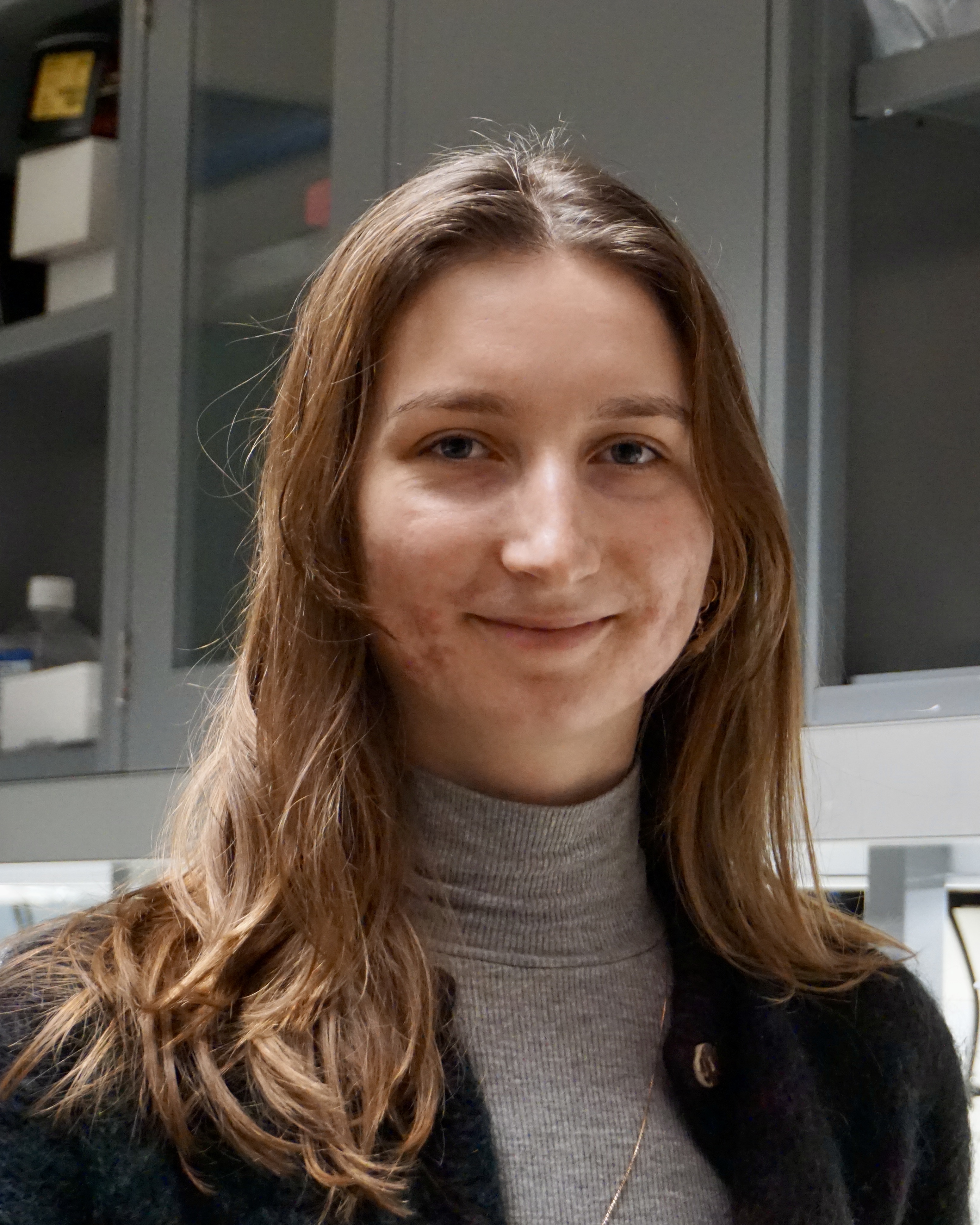 gabriela.blaszczyk [at] mail.mcgill.ca (Gabriela Blaszczyk)
gabriela.blaszczyk [at] mail.mcgill.ca (Gabriela Blaszczyk)
Graduate Student
"I believe that it is highly important to continue developing disease models and translatable tools to accelerate disease understanding and treatment development. Here at the Neuro, we have access to world-class knowledge and state of the art technology and techniques which creates a perfect environment for this goal."
View Gabriela's Linkedin
Read Gabriela's biography
I am from Toronto, Ontario and completed my Bachelor’s of Science here at McGill studying Immunology. I have always been interested in translational research and disease modelling. I started my project with the EDDU back in the summer of 2021 as an undergraduate student, focusing on glia and how they are affected in autoimmune disease such as Multiple Sclerosis (MS). I have also been given the opportunity to work alongside experts in disease modelling here at the EDDU to develop improved iPSC protocols to generate oligodendrocytes. In September 2022 I decided to continue working on the project for a Master’s degree, while learning new cutting-edge techniques and all there is to know about under-represented glial cells.
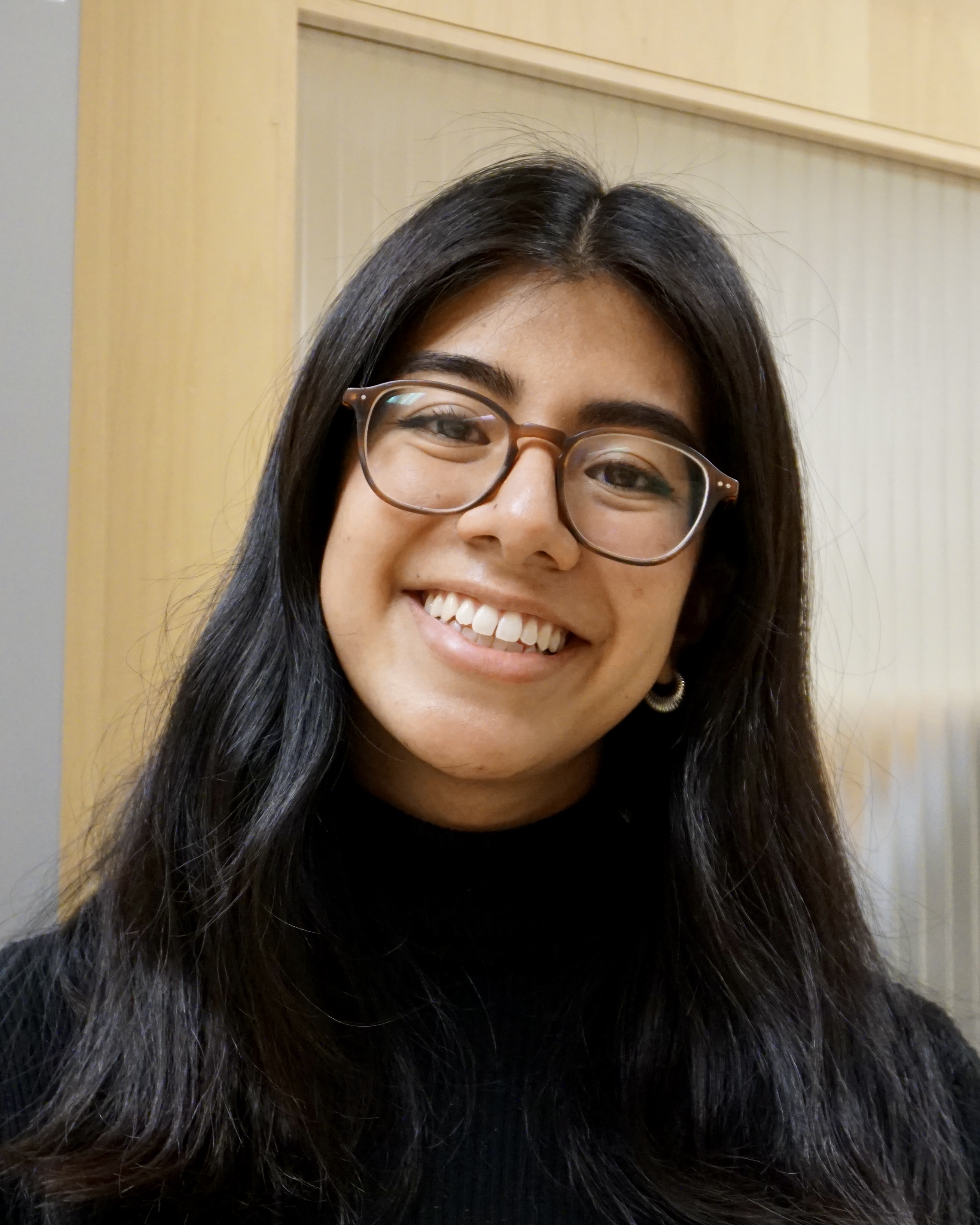 dulce.carrillovalenzuela [at] mcgill.ca (Dulce Carrillo Valenzuela)
dulce.carrillovalenzuela [at] mcgill.ca (Dulce Carrillo Valenzuela)
Research Assistant
"Being here gives me the opportunity not only of learning and getting professional development, but also the possibility that the work that I do has a positive impact in the lives of patients and in the advancement of science. "
"El cerebro siempre me ha parecido impresionante. Decidí venir al Neuro ya que quería aprender más sobre los procesos que ocurren en el cerebro y las enfermedades que lo afectan. Estar aquí me da la oportunidad no solo de aprender y desarrollarme como profesional, sino también la posibilidad de que el trabajo que haga tenga un impacto positivo en la vida de los pacientes y en el avance de la ciencia. Además, aquí estoy rodeada de personas con mucho talento que me inspiran a dar lo mejor de mí."
View Dulce's Linkedin
Read Dulce's biography
I am from Mexico and arrived in Canada a few years ago to do my bachelor´s degree at McGill, majoring in Biochemistry. My journey at the EDDU started during my last summer as an undergraduate. I was in the ALS team helping with the projects being developed using motor neurons. This was my first real life research experience, and I enjoyed it so much that I decided to stay once the new semester started and work on my own project. Now I just graduated and was given the opportunity to continue here at the EDDU, this time as part of the Neurodevelopment team. I am excited to continue learning from this amazing team and look forward to what the future will bring.
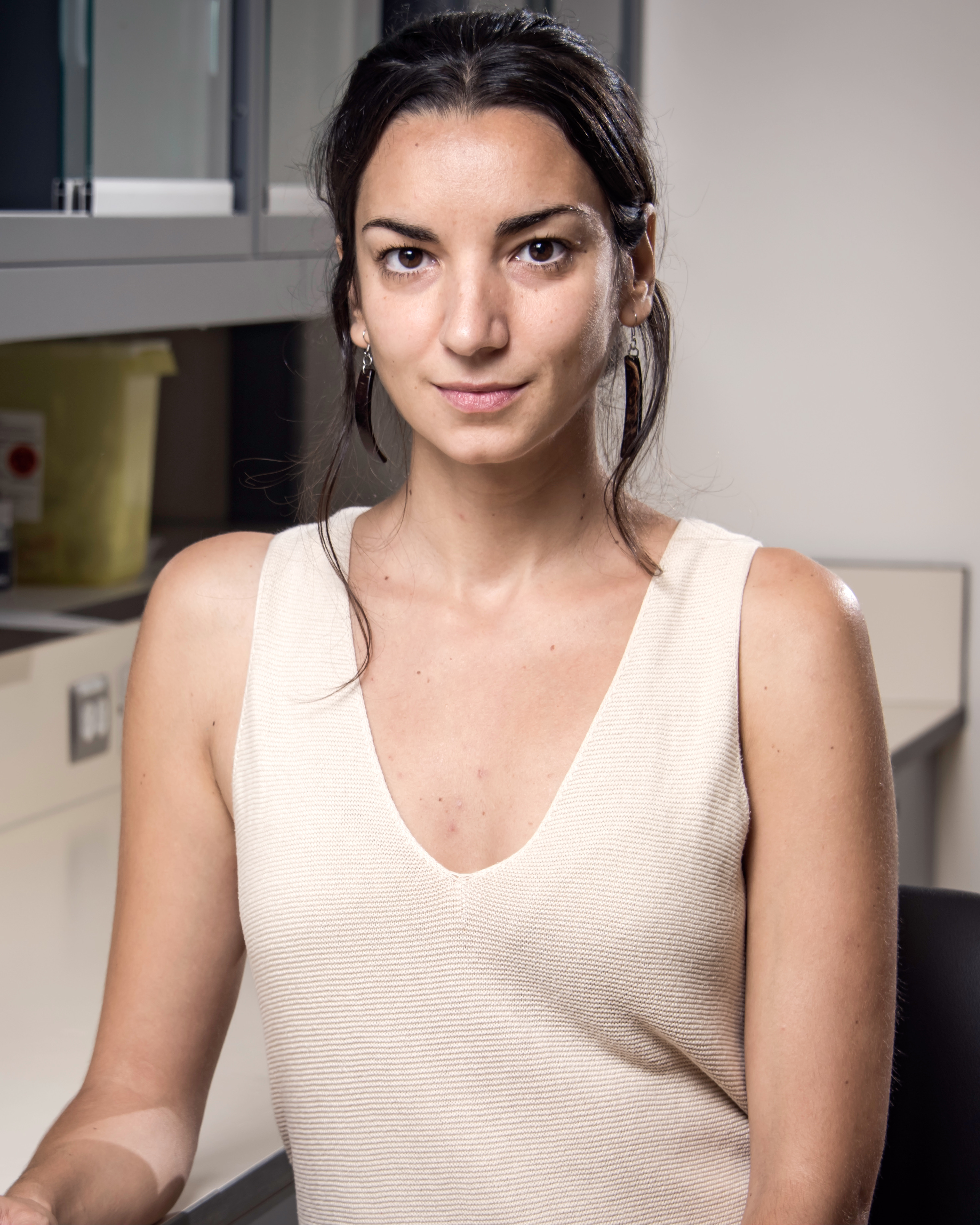 maria.lacalleaurioles [at] mcgill.ca (Maria La Calle Aurioles)
maria.lacalleaurioles [at] mcgill.ca (Maria La Calle Aurioles)
Research Associate
"The Neuro is a benchmark institution in the field of neuroimaging and neurodegenerative diseases. I wanted to discover the environment that has inspired so much creativity and high-quality science."
"The Neuro es una institución de referencia en el campo de la neuroimagen y enfermedades neurodegenerativas. Quería descubrir el ambiente que ha inspirado tanta creatividad y ciencia de alta calidad."
Read Maria's biography
I am a research associate in the Neurodegenerative Disorders Group (Neural Survival) at the Montreal Neurological Institute, McGill University. I received my BSc from Universidad Autónoma de Madrid and my PhD in Biomedical Sciences from Universidad Complutense de Madrid, in collaboration with the Biomedical Imaging and Instrumentation Group (BiiG), Madrid, Spain. In 2014, I joined the Neuro as a postdoctoral fellow in Dr. Hamel’s Laboratory of Cerebrovascular Research and, in 2019, I became part of Dr. Durcan’s lab and member of the Neuro's EDDU. During my early career, I focused my work on the vascular and disconnection hypotheses in Alzheimer’s disease trying to comprehend the role of vascular dysfunction and white matter inflammation in this multifaceted disease, working on clinical and preclinical research projects. Now I am involved in the fascinating field of iPSCs and “mini brains”, hoping to find some targetable mechanisms for therapies in Parkinson’s disease.
Selected publications
- Lecrux, C., Sandoe, C. H., Neupane, S., Kropf, P., Toussay, X., Tong, X. K., Lacalle-Aurioles, M., Shmuel, A., & Hamel, E. (2017). Impact of Altered Cholinergic Tones on the Neurovascular Coupling Response to Whisker Stimulation. The Journal of neuroscience: the official journal of the Society for Neuroscience, 37(6), 1518–1531. https://doi.org/10.1523/JNEUROSCI.1784-16.2016
- Lacalle-Aurioles, M., Navas-Sánchez, F. J., Alemán-Gómez, Y., Olazarán, J., Guzmán-De-Villoria, J. A., Cruz-Orduña, I., Mateos-Pérez, J. M., & Desco, M. (2016). The Disconnection Hypothesis in Alzheimer's Disease Studied Through Multimodal Magnetic Resonance Imaging: Structural, Perfusion, and Diffusion Tensor Imaging. Journal of Alzheimer's disease : JAD, 50(4), 1051–1064. https://doi.org/10.3233/JAD-150288
- Lacalle-Aurioles, M., Mateos-Pérez, J. M., Guzmán-De-Villoria, J. A., Olazarán, J., Cruz-Orduña, I., Alemán-Gómez, Y., Martino, M. E., & Desco, M. (2014). Cerebral blood flow is an earlier indicator of perfusion abnormalities than cerebral blood volume in Alzheimer's disease. Journal of cerebral blood flow and metabolism: official journal of the International Society of Cerebral Blood Flow and Metabolism, 34(4), 654–659. https://doi.org/10.1038/jcbfm.2013.241
- Lacalle-Aurioles, M., Alemán-Gómez, Y., Guzmán-De-Villoria, J. A., Cruz-Orduña, I., Olazarán, J., Mateos-Pérez, J. M., Martino, M. E., & Desco, M. (2013). Is the cerebellum the optimal reference region for intensity normalization of perfusion MR studies in early Alzheimer's disease?. PloS one, 8(12), e81548. https://doi.org/10.1371/journal.pone.0081548
- Martino, M. E., de Villoria, J. G., Lacalle-Aurioles, M., Olazarán, J., Cruz, I., Navarro, E., García-Vázquez, V., Carreras, J. L., & Desco, M. (2013). Comparison of different methods of spatial normalization of FDG-PET brain images in the voxel-wise analysis of MCI patients and controls. Annals of nuclear medicine, 27(7), 600–609. https://doi.org/10.1007/s12149-013-0723-7
 Narges.fatemiyan [at] mcgill.ca (Narges Fatemiyan)
Narges.fatemiyan [at] mcgill.ca (Narges Fatemiyan)
Research Assistant
"Thinking about novel ideas and discovering new ways of treatment in the field of Neuroscience using stem cells had been always one of my greatest passions. I am proud to work at one the most prestigious neuroscience centers in the world where I have been given the opportunity to fulfill my long term goals in this field of research.""
"فکر کردن در مورد ایده های جدید و کشف راه های جدید درمان در زمینه نوروساینس با استفاده از سلول های بنیادی همیشه یکی از بزرگترین علایق من بوده است. من مفتخرم که در یکی از معتبرترین مراکز علوم اعصاب در جهان کار می کنم، جایی که به من فرصت داده شده است تا اهداف بلندمدت خود را در این زمینه تحقیقاتی برآورده کنم"
View Narges' Linkedin
Read Narges' biography
As someone who is always passionate about science, I passed my Bachelor’s degree in the field of Cell & Molecular Biology Genetics and in 2019 I moved to Canada to pursue my Master’s degree in this field of research at the university of Manitoba. While I faced with different challenges in the middle of my way, I am proud I ended up joining Early Drug Discovery Unit (EDDU) at McGill University and became part of ALS team. As a Research Assistant at Neuro, I am working on human Pluripotent Stem Cells (iPSCs) to generate different neuronal cells and help to discover novel treatments for patients suffering from neurodegenerative disorders.
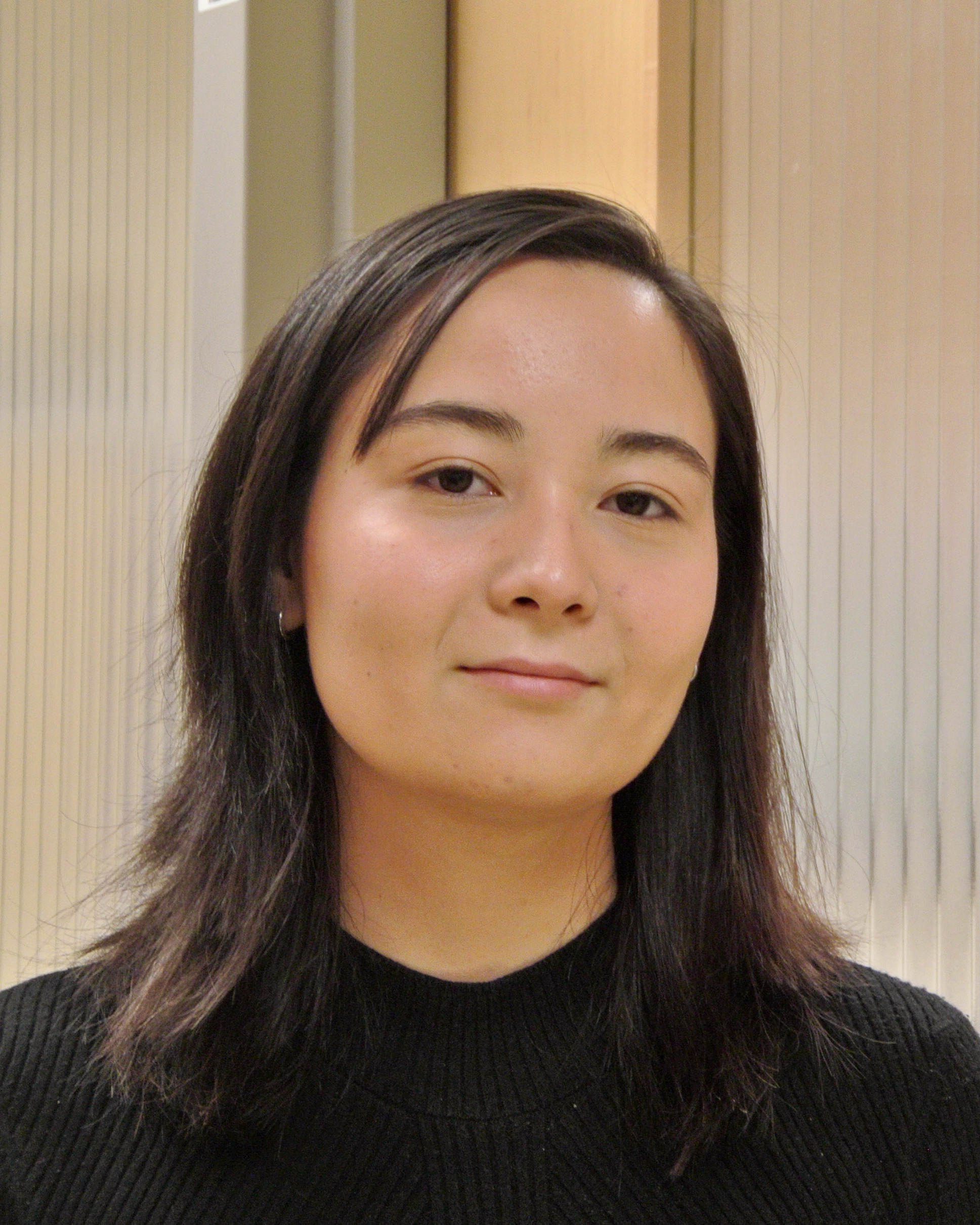 Anelya.gandy [at] mcgill.ca (Anelya Gandy)
Anelya.gandy [at] mcgill.ca (Anelya Gandy)
Graduate Student
"It’s a unique learning opportunity to work in a research-driven environment, use state-of-the-art techniques, and develop valuable skills to collaboratively investigate disease mechanisms and drug discovery tools for neurodegenerative diseases. I am inspired to grow professionally and contribute to the EDDU team, which I thank for the training and support."
"Это уникальная возможность учиться и работать в среде научного исследования, использовать современные технологии, и развить ценные навыки для совместного исследования механизмов болезни и поиска новых методов лечения нейродегенеративных заболеваний. Я вдохновлена возможностью расти профессионально и внести свой вклад в нашу научную команду, которую я благодарю за обучение и поддержку."
View Aneyla's Linkedin
Read Anelya's biography
As a graduate from McMaster University with B.Sc. in Biology and Psychology, Neuroscience & Behavior, I decided to pursue my interest in the application of stem cell technologies in modelling and drug discovery for neurodegenerative diseases at the Neuro. I am very excited to join the EDDU team as a research assistant at Dr. Durcan’s lab and hope to continue my professional journey as an M.Sc. IPN student in January 2022.
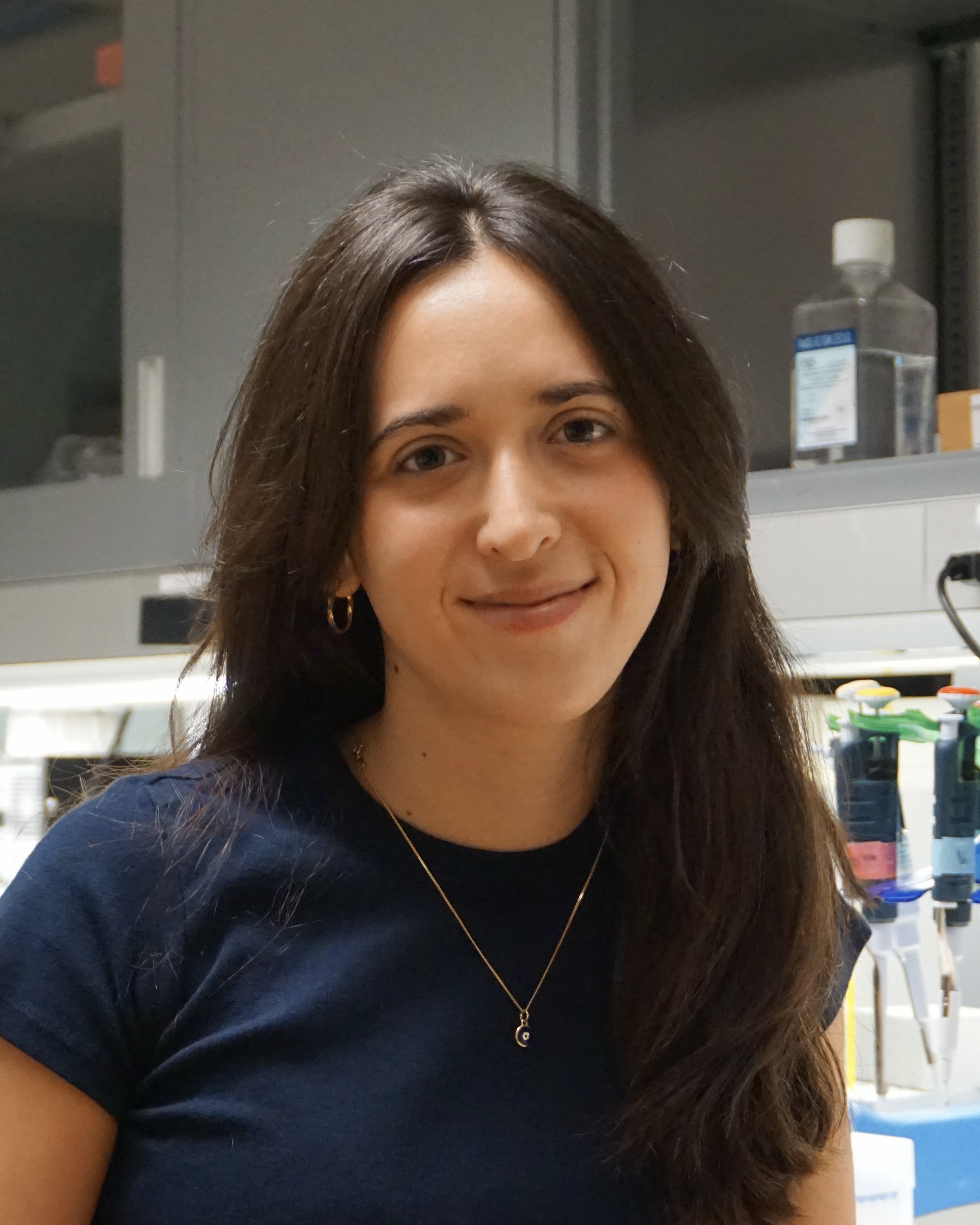 lale.gursu [at] mail.mcgill.ca (Lale Gursu)
lale.gursu [at] mail.mcgill.ca (Lale Gursu)
Research Assistant
"Working at The Neuro offers the chance to learn from and work with a broad and diverse team of bright individuals in order to accelerate the discovery of treatments for patients with neurodegenerative diseases.""
The Neuro'da çalışmak, nörodejeneratif hastalıkları olan hastalara yönelik tedavilerin keşfini hızlandırmak için parlak bireylerden oluşan geniş ve çeşitli bir ekipten öğrenme ve onlarla çalışma şansı sunuyor.
View Lale's Linkedin
Read Lale's biography
I was born and raised in Istanbul and came to Montreal to do my undergrad at McGill University in Pharmacology. I joined the EDDU as an undergrad student in the summer of 2021, working with the ALS team. I have been a part of the ALS team since then and have worked on different projects. I graduated from McGill in 2022, and I was given the opportunity to continue here at the EDDU, working with patient-derived cells and generating neurons for studies in ALS.
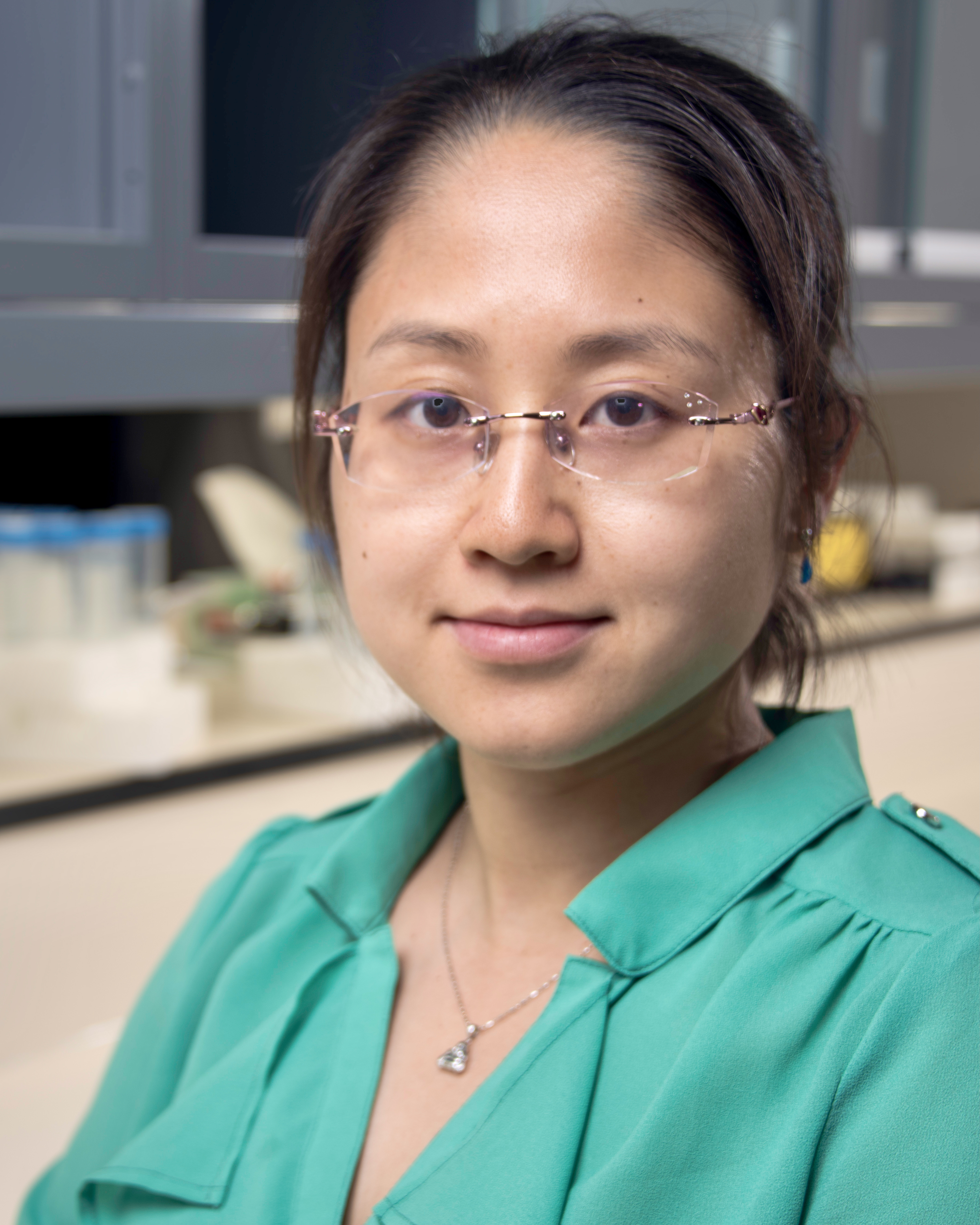 chanshuai.han [at] mcgill.ca (Chanshuai Han)
chanshuai.han [at] mcgill.ca (Chanshuai Han)
Research Associate
"The Neuro gives me a sense of belonging and purpose. Working at The Neuro is not just a job, it is a joy."
"在Neuro,我找到了归属感和使命感;在这里,工作是一种快乐。"
Read Chanshuai's biography
Since the beginning of my doctoral research, my long-term goal has been to elucidate the mechanisms of neurological diseases and to seek possible cures. After completing PhD at the Institute of Biophysics, Chinese Academy of Sciences, I joined The Neuro as a postdoctoral fellow in Dr. Peter McPherson’s lab in 2012, where my research focused on membrane trafficking and neurodevelopmental disorders. I have been working with stem cells since 2016. I joined the Neuro's EDDU as a research associate in 2017. I work in the group of Discovery Assays and Screens, and I serve as the leader of Parkinson’s disease/synucleinopathies team. I am specialized in using iPSC-derived neurons to develop assays for Parkinson’s disease-related drug discovery and using cerebral organoid cultures to model neurodevelopmental disorders.
Selected publications
- Han, C., Chaineau, M., Chen, C. X., Beitel, L. K., & Durcan, T. M. (2018). Open Science Meets Stem Cells: A New Drug Discovery Approach for Neurodegenerative Disorders. Frontiers in neuroscience, 12, 47. https://doi.org/10.3389/fnins.2018.00047
- Han C, Alkhater R, Froukh T, et al. Epileptic Encephalopathy Caused by Mutations in the Guanine Nucleotide Exchange Factor DENND5A. Am J Hum Genet. 2016;99(6):1359-1367. doi:10.1016/j.ajhg.2016.10.006
- Han C, Lu Y, Wei Y, Wu B, Liu Y, He R. D-ribosylation induces cognitive impairment through RAGE-dependent astrocytic inflammation. Cell Death Dis. 2014;5(3):e1117. Published 2014 Mar 13. doi:10.1038/cddis.2014.89
- Tong Z*, Han C*, Qiang M, et al. Age-related formaldehyde interferes with DNA methyltransferase function, causing memory loss in Alzheimer's disease. Neurobiol Aging. 2015;36(1):100-110. doi:10.1016/j.neurobiolaging.2014.07.018. (*Equal contribution)
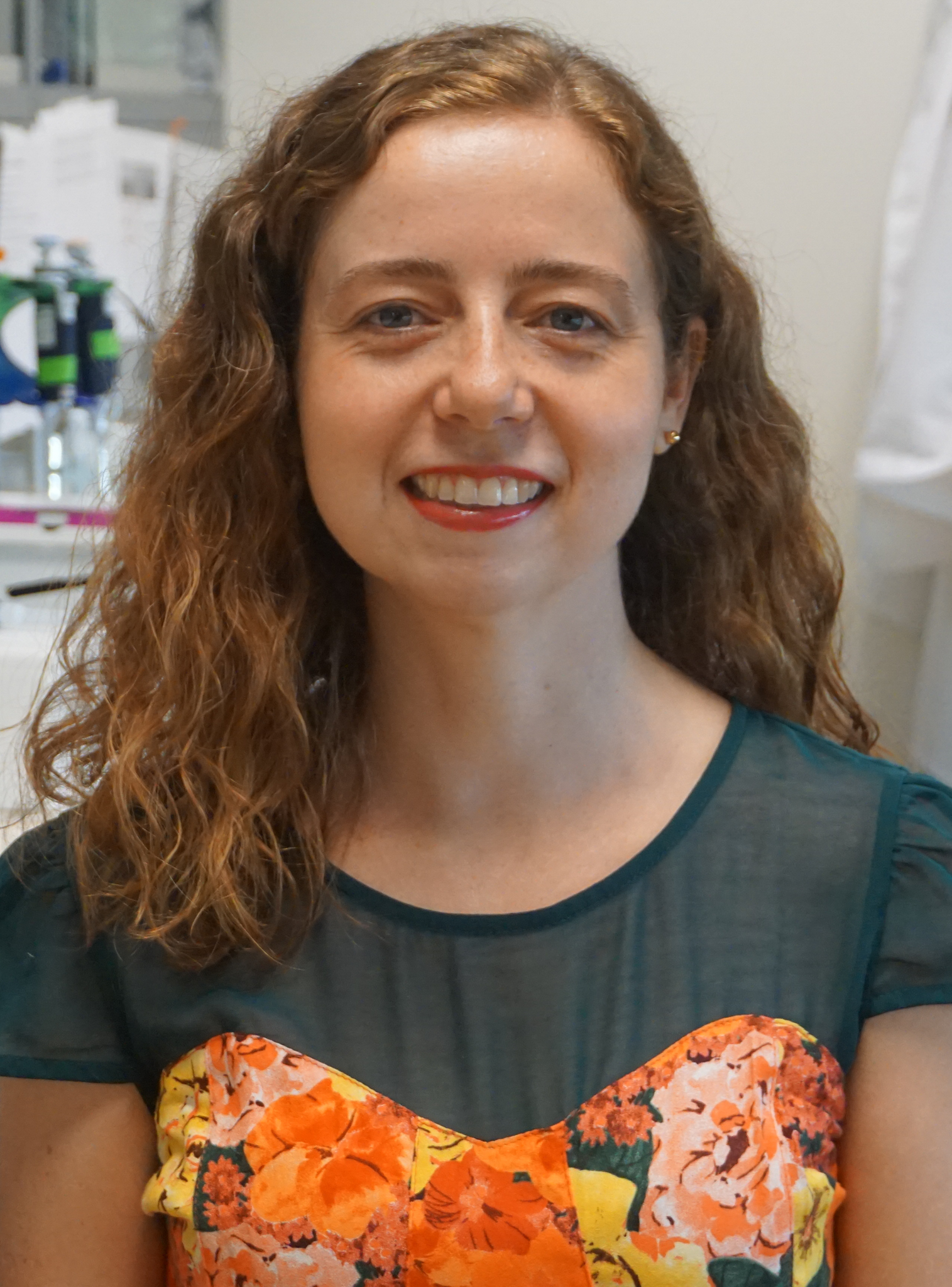 paula.istilli [at] mcgill.ca (Paula Istilli)
paula.istilli [at] mcgill.ca (Paula Istilli)
Project Assistant: Outreach and Training
"Being part of the Neuro's EDDU team has been an enriching experience. It is gratifying to know that my small contribution helps to spread new research and advances in the field of science focused on the development of treatments for neurological disease."
"Fazer parte da equipe da Neuro's EDDU tem sido uma experiência enriquecedora. É gratificante saber que minha pequena colaboração ajuda a divulgar novas pesquisas e avanços no campo da ciência focados no desenvolvimento de tratamentos para doenças neurológicas."
View Paula's Linkedin
Read Paula's biography
I was born in Brazil and have always been passionate about travel and experiencing new cultures. Most of my career has been in hospitality and customer service, but I have recently decided to change careers to Marketing in order to work in a different industry. Having decided to study Digital Marketing and French in Montreal, I joined the Training and Outreach team in May 2023 and am delighted to share our new research and discoveries with anyone who is interested.
 david.kalaydjian [at] mail.mcgill.ca (David Kalaydjian)
david.kalaydjian [at] mail.mcgill.ca (David Kalaydjian)
Graduate Student
"The Neuro is a world-renowned research institute with countless people taking part in a common pursuit. Science, in general, is all about the search to know the unknown and I feel as if neuroscience research is the last frontier, and we know so little about it. I want to be a part of a future where we know more, and I hope to have the privilege of being able to continue my journey far past a Graduate Degree and pursue a PhD in order to one day possibly have a lab to myself to inspire and teach other students like me or take my skills and experience into the private sector to continue the amazing work they provide."
Read David's biography
I was born and raised right here in Montréal. My undergraduate studies were done at McGill in Pharmacology & Therapeutics during which time I had a research project at The Neuro with the main goal of developing a method to use suicide gene therapy for chordoma, a rare type of tumour that forms along the spinal cord. Currently, I am a graduate student in the IPN program at McGill. My project focuses on the role of inflammation in Parkinson’s Disease and its link with the gut-brain axis through the use of iPSC-derived midbrain organoids and probiotic-derived secretomes. I’ve loved the sciences for as long as I could remember. For this, I have my parents to thank – who are in the medical field – and the innate nature of science itself, as its purpose is to understand how the world works whether we can see it or not. The building blocks to advance research and science will be the cooperation between different colleagues and teams and this is what Open Science is all about. In my spare time, I enjoy watching and/or playing any and all sports, studying chess strategy, and reading.
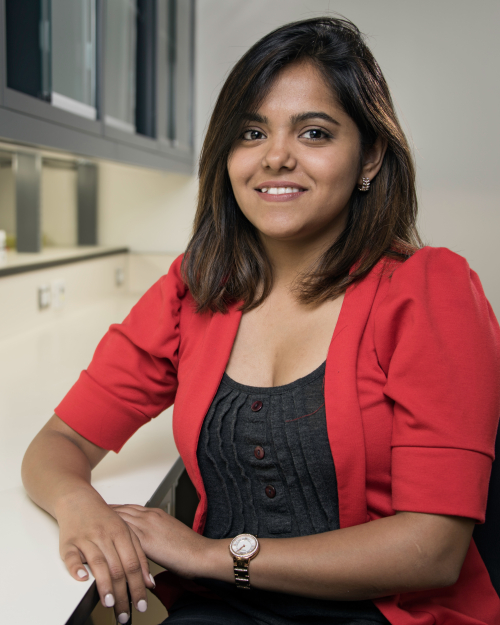 meghna.mathur [at] mail.mcgill.ca (Meghna Mathur)
meghna.mathur [at] mail.mcgill.ca (Meghna Mathur)
Research Assistant
"My grandmother, who I have always been really close to, was diagnosed with Parkinson's disease when I was in undergrad. Since I saw her in that state, I really wanted to work towards finding a cure for such neurodegenerative diseases. That is why when I had the opportunity to work at one of the world’s leading research institutes, I chose to work in this field. This motivates and inspires me to work at The Neuro everyday."
View Meghna's Linkedin
Read Meghna's biography
I am a Research Assistant in the Organoids and Tissue-Engineering group and currently leading the node of Organoids Maintenance and Quality Control. In 2015, I obtained my Biotechnology Engineering degree from India. I gained research experience at the Defence Research and Development Organisation, India and Panacea Biotech Ltd. In 2017, I obtained my MSc Biotechnology from McGill University. During my master’s, I interned with Dr. Nguyen-Vi Mohamed to set up and develop the organoids platform with the support of Dr. Thomas Durcan at the EDDU. Fascinated by my internship project, I joined the EDDU in 2018 to focus on generating different types of organoids from human induced pluripotent stem cells to study neurodegenerative and neurodevelopmental disorders. Part of my work involves optimization and troubleshooting different protocols to generate a more uniform model. During this time, I published in the MNI open research journal, discussing the method to generate human midbrain organoids from iPSC. In addition, I coordinate organoid generation training and oversee maintaining, tracking and managing resources for organoids. Apart from research, I love theatre. I used to perform street plays in India so if I use my street play voice, you'll be able to hear me clearly, even at a two-block distance.
Selected publications
- Mohamed NV, Mathur M, da Silva RV et al (2021) Generation of human midbrain organoids from induced pluripotent stem cells. MNI Open Res.
- Mohamed NV, Lépine P, Lacalle-Aurioles M, Sirois J, Mathur M, Reintsch W, Beitel LK, Fon EA, Durcan TM.( 2021) Microfabricated disk technology: rapid scale up in midbrain organoid generation. Methods, doi: https://doi.org/10.1016/j.ymeth.2021.07.008
- Mohamed N.V, Julien Sirois, Janani Ramamurthy, Meghna Mathur, Paula Lepine, Eric Deneault, Gilles Maussion, Michael Nicouleau, Carol X.-Q. Chen, Narges Abdian, Vincent Soubannier, Eddie Cai, Harris Nami, Rhalena Thomas, Mahdieh Tabatabaei, Lenore K. Beitel, Jason Karamchandani, Tilo Kunath, Edward A. Fon, Thomas M. Durcan. (2021) Midbrain organoids with an SNCA gene triplication model key features of synucleinopathy. Brain Comm. Preprint available: https://www.biorxiv.org/content/10.1101/2021.04.12.439480v1
- Imanbekova, Meruyert; Suarasan, Sorina; Rojalin, Tatu; Mizenko, Rachel; Hilt, Silvia; Mathur, Meghna; Lepine, Paula; Nicouleau, Michael; Mohamed, Nguyen-Vi; Durcan, Thomas; Carney, Randy; Voss, John; Wachsmann-Hogiu, Sebastian, “Identification of amyloid beta in small extracellular vesicles via Raman spectroscopy”, Nanoscale Advances journal. Doi : 10.1039/D1NA00330E
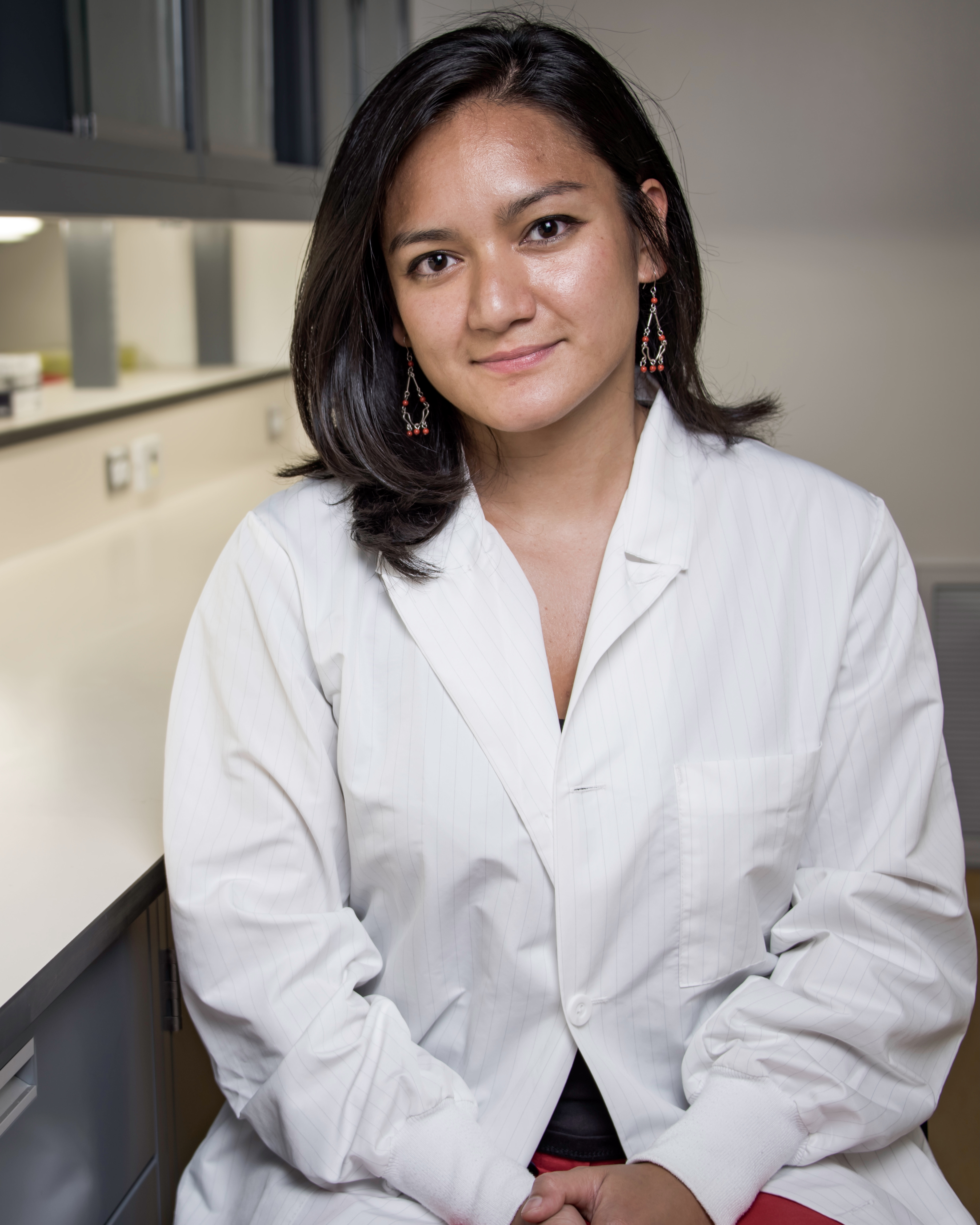 vi.m [at] me.com (Nguyen-Vi Mohamed)
vi.m [at] me.com (Nguyen-Vi Mohamed)
Post-Doctoral Fellow
"The iPSC unit at the Neuro is unique. I really wanted to work with human material coming from patients. That is the reason why I joined the platform."
"Le Neuro possède une unité unique de cellules souches pluripotentes induites. C'est cela qui m'a attirée à rejoindre le Neuro. Je souhaitais vraiment travailler avec du matériel de recherche directement issu des patients."
Read Nguyen-Vi's biography
Dr. Nguyen-Vi Mohamed did her Ph.D at University of Montreal, on tau pathology spreading in Alzheimer’s disease. Interested by the similarities that shared misfolded proteins in Alzheimer’s disease and Parkinson’s disease (PD), she joined Dr. Fon’s laboratory for her postdoc. She implemented the brain organoids technology at the Montreal Neurological Institute (The Neuro) in order to investigate the pathological mechanisms leading to the spreading of Parkinson’s disease within the brain.
Selected publications
- Mohamed N.V, Paula Lépine, Maria la Calle, Julien Sirois, Meghna Mathur, Wolfgang Reintsch, Lenore K. Beitel, Edward A. Fon, Thomas M. Durcan. (2021) Microfabricated disk technology: rapid scale up in midbrain organoid generation. In press in Methods. Preprint available: https://www.biorxiv.org/content/10.1101/2021.05.31.446446v1
- Imanbekova, Meruyert; Suarasan, Sorina; Rojalin, Tatu; Mizenko, Rachel; Hilt, Silvia; Mathur, Meghna; Lepine, Paula; Nicouleau, Michael; Mohamed, Nguyen-Vi; Durcan, Thomas; Carney, Randy; Voss, John; Wachsmann-Hogiu, Sebastian. (2021) Identification of amyloid beta in small extracellular vesicles via Raman spectroscopy. Nanoscale Advances journal. Doi : 10.1039/D1NA00330E
- Mohamed N.V, Julien Sirois, Janani Ramamurthy, Meghna Mathur, Paula Lepine, Eric Deneault, Gilles Maussion, Michael Nicouleau, Carol X.-Q. Chen, Narges Abdian, Vincent Soubannier, Eddie Cai, Harris Nami, Rhalena Thomas, Mahdieh Tabatabaei, Lenore K. Beitel, Jason Karamchandani, Tilo Kunath, Edward A. Fon, Thomas M. Durcan. (2021) Midbrain organoids with an SNCA gene triplication model key features of synucleinopathy. Brain Comm. Preprint available: https://www.biorxiv.org/content/10.1101/2021.04.12.439480v1
- Mohamed N.V, Meghna Mathur, Ronan V. Da Silva, Lenore K. Beitel, Edward A. Fon, Thomas M. Durcan. (2019) Generation of human midbrain organoids from induced pluripotent stem cells. MNI Open Science Journal. https://doi.org/10.17605/OSF.IO/GF39H
- Mohamed N.V, Larroquette F., et al. (2019) One step into the future: new iPSC tools to advance research in Parkinson’s disease and neurological disorders. Journal of Parkinson’s disease.
 barbara.morquette [at] mcgill.ca (Barbara Morquette)
barbara.morquette [at] mcgill.ca (Barbara Morquette)
Research Associate
"As far as I can remember, I have always been fascinated by the intricate beauty of the nervous system. The Neuro is an institution involving researchers and physicians working toward finding solutions to neurological diseases, and it aims to rapidly make new fundamental discoveries available to those who need them the most: patients. The Neuro is a place where I can continue doing what I love most: being part of an interdisciplinary team of experts, working with cutting-edge technologies, and contributing to translational research that will help shed light on neurological disease mechanisms, and ultimately, improve the health of patients."
Read Barbara's biography
Growing up in a medical environment, I became aware of health issues and of the necessity of new discoveries to continually improve our living conditions and those of our loved ones facing diseases. From this, the desire to pursue a career in basic research made its way. Originally from Haiti, I started my biomedical studies at the Université de Montréal. After my master’s degree in the field of osteoarthritis (OA), I pursued my PhD in Neuroscience at the CR-CHUM under the supervision of Dr. Adriana Di Polo. There, I studied the molecular mechanisms underlying morphological changes of acutely injured adult retinal neurons. Subsequently, I continued my research as a post-doctoral fellow at The Neuro in the lab of Dr. Alyson Fournier where I sought to understand the influence of the inflammation on neurodegeneration and axonal repair in Multiple Sclerosis. I am currently continuing my journey in neuroscience as a Research Associate at the EDDU. Here, I hope to contribute in deciphering the mechanisms underlying neurodevelopmental disorders by using cutting edge human-derived organoids (mini-brains).
Selected publications
- Morquette B*, Juźwik CA*, Drake SS, Charabati M, Zhang Y, Lécuyer MA, Galloway DA, Dumas A, de Faria Junior O, Paradis-Isler N, Bueno M, Rambaldi I, Zandee S, Moore C, Bar-Or A, Vallières L, Prat A, Fournier AE. MicroRNA-223 protects neurons from degeneration in experimental autoimmune encephalomyelitis. Brain. 2019 Oct 1;142(10):2979-2995. * co-first authors
- Girouard MP, Simas T, Hua L, Morquette B, Khazaei MR, Unsain N, Johnstone AD, Rambaldi I, Sanz RL, Di Raddo ME, Gamage KK, Yong Y, Willis DE, Verge VMK, Barker PA, Deppmann C, Fournier AE. Collapsing Response Mediator Protein 4 (CRMP4) Facilitates Wallerian Degeneration and Axon Regeneration following Sciatic Nerve Injury. eNeuro. 2020 Mar 2;7(2):ENEURO.0479-19.2020.
- Juźwik CA, Drake S, Lécuyer MA, Johnson RM, Morquette B, Zhang Y, Charabati M, Sagan SM4, Bar-Or A, Prat A, Fournier AE. Neuronal microRNA regulation in Experimental Autoimmune Encephalomyelitis. Sci Rep. 2018 Sep 7;8(1):13437
- Andrew Kaplan, Barbara Morquette, Antje Kroner, SooYuen Leong, Carolin Madwar, Sara L. Banerjee, Jack Antel, Nicolas Bisson, Samuel David, Alyson E. Fournier. Small molecule stabilization of 14-3-3 protein-protein interactions stimulate axon regeneration. Neuron. 2017 Mar 8;93(5):1082-1093
- Morquette B, Morquette P, Agostinone J, Feinstein E, McKinney AR, Kolta A, Di Polo A, (2015). REDD2-Mediated Inhibition of mTORC1 Promotes Dendrite Retraction Induced by Axonal Injury in Vivo. Cell death and differentiation (Nature publishing group) Apr;22 (4):612-25
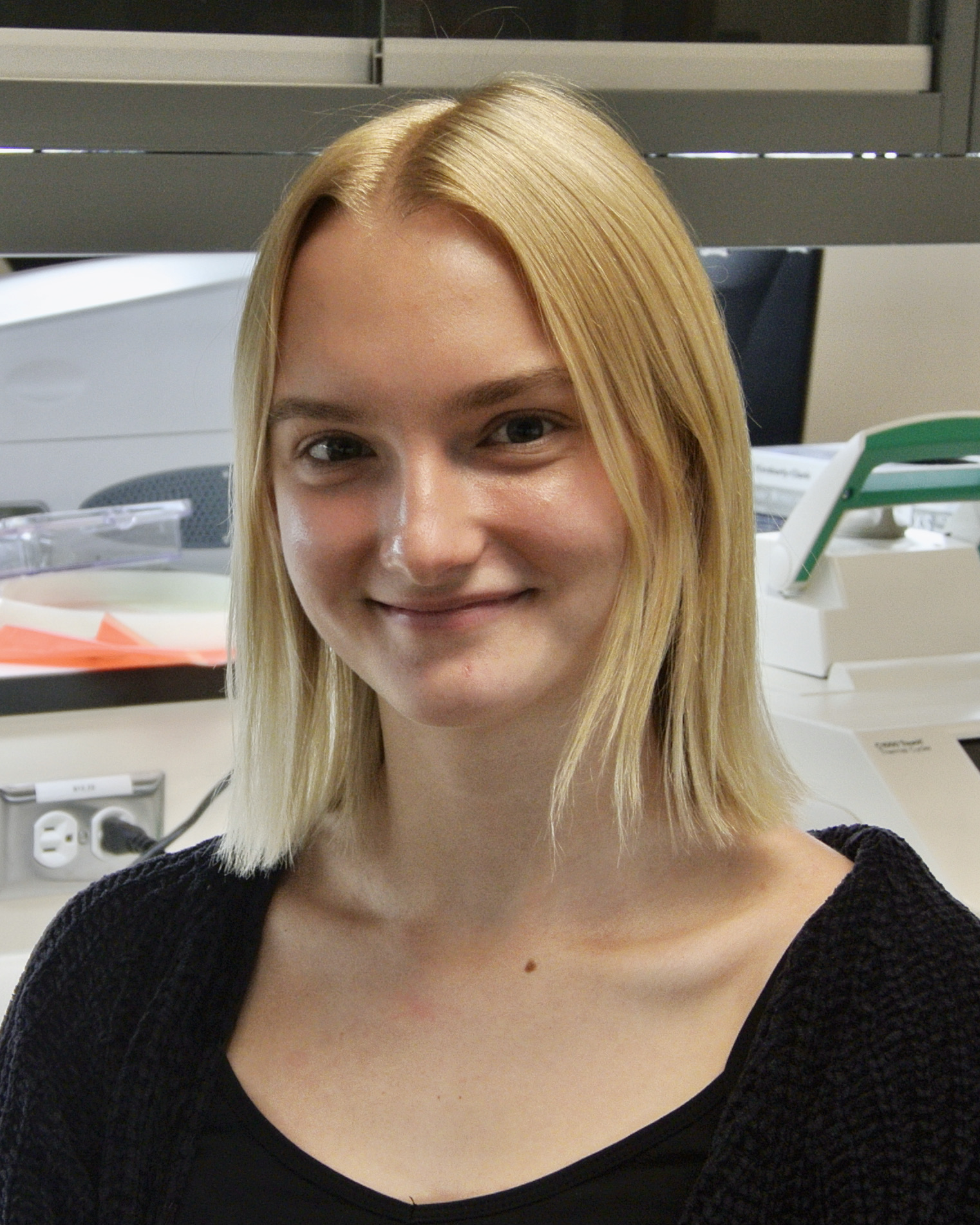 sophia.penner [at] mail.mcgill.ca (Sophia Penner)
sophia.penner [at] mail.mcgill.ca (Sophia Penner)
Projects Assistant: Outreach and Training
"Working at the Neuro's EDDU alongside so many brilliant scientists is a privilege. I am always learning new and exciting things about the brain, and I am grateful to my colleagues here for inviting me into the EDDU community."
View Sophia's Linkedin
Sophia's biography
I am originally from New Zealand, but have grown up in Toronto and moved to Montreal in 2019 to do my undergrad at McGill. I am majoring in Cognitive Science, which is the interdisciplinary field between neuroscience, psychology, philosophy, computer science and linguistics. I am fascinated by human cognition and I believe that integrating knowledge from all of these different fields will help me develop a deeper understanding of the mind. I started working at the EDDU in the summer of 2021 as an assistant on the Communications and Outreach team alongside my wonderful colleague Luisa Pimentel. I am in charge of managing the EDDU’s website, data portal, and our new collections of iPSC protocol videos on YouTube, as well as filming and editing content for the lab. My work helps to promote Open Science by making the EDDU’s research available online in many different languages so that researchers around the world can access it. I am lucky to be able to witness the amazing research being done at the EDDU, and I look forward to sharing more of it with the world! Besides working at the EDDU, I enjoy playing ultimate frisbee, camping, snowboarding, and spending time in Parc la Fontaine with a good book.
 luisa.pimentel [at] mail.mcgill.ca (Luisa Pimentel)
luisa.pimentel [at] mail.mcgill.ca (Luisa Pimentel)
Project Coordinator: Outreach and training programs
"I believe that the democratization of knowledge is an essential factor in accelerating the discovery of new treatments for neurological diseases in order to benefit the largest number of patients and contribute to international scientific progress."
"Eu acredito na democratização do conhecimento como um fator essencial para acelerar a descoberta de novos tratamentos para doenças neurológicas, a fim de beneficiar o maior número possível de pacientes e contribuir para o avanço científico internacional."
View Luisa's Linkedin
Read Luisa's biography
I am originally from Rio de Janeiro, Brazil, where I discovered the fascinating field of Neuroscience. I moved to Canada to continue my studies in Alzheimer's Disease and in my 10th year in Montréal, I joined the EDDU as a Research Assistant to work in the exciting fields of iPSCs and CRISPR gene editing. In April 2021, I took a new challenge: I became EDDU's Project Coordinator for Training and Outreach Programs. In my current role, I am responsible for creating content for training and outreach initiatives at the EDDU as well as organizing training and outreach events. We offer both open-science activities that are aimed towards iPSC researchers and also ones that are designed for the general public. Working at the EDDU means having access to cutting-edge technology while being part of a collaborative team that works to further the progress on Drug Discovery. As I am a firm believer in "giving back", it is a pleasure to be part of the Open Science initiative and to be building partnerships to benefit patients worldwide. I am also very happy to be collaborating with researchers in Brazil. I am excited to be part of the future advances in Neuroscience. In order to keep on track with my goals at the EDDU, I practice Yoga daily and I meditate almost every day.
Selected publications
- Maussion Gilles, Rocha Cecilia, Pimentel Luisa, Beitel Lenore and Durcan Thomas (2021) Human induced pluripotent stem cell-based studies; a new route toward modeling autism spectrum disorders. In book: iPSCs for Modeling Central Nervous System Disorders (pp.37-81), doi: 10.1016/B978-0-323-85764-2.00007-7
- Pimentel LS; Allard S; Weinreb O; Danik M; Hanzel CE; Youdim M and Cuello AC. (2015) The Multi-target Drug M30 Shows Pro-cognitive and Anti-inflammatory Effects in a Rat Model of Alzheimer's Disease. Journal of Alzheimer’s Disease.
- Hanzel CE; Pichet-Binette A; Pimentel LS; Iulita MF; Allard S; Ducantenzeiler A; Do Carmo S and Cuello AC (2014) Neuronal driven pre-plaque inflammation in a transgenic rat model of Alzheimer’s disease. Neurobiol Aging. doi:: 10.1016/j.neurobiolaging.2014.03.026.
- Castro NG; Costa RS; Pimentel LS; Danuello, A; Romeiro NC; Viegas-Junior C; Barreiro EJ; Fraga CAM; Bolzani VS; Rocha MS. (2008) CNS-selective noncompetitive cholinesterase inhibitors derived from the naturalpiperidine alkaloid (-)-spectaline. Eur J Pharmacol.
- Viegas-Junior C; Bolzani VS; Pimentel LS; Castro NG; Cabral RF; Costa RS; Rocha MS; Young MCM; Barreiro EJ; Fraga CAM. (2005) New Acetylcholinesterase Inhibitors Designed from Natural Piperidine Alkaloids. Bioorg Med Chem.
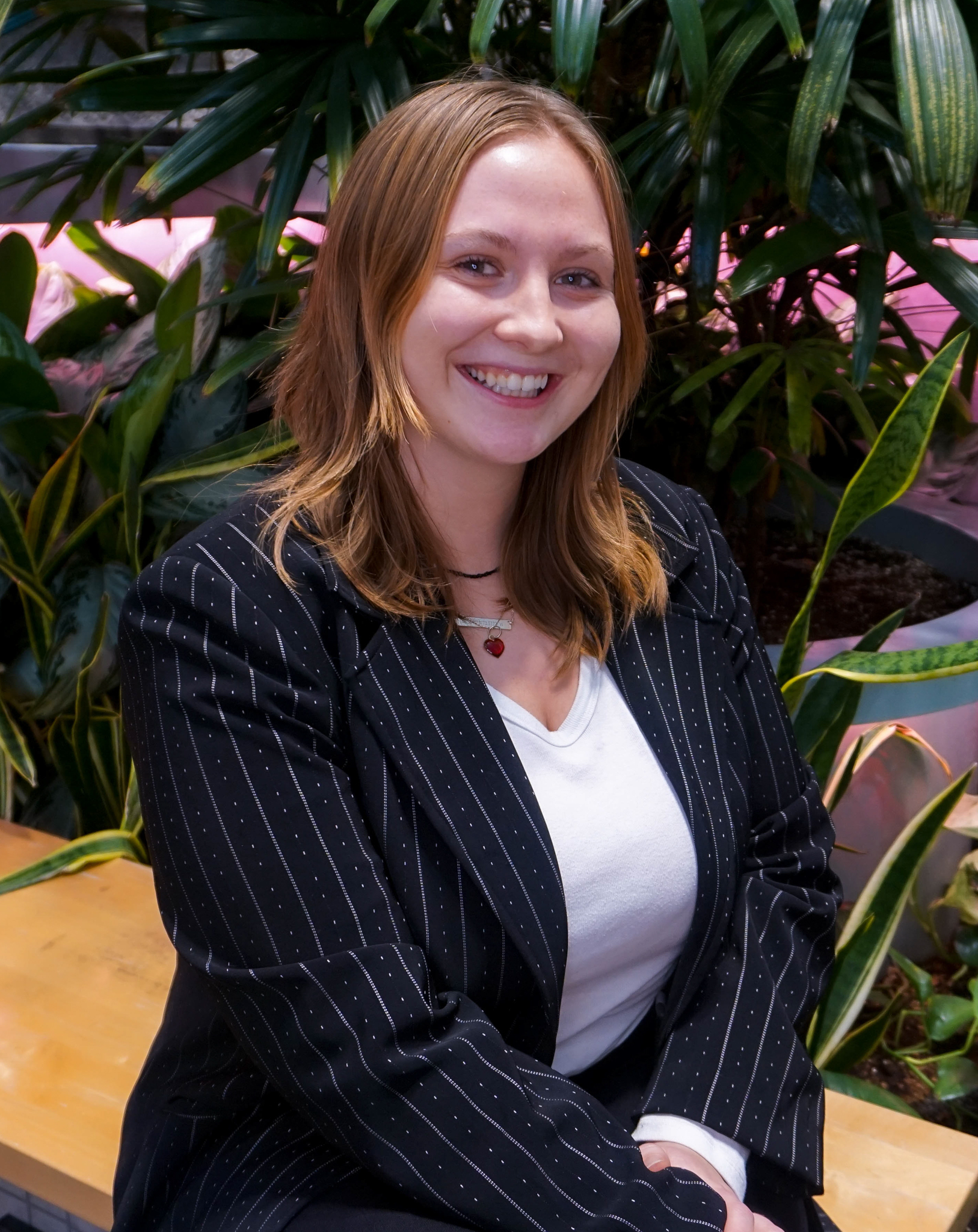 alexandria.schneider [at] mcgill.ca (Alexandria Schneider )
alexandria.schneider [at] mcgill.ca (Alexandria Schneider )
Research Assistant
"The brain continues to be one of the most elusive and exciting organs to study, and it has been a long-standing goal of mine to further our understanding of the brain and the diseases that threaten it. I am grateful to work at The Neuro where I am surrounded by scientists who have that same drive. Everyone at the EDDU is always learning ways to better their research through collaboration with our institution, its affiliates, and other academic and research centres. I am very proud to be a part of the community of hard-working researchers, physicians, and workers that make the Neuro the monumental research and treatment facility that it is."
"J’ai toujours été fasciné par les opportunités et les défis que représente la recherche en neurosciences, et je suis tres reconnaissante de travailler au Neuro ou je suis entourée de scientifiques qui ont le meme objetcif . Je suis tres fiere de faire partie de cette communauté de chercheurs qui font du Neuro une entité de recherche majeure oeuvrant pour la recherche et la découverte de traitement des maladies neurodégénératives.""
Read Alexandria's biography
I was born in Belleville, Ontario, and was eager to pursue science in a big city. I moved to Montreal to go to McGill and graduated with my undergraduate degree in Biochemistry in 2023. I joined the EDDU in the summer of 2022 as a trainee for the iPSC and CRISPR team. Since then, I have worked for the ALS team, as a lab helper, and most recently I am working in our new satellite lab at the IRCM (Institut de recherches cliniques de Montréal) where we are experimenting with developing other iPSC-derived tissues. The commitment that the EDDU has to Open Science is something that I am pleased to contribute to. This means that the research we are doing here is accessible to scientists globally, creating a collaborative network that has the improvement of patient outcomes as its priority.
Selected publications
- Transcriptome-based screening in TARDBP/TDP-43 knock-in motor neurons identifies the NEDD8-activating enzyme inhibitor MLN4924 Sarah Lépine, Gilles Maussion, Alexandria Schneider, Angela Nauleau-Javaudin, María José Castellanos-Montiel, Georgina Jiménez Ambriz, Dan Spiegelman, Narges Abdian, Anna Krystina Franco-Flores, Ghazal Haghi, Lale Gursu, Mathilde Chaineau, Thomas Martin Durcan bioRxiv 2024.01.30.578100; doi: https://doi.org/10.1101/2024.01.30.578100
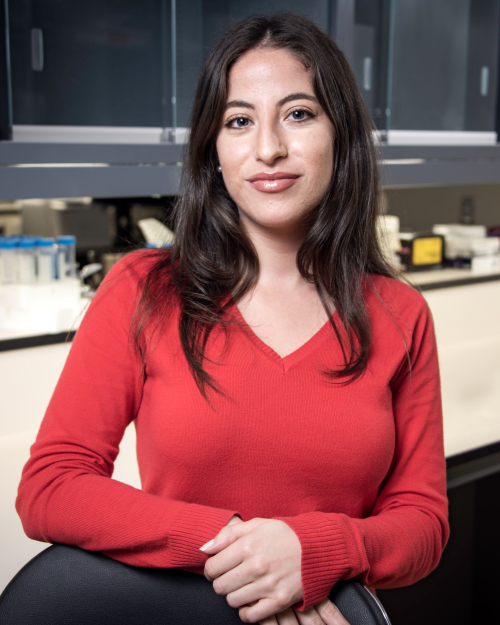 lorenza.villegas [at] mail.mcgill.ca (Lorenza Villegas)
lorenza.villegas [at] mail.mcgill.ca (Lorenza Villegas)
Research Assistant
"Diversity, knowledge, and modern methods of science are the things that make us grow as humans. I respect the individuality of human beings, and at The Neuro we apply these concepts to be able to progress with medicine in the constant search for a cure for neurological diseases, and to make the world a better place. That is what keeps me going."
"La diversidad, el conocimiento, y los métodos modernos de la ciencia son las cosas que nos hacen crecer como humanos. Yo respeto a la individualidad de los seres humanos, y en el Neuro aplicamos estos conceptos para poder progresar con la medicina en la búsqueda constante para una cura para las enfermedades neurológicas, y poder hacer el mundo un lugar mejor. Eso es lo que me hace seguir todos los días."
View Lorenza's Linkedin
Read Lorenza's biography
Originally from Bogota, Colombia, I am a U.S citizen with a bachelor’s degree in Psychology and Behavioral Neuroscience. I arrived in 2017 to McGill University’s Integrated Program of Neuroscience to obtain my master’s degree in neuroscience. I did my research thesis at the EDDU which involved using CRISPR/Cas9 technology on cell lines to understand the protein interaction of Spinocerebellar Ataxia Type 3 and its parkinsonian phenotype. Throughout my academic career, I’ve matured intellectually and learned more specific and complex biological concepts of the brain. I have now evolved into a research assistant carrying out the oversight of the laboratory’s reagents and contributing as a helping hand with labmate’s projects. I am proud to say I ma contributing to scientific progress and making an impact in the scientific community and the world.

